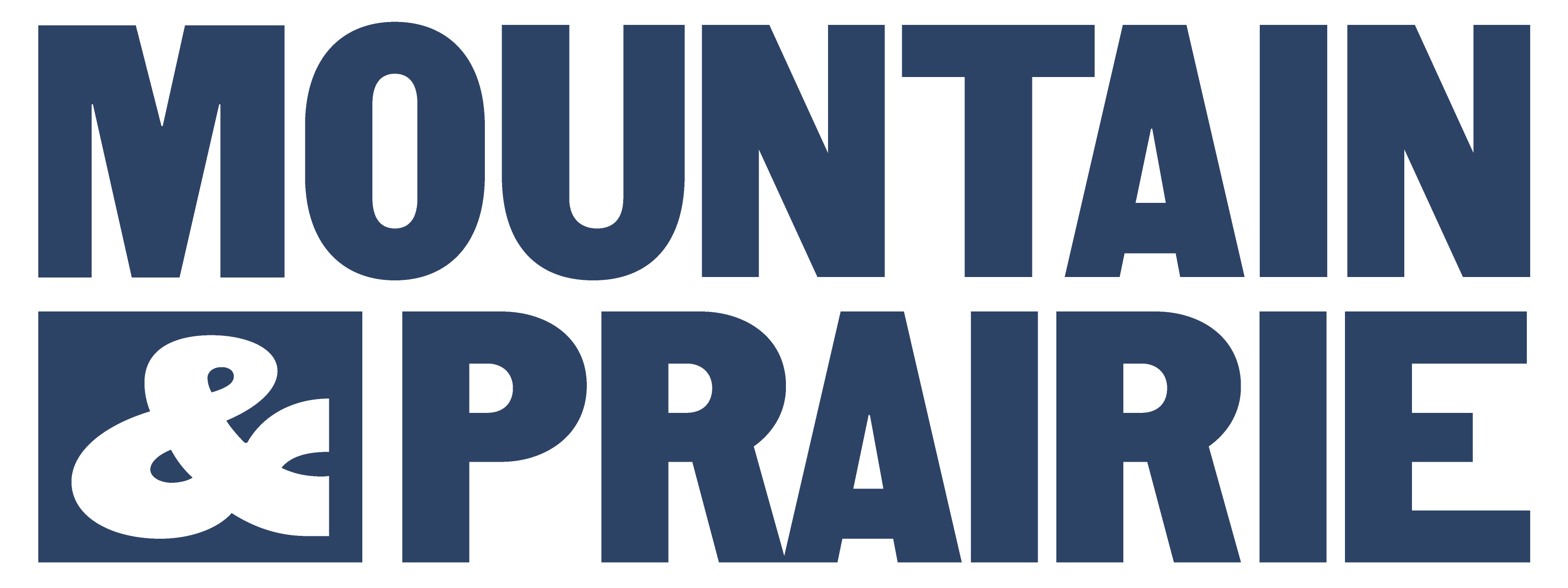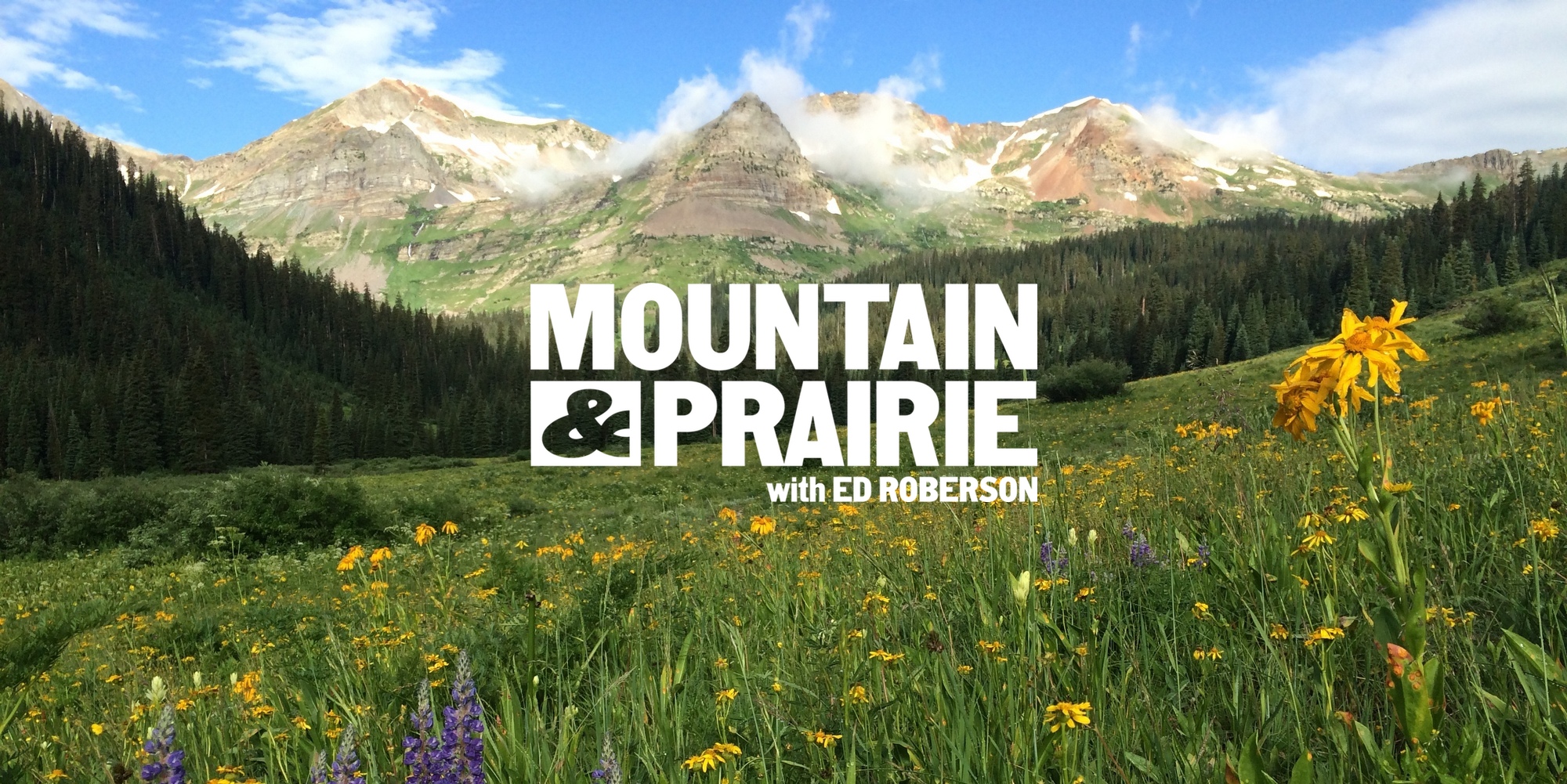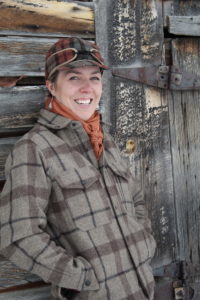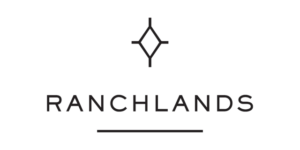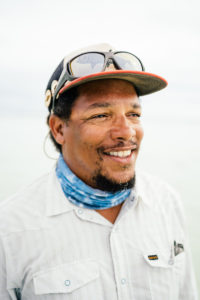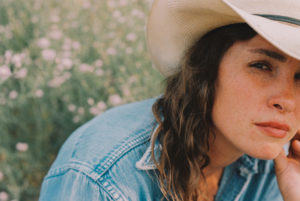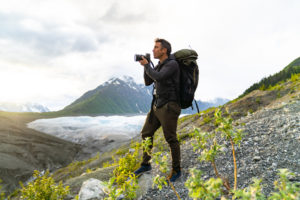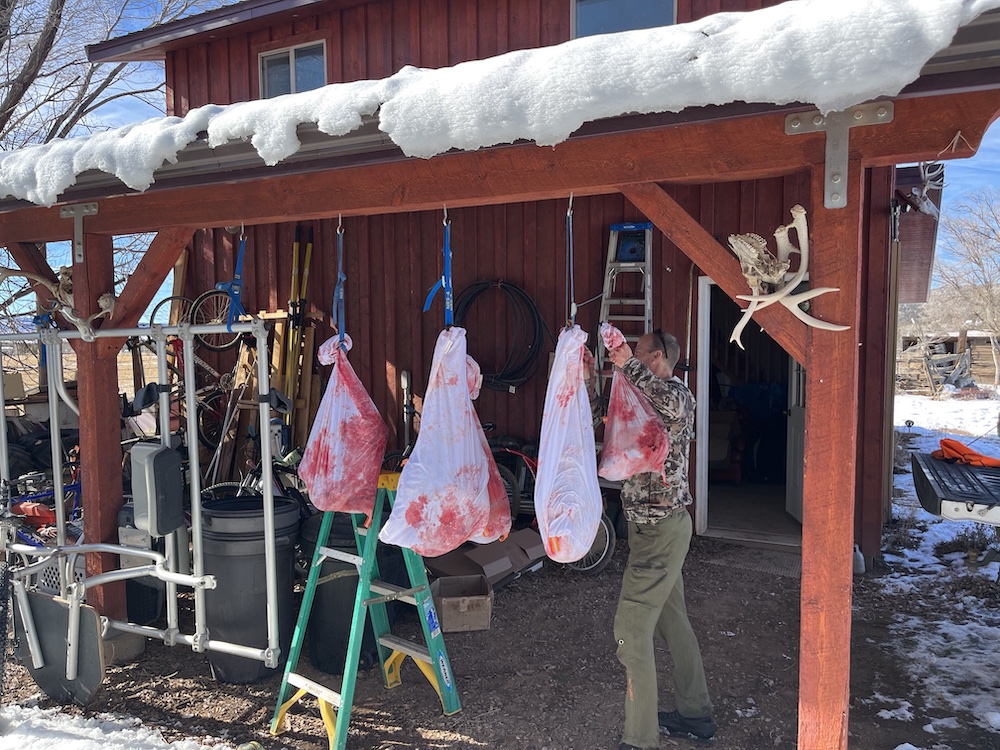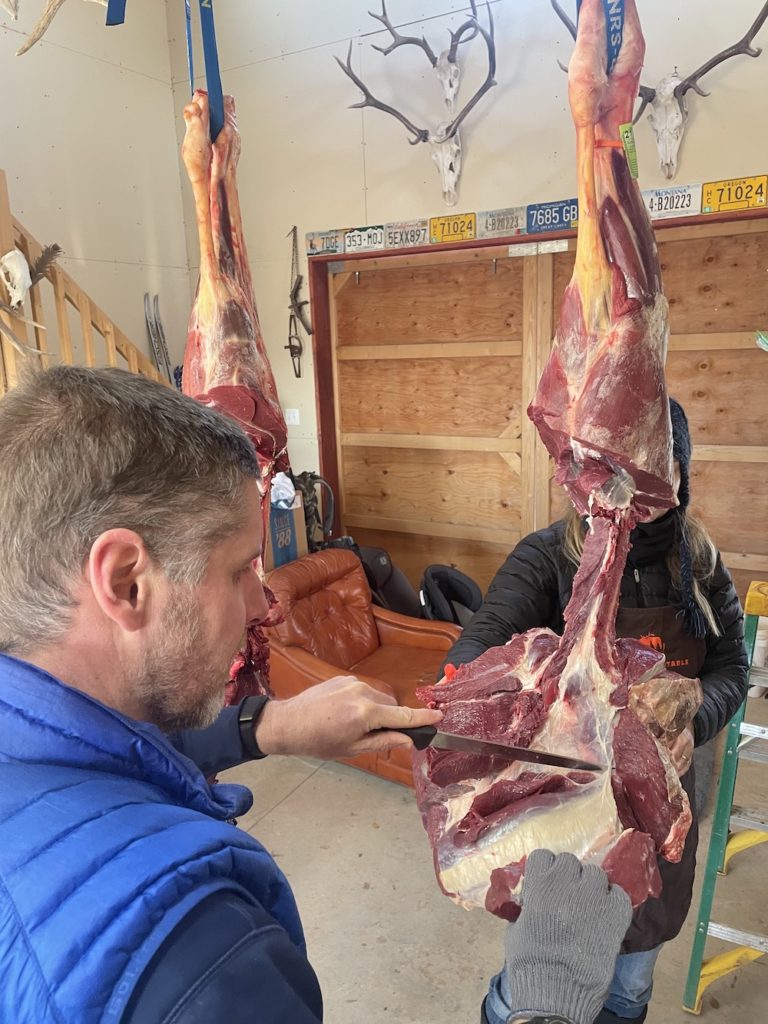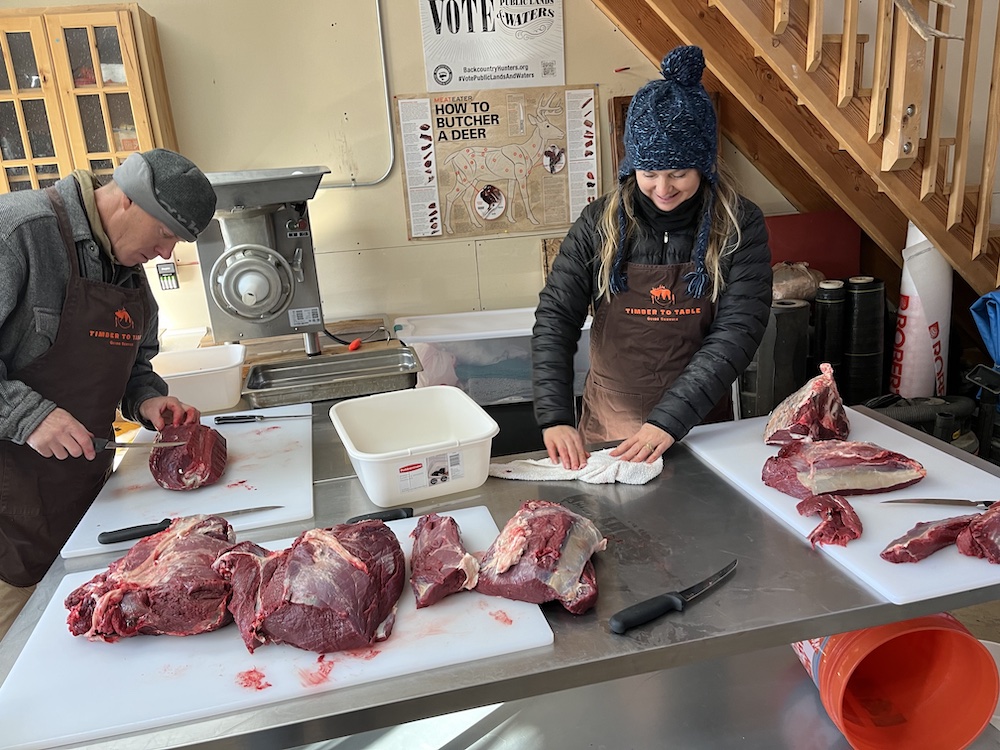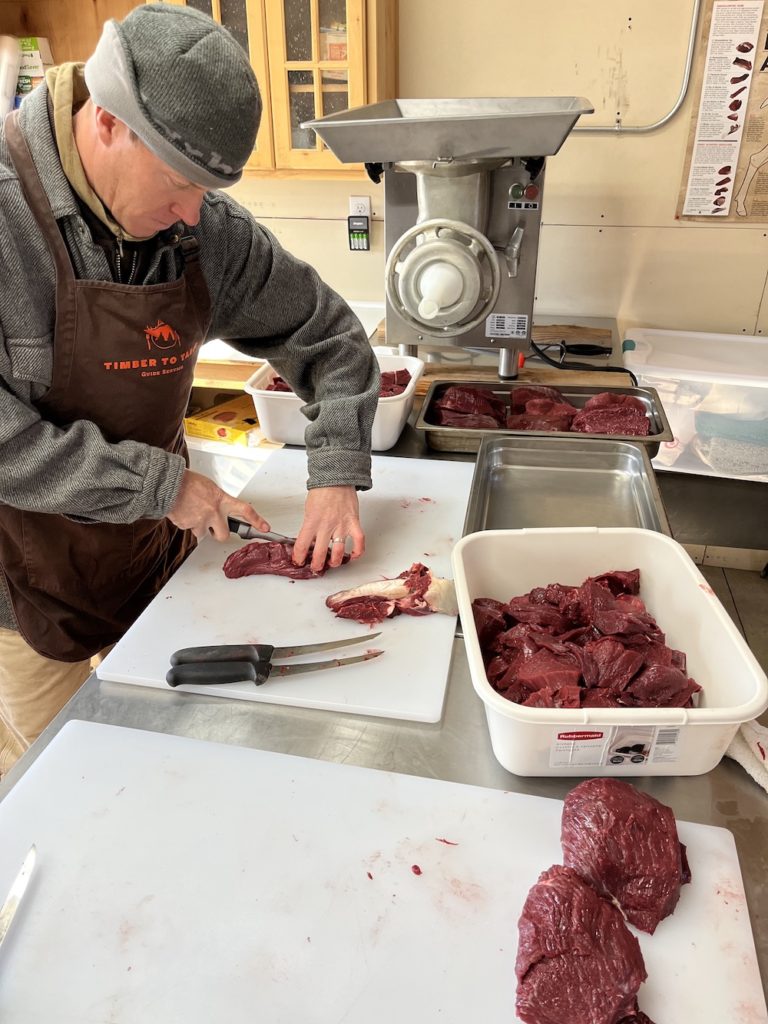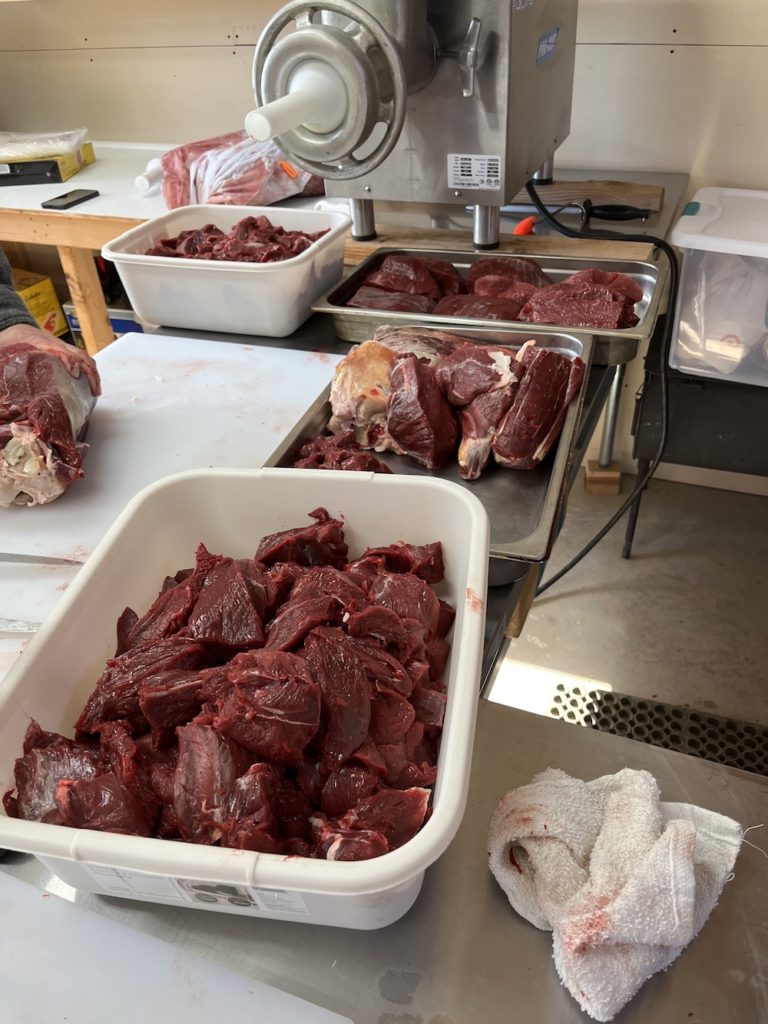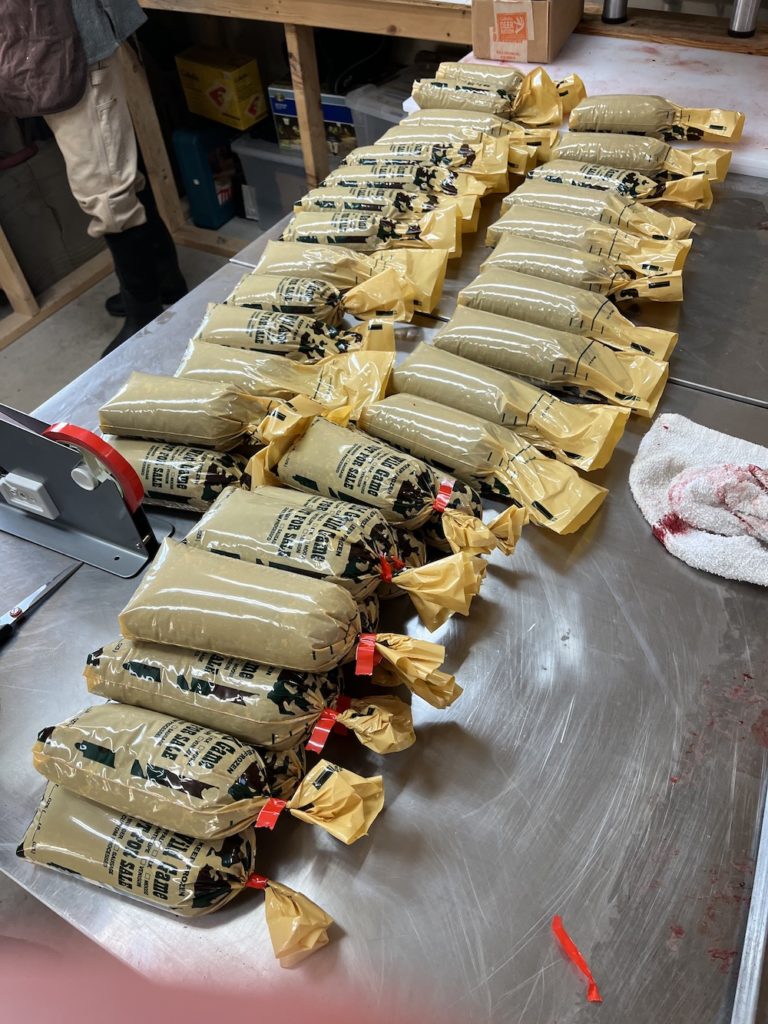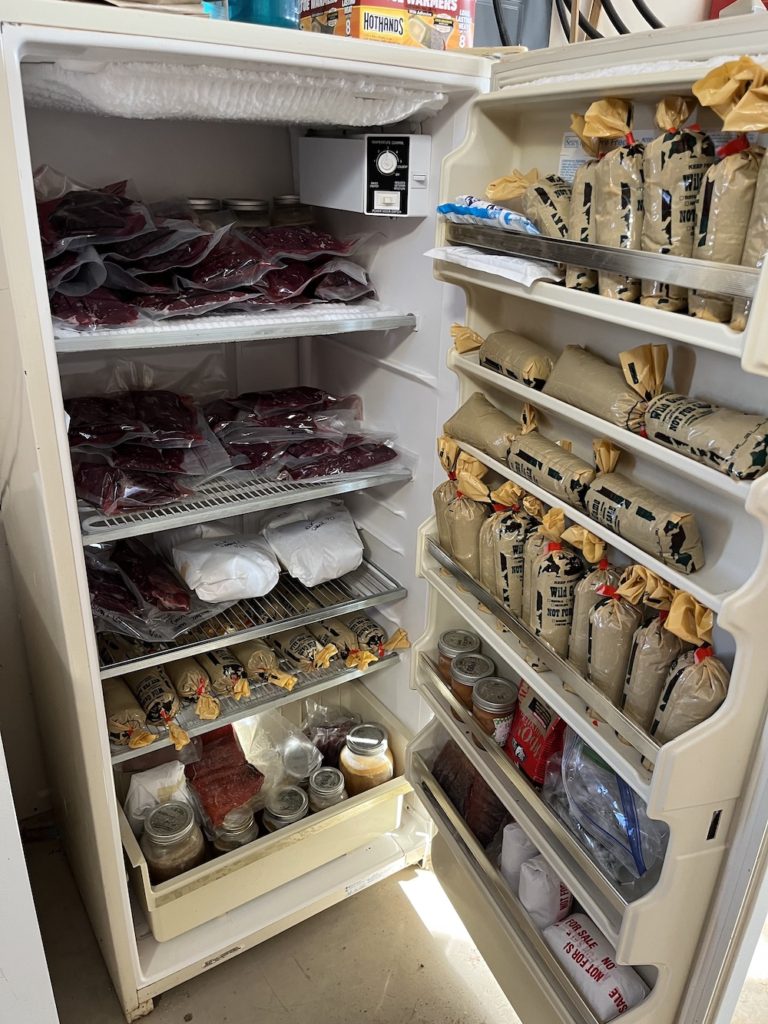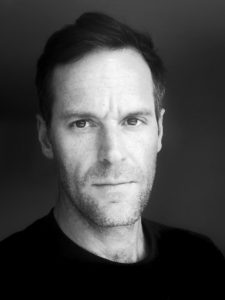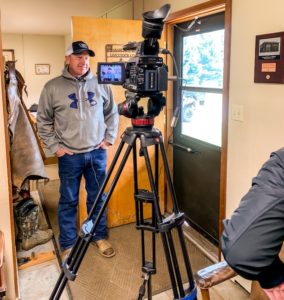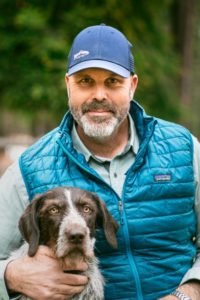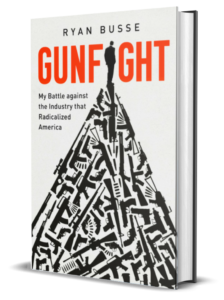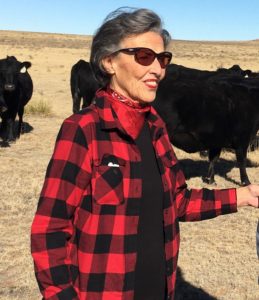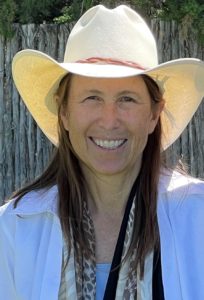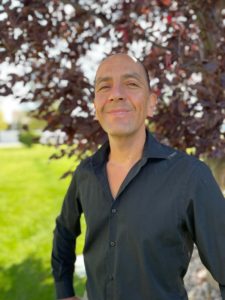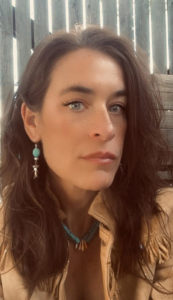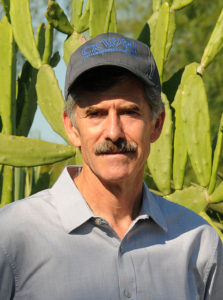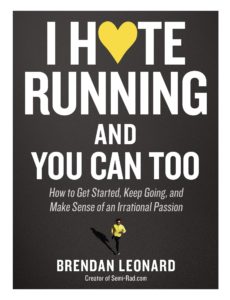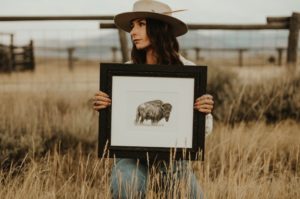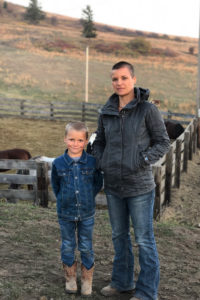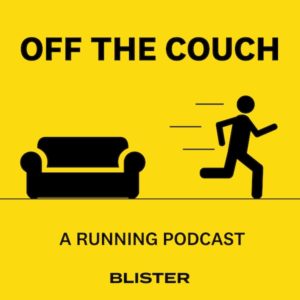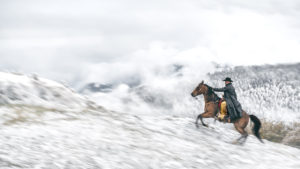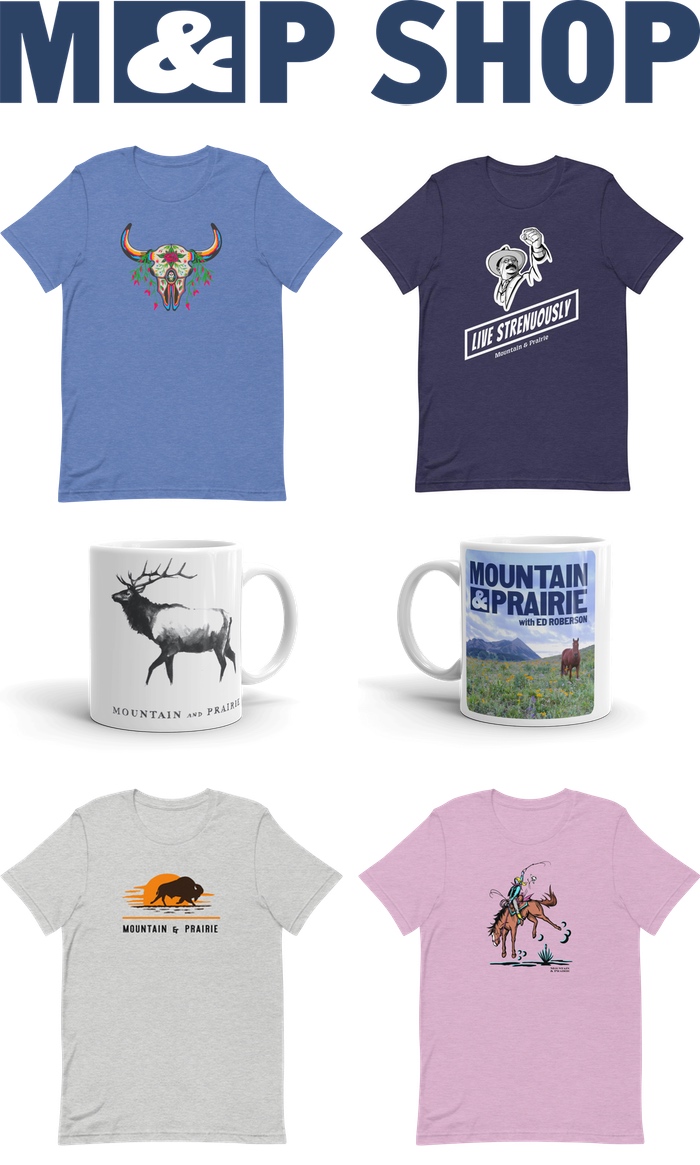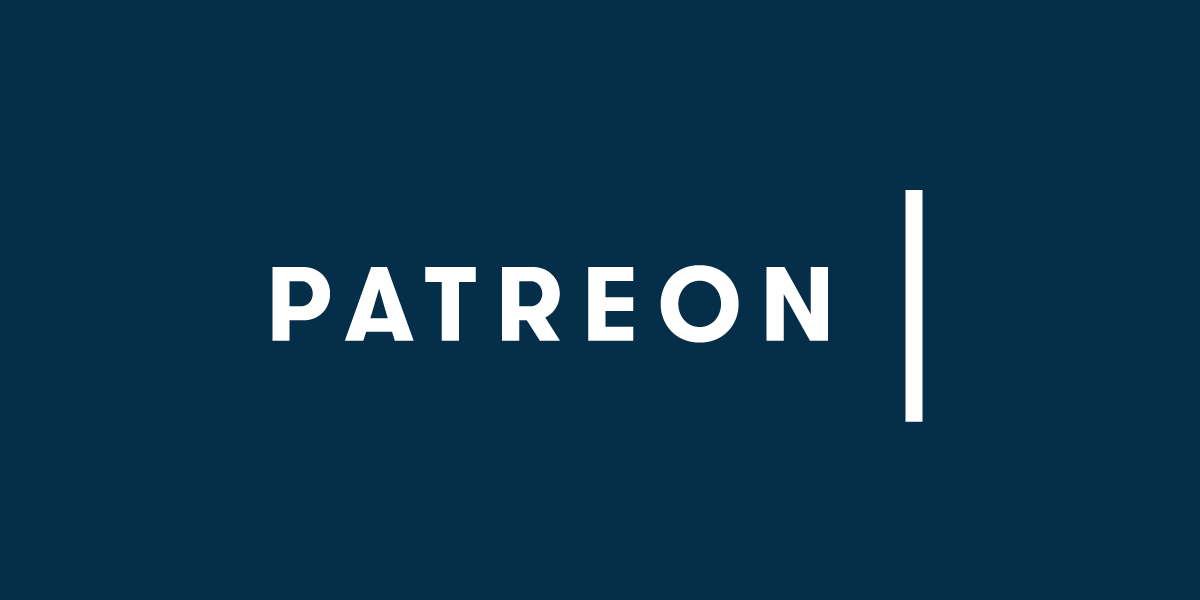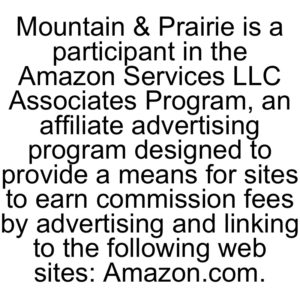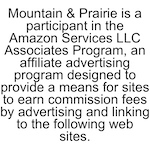Kate Mannix – A Legacy of Land Stewardship
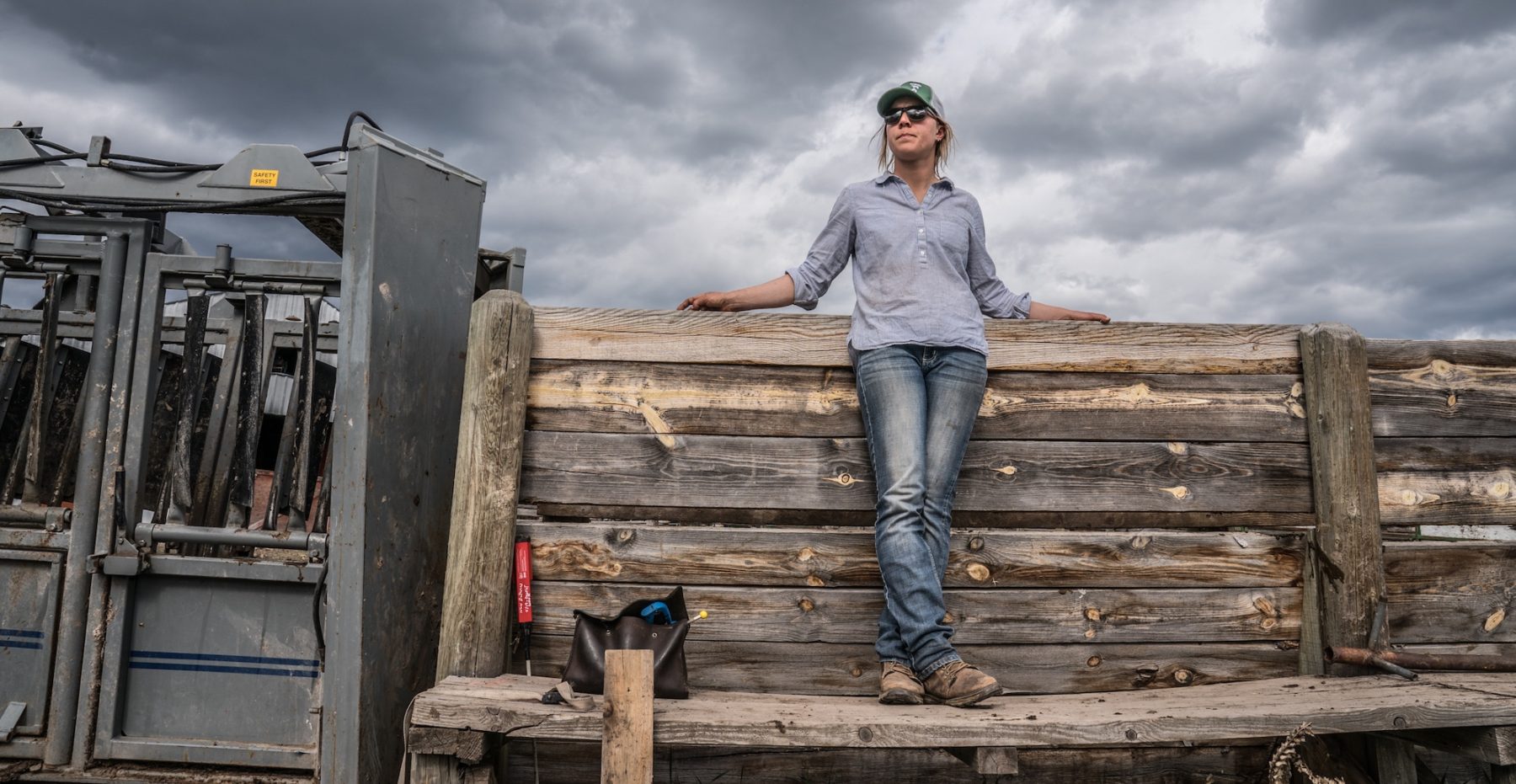
Kate Mannix is a rancher who works alongside her family on the Mannix Ranch in Montana’s Blackfoot Valley. The Mannix family has been ranching and stewarding their family ranch since 1882, back when Timothy Benjamin Mannix purchased the land from the Northern Pacific Railroad. For generations, the Mannix family has served as loyal caretakers of this spectacular landscape, and, over the years, they have evolved their business and land management approaches so as to continuously improve the ranch’s soil, water, flora, and fauna.
Kate was born and raised in California, but moved to Montana for graduate school, where she fell in love with both ranching and the Rocky Mountains. A few years later, she was accepted as an apprentice into the Quivira Coalition’s New Agrarian Program, a unique program that connects aspiring farmers and ranchers with experienced regenerative agriculture practitioners throughout the West. After a stint in New Mexico, she eventually found her way to the Mannix Ranch, where she fell in love with Bryan Mannix, who is now her husband. So today, Kate is officially a Mannix and is an invaluable part of this storied ranching family.
Kate and I connected virtually and chatted about everything from the business of ranching to her favorite books, with a lot of fascinating topics in between. We started out by discussing the history of the Mannix Ranch and how her family has managed to maintain such a successful family business for so many generations. We talk about challenges facing her ranch and the business of ranching, and the importance of land conservation and regenerative practices for the business’s sustainability. We talk about her time with Quivira, her stint as a vegan, her current love of hunting, and her family’s thoughts on her career path. She also shares some inspiring and instructive thoughts on her recent battle with cancer, and some of the lessons she learned from the scary, life-change experience. We discussed a lot, so please check out the episode notes for a full list of everything we covered.
I’ve wanted to have Kate on the podcast for quite some time now, so I greatly appreciate her making the time to chat. This was an educational and inspiring episode, so I hope you enjoy.
Photos courtesy of Kate Mannix
This episode is brought to you thanks to the generous support of Ranchlands.
Visit www.ranchlands.com to learn more about their top-notch vacations, leather goods and apparel, or to explore their excellent blog, the “Ranchlands Review.”
THANK YOU, Ranchlands!
—
Download on Apple Podcasts
—
Download on Spotify
—
Download on Google Podcasts
—
Download on Overcast
EPISODE NOTES
Topics Discussed:
- 5:10 – Kate walks us through the family genealogy related to the Mannix Ranch
- 7:40 – Kate describes the Mannix Ranch operations
- 9:40 – Kate explains why her family got involved in grass finishing their beef
- 14:10 – Kate talks about why she thinks the Mannix’s have been so successful in managing a multigenerational family business
- 18:00 – Kate describes some of the challenges she expects the ranch will face in the coming years
- 23:00 – Kate directs us to resources about the relationships between grazing, grasslands, and climate change
- 27:30 – Kate explains how she fell in love with ranching
- 35:30 – Kate talks about moving from her ranch work with Quivira in New Mexico to Mannix Ranch in Montana
- 39:00 – Kate discusses what her family thinks about her career path
- 40:00 – Kate explains why she stopped being a vegan
- 45:30 – Kate talks about when she started hunting
- 51:00 – Kate explains her connection with Red Ants Pants, a women’s workwear company
- 54:30 – Kate discusses cancer and chemotherapy
- 1:09:30 – Kate’s book recommendations
Information Referenced:
- Mannix Family and Ranch
- Rusty Sagebrush – Botanically Dyed Natural Textiles
- Blackfoot Valley
- Cow-calf operation
- Ranching For Profit School
- Bob Marshall Wilderness
- The Quivira Coalition
- Soil Carbon Cowboys
- Defending Beef, Nicolette Hahn Niman
- For the Love of Land, Jim Howell
- Jim Howell
- Daniela Ibarra-Howell
- Mescalero Apache
- Sacramento Mountains (New Mexico)
- Ranchlands
- Sieben Live Stock
- Cascade, MT
- Alexis Bonogofsky
- Quivira’s New Agrarian Program
- Regenerative agriculture
- Paleolithic diet
- Kate Kavanaugh
- Laird Hamilton
- Adam Gall
- Meat Eater, Steven Rinella
- Red Ants Pants
- Sarah Calhoun
- Girls Leadership Program, Red Ants Pants Foundation
- Phantom Ranch
- Between Two Kingdoms, Suleika Jaouad
- Pema Chödrön
- Black Lives Matter
- Lincoln’s Melancholy, Joshua Wolf Shenk
- Regarding Willingness, Tom Harpole
- Life on the Mississippi, Mark Twain
- Roughing It, Mark Twain
- Americanah, Chimamanda Ngozi Adichie
- Nnedi Okorafor
Enjoy this episode? Then you might like these too:
- Alexis Bonogofsky – Taking a Stand for the West
- Sarah Wentzel-Fisher – Conservation in the Radical Center
- Sarah King – Collaborative Conservation in the American Southwest
- Juanita Vero – A Deep Love of Place
- Heather Hansman – Demystifying Water in the West
- Kate Kavanaugh – Regeneration & Restoration
- Daniela Ibarra-Howell – Healing the Land Holistically
- Matt Pierson – Finding New Solutions for Food Insecurity
Visit the podcast page for a full list of episodes where you can filter episodes by topic and guests’ vocations.
Alvin Dedeaux – Living His Dream
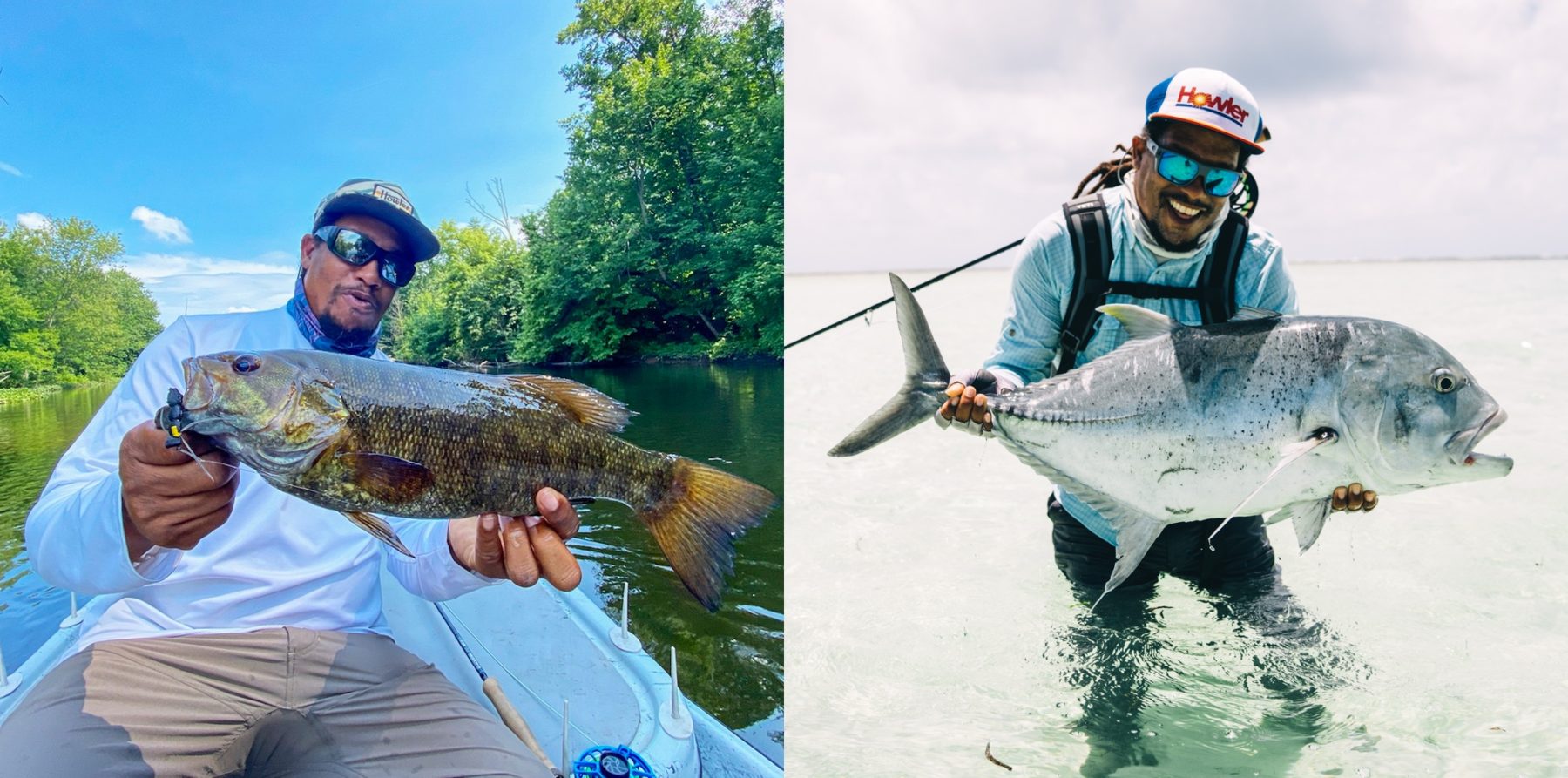
Alvin Dedeaux is a renowned Austin-based fly fishing guide who is one of the Lone Star State’s most sought-after experts in the pursuit of everything from Guadelupe Bass in Central Texas to Redfish on the Texas coast. Alvin is an ambassador for well-known brands such as Howler Brothers and Yeti, and he’s twice been a finalist for Orvis’s Guide of the Year award. And on top of all of that, Alvin produces informative and entertaining videos on his popular Youtube channel, where anglers of all experience levels can learn from Alvin’s decades of experience.
Alvin was born and raised in Houston, and he has been a committed fisherman, hunter, and all-around outdoorsman for as long as he can remember. At age 12, he began teaching himself to fly fish, and what started as a hobby quickly became one of the most important aspects of his life– a passion that remains the centerpiece of his personal and professional lives to this day. Alvin’s story has many fascinating chapters, and each one could be its own three-hour podcast episode– he’s owned a construction company, been a singer in a very successful touring band, worked at the world-famous Austin Angler, and is now the head guide and owner All Water Guides. With a background like that, it’s no surprise that Alvin has become one of the most well-known fly guides in the country.
Alvin and I connected virtually and had a fun hour-long conversation about all aspects of his life and career. We started out chatting about his upbringing in Texas, and how fly fishing has been a mainstay in his life throughout all its various stages. We talk about his decision to leave college to pursue life as an entrepreneur, and his path to becoming professionally involved in fishing. We discuss his formative years working at the Austin Angler, and how that particular shop started the careers of some of the country’s most well-respected guides. He offers excellent insights into finding one’s dream job, the importance of conservation in Texas, and how COVID has affected Texas’s valuable fishing resources. We also discuss his popular Youtube channel and why he devotes so much time and energy toward sharing his wisdom. And, as you’d expect, Alvin offers some excellent book and music recommendations.
I loved talking to Alvin, and felt like we only scratched the surface of his wildly unique life. Be sure to check on the episode notes for tons of links to everything we discussed. Hopefully we can do a part 2 at some point in the future, but, until then, enjoy this fun conversation with Alvin Dedeaux!
Photos courtesy of Alvin Dedeaux
—
Download on Apple Podcasts
—
Download on Spotify
—
Download on Google Podcasts
—
Download on Overcast
EPISODE NOTES
Topics Discussed:
- 4:00 – Alvin’s background and childhood
- 6:00 – Alvin discusses how fly fishing entered his life
- 8:00 – Alvin talks about his decision to leave college
- 16:00 – Alvin talks about his job at the Austin Angler, his first job in the fly fishing industry
- 23:15 – Alvin discusses how he began guiding in Colorado
- 27:45 – Alvin talks about how long it took for him to feel like he had a sustainable business going in the fly fishing industry
- 32:00 – Alvin explains why he became interested in the use of social media for his business
- 37:00 – Alvin talks about finding the one thing you’d “eat shit all day” for (aka dream jobs)
- 45:00 – Alvin explains how COVID-19 impacted his business and limited fishery resources
- 51:00 – Alvin gives advice for anybody to become more conservation minded
- 53:45 – Alvin talks about how he got connected with Howler Brothers
- 57:45 – Alvin’s book and music recommendations
Information Referenced:
- Alvin Dedeaux
- Sunfish
- Eagle Claw
- Fly rod weighting system
- Martin
- University of Texas
- Texas A&M
- Austin Angler
- JT Van Zandt
- Dave Mangum
- Jim Adams
- Mina Hemingway
- Ernest Hemingway
- Adams & Sons fly shop
- Bozeman Angler
- Simms
- Joe Robinson
- Dave and Emily Whitlock
- Zap-a-gap
- Texas Hill Country
- Mike Thompson
- Yvon Chouindard
- Vermillion Brothers
- Taimen fish (Mongolia)
- Kamchatka, Russia
- Vail, CO
- Bill Perry
- Fly Fishing Outfitters
- Orvis
- Beaver Creek, CO
- Texas Parks and Wildlife Foundation
- Jay Kleberg
- Rick Wittenbraker
- Howler Brothers
- Yeti
- Banning Collins
- Empire of the Summer Moon by S. C. Gwynne
- John Adams by David McCullough
- Benjamin Franklin by Walter Isaacson
- Blood and Thunder by Hampton Sides
- Slayer
- Metallica
- Soundgarden
- Snoop Dogg
- Bob Marley
Enjoy this episode? Then you might like these too:
- Reflections On My First Elk Hunt, with Adam Gall
- Matt Barber & Joel Doub, Part 2 – Tales from an Entrepreneurial Adventure
- Monte Burke – Exploring Obsession
- Callan Wink – A New Voice for the New West
- Hal Herring – A Man of Words & Wild Places
- Mark Kenyon – A Passion for Public Lands
- Chris Dombrowski – Words, Water & the West
- Hampton Sides – Live at the Aspen Institute
Visit the podcast page for a full list of episodes where you can filter episodes by topic and guests’ vocations.
Riddy Arman – Artistic Authenticity
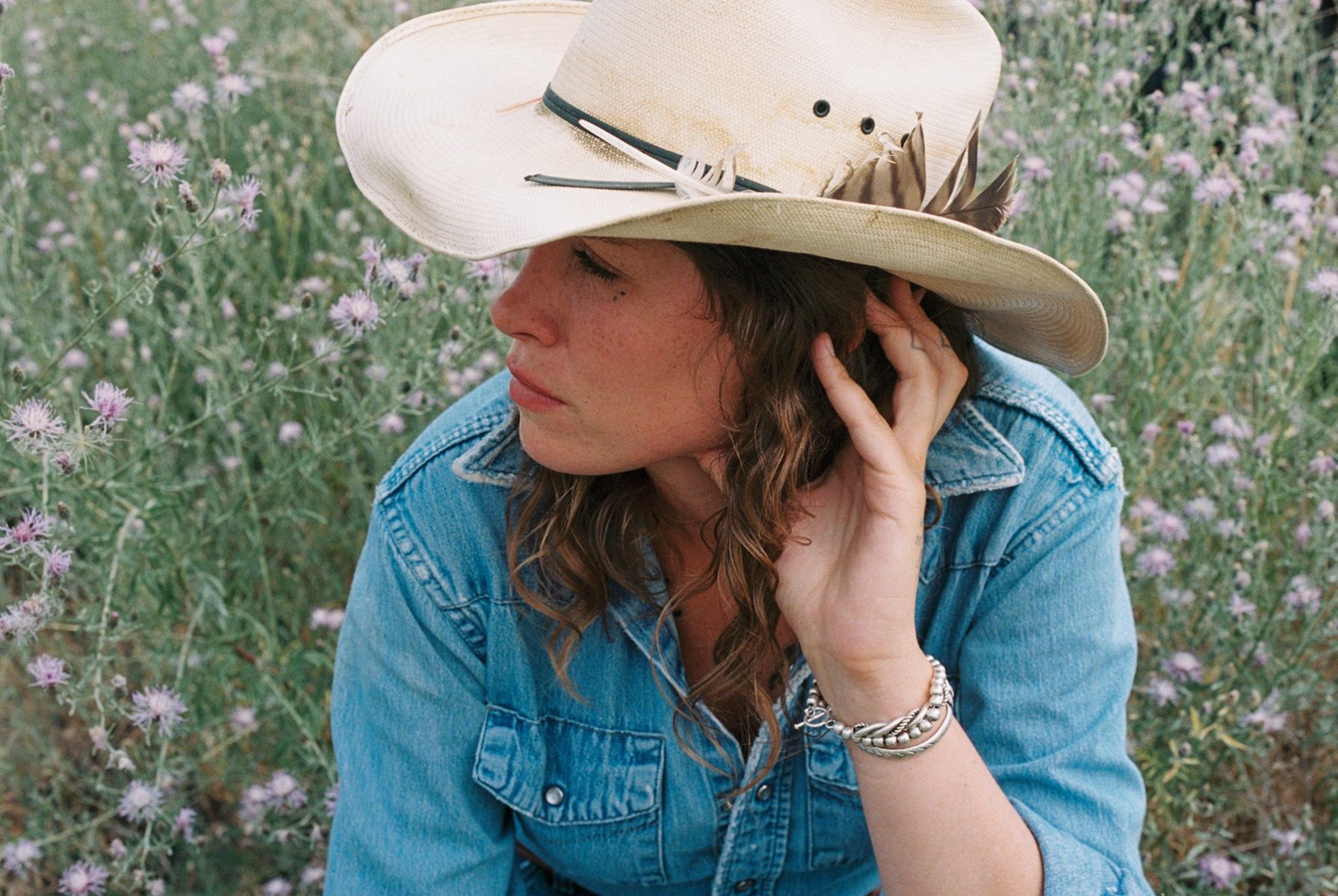
Riddy Arman is a singer-songwriter who lives in Montana’s Mission Valley, a rural agricultural community in the state’s northwestern corner. Riddy’s self-titled debut album was released in 2021 and has received praise from renowned institutions such as Rolling Stone, as well as from many highly respected fellow musicians, including Colter Wall. Riddy and her music are highly influenced by the wide-open spaces of Montana, and she brings a deep level of authenticity and emotion to all aspects of her craft– from the lyrics, to the melodies, to her live performances.
Born and raised in Ohio, Riddy left home after high school and began a long, winding, and interesting journey that took her to North Carolina for a year of college, to New York City where she worked as a model, and on an extended hitchhiking and train-hopping journey around the United States, just to name a few. She began writing and playing music in earnest while living on a farm in rural Virginia and eventually moved to Montana, a place she had long felt drawn toward. After a lot of hard work, creative experimentation, and determination, Riddy has figured out how to cultivate a successful music career far from the hustle and bustle of Nashville and deeply connected to the Montana landscapes that she loves.
Riddy and I connected earlier this week and had a fascinating conversion about everything from her winding career path to her current success in the music business. We started out talking about her childhood in Ohio and how she unexpectedly ended up in New York City working as a model. We discussed some of her craziest experiences from traveling around the United States and when and why she decided to get serious about music. She talks about her commitment to be authentic, how she manages to stay calm, even when she’s extremely nervous, and how she has managed to build a music career so far away from Nashville. We discuss the value of quiet time, mindfulness, the importance of mentors, favorite books, and much more.
Be sure to check out the episode notes for links to everything we discuss. Hope you enjoy.
Photos by Elisabeth Kokesh
This episode is brought to you thanks to the generous support of Ranchlands.
Visit www.ranchlands.com to learn more about their top-notch vacations, leather goods and apparel, or to explore their excellent blog, the “Ranchlands Review.”
THANK YOU, Ranchlands!
—
Download on Apple Podcasts
—
Download on Spotify
—
Download on Google Podcasts
—
Download on Overcast
EPISODE NOTES
Topics Discussed:
- 5:30 – Where Riddy grew up
- 7:50 – Riddy’s connection to agriculture
- 10:15 – Dropping out of college
- 12:30 – Moving to New York City and modeling
- 16:00 – Music and writing while in NYC
- 17:15 – Decision to leave NYC
- 19:00 – Traveling, riding trains, hitchhiking
- 20:30 – Raised to be independent
- 23:00 – Lessons learned from the adventures of traveling
- 27:00 – Moving to Virginia, focusing on agriculture
- 29:00 – Settling down, connecting with the land
- 32:45 – Finding value in quiet time
- 34:15 – Sticking with music for good
- 35:30 – Riddy’s writing process
- 37:45 – Transition to performing
- 40:45 – Dealing with nervousness
- 44:00 – Breathing and other ways to calm down
- 47:15 – Riddy’s deep connection with Montana
- 51:30 – Building a music career from rural Montana
- 56:30 – Process of being authentic and putting herself out there
- 58:30 – Artists that Riddy admires
- 1:01:45 – Advice for creatives
- 1:03:50 – Favorite books
Information Referenced:
- Riddy Arman
- Maumee, Ohio
- Warren Wilson College
- Swannanoa, NC
- Chris Douglas episode
- Freedom by Sebastian Junger
- Ranchlands Review article by Anna LoPinto
- Wim Hof
- What Doesn’t Kill Us by Scott Carney
- Mission Valley, Montana
- Chris Acker
- La Honda Records
- Gillian Welch
- Avett Brothers
- Toa of Equus by Linda Kohanov
- Ranier Maria Rocka
Enjoy this episode? Then you might like these too:
- Shane Doyle – Reverence for the Past, Hope for the Future
- Antonia Malchik – Exploring Culture & Complexity
- Nickolas Butler – The Craft of Creativity
- Kelsey Johnson – Chasing Her Artistic Ambitions
- Iris Gardner – Living with Intention
- Live in Bozeman!
- Jessica Ilalaole – Creating Home in the High Desert
- Morgan Irons – Finding Her Muse
Visit the podcast page for a full list of episodes where you can filter episodes by topic and guests’ vocations.
Yemi Mobolade – Community Builder
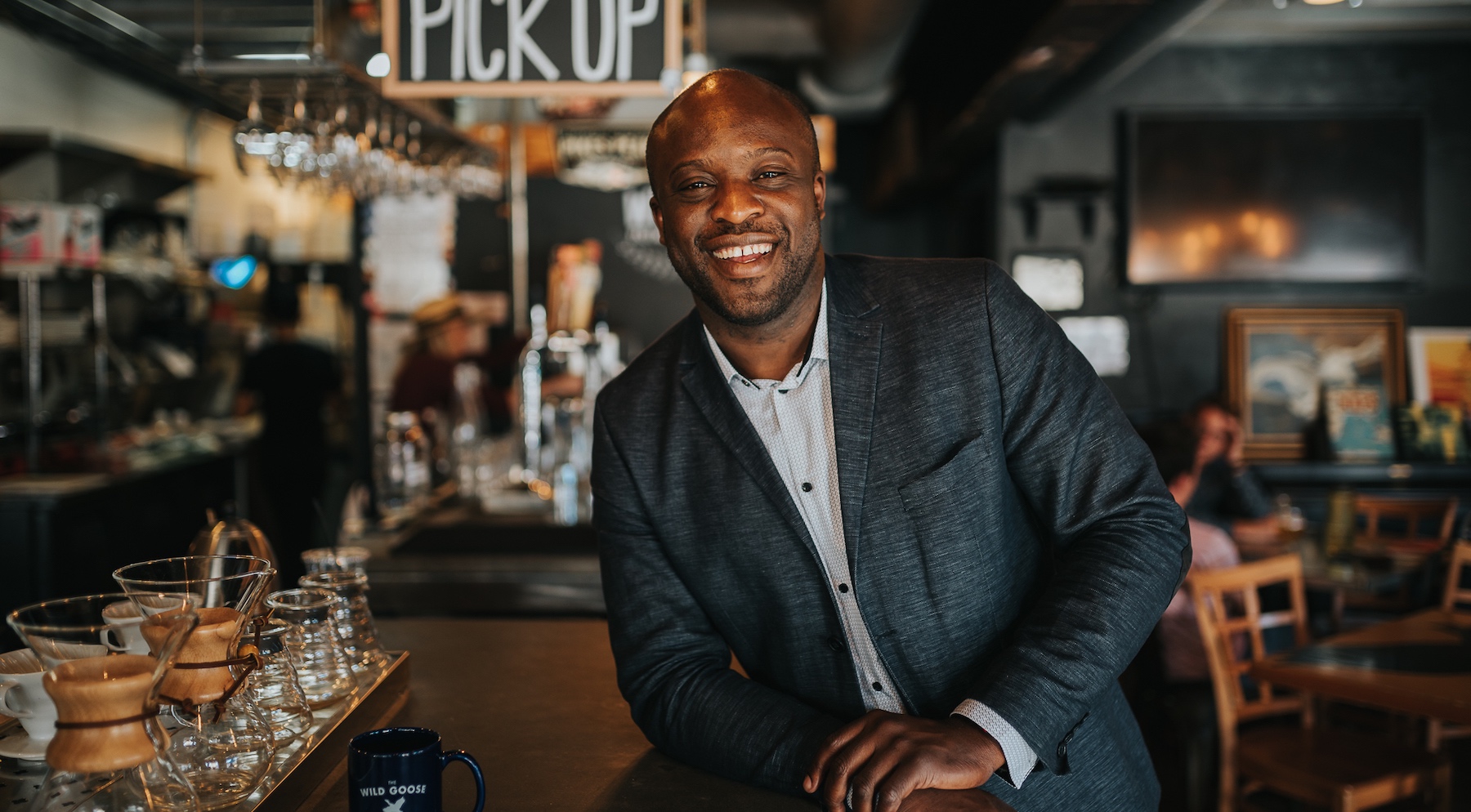
Yemi Mobolade is an entrepreneur, public servant, and community leader who devotes his seemingly limitless energy toward the betterment of Colorado Springs, Colorado. Born and raised in Nigeria, Yemi immigrated to the United States for college and eventually landed in Colorado Springs, where he has fully devoted himself to serving the community. He’s a co-founder and partner in two wildly successful restaurants, he’s served in various capacities within the city’s government and economic development arms, and he’s deeply involved in numerous non-profit organizations. On top of all of that, he’s a devoted husband and father of three beautiful children.
Yemi and I are neighbors, and our kids have been classmates and buddies for several years– so I’ve had the opportunity to personally interact with him in a variety of settings over a long period of time. Ever since first meeting Yemi, I have been extremely impressed with his positivity, leadership skills, and deep commitment to our community. Whether he’s touting the economic upside of doing business in Colorado Springs or figuring out creative solutions for his restaurants to thrive in the pandemic, I’ve always been intrigued by Yemi– everything from his personal backstory to why he is so obsessed with community building. So I was happy to finally sit down with him to discuss all of this.
We met up at his office on a Sunday afternoon for an inspiring conversation about everything from his early days in Nigeria to his upcoming plans to run for mayor of Colorado Springs. We start out discussing his move to the United States from Nigeria, and he talks about his perceptions of America from the outside looking in. We talk about his education, his commitment to his faith, and how he spent parts of his early career starting churches in various parts of the United States. We discuss his deep love for the city of Colorado Springs, and why he has decided to throw his hat in the ring for mayor. We discuss his heroes, his favorite books on leadership, and how his wife and children positively influence his desire to serve.
I really appreciate Yemi taking the time to chat, and I greatly appreciate his commitment to serving our community. There are lots of important lessons to be learned from Yemi, so I hope you enjoy.
Photos courtesy of Yemi Mobolade
—
Download on Apple Podcasts
—
Download on Spotify
—
Download on Google Podcasts
—
Download on Overcast
EPISODE NOTES
Topics Discussed:
- 4:45 – Yemi’s childhood in Nigeria
- 11:45 – What it was like when Yemi came to the US.
- 13:15 – Yemi’s journey of self-discovery
- 18:15 – How Yemi ended up in Colorado Springs
- 13:30 – Why Yemi appreciates and builds community
- 25:30 – Yemi’s political plans
- 31:45 – How Yemi plans to maintain his ideals within politics
- 35:00 – Yemi’s goals for the growth of Colorado Springs
- 39:00 – The impact of Yemi’s children on his life
- 44:15 – Leaders that Yemi admires
- 56:30 – Yemi’s book recommendations
Information Referenced:
- Lagos, Nigeria
- South Bend, Indiana
- Christian Missionary Alliance
- Good Neighbors Meeting House
- The Wild Goose Meeting House
- COS I Love You
- El Pomar Foundation Fellowship
- Abraham Lincoln
- Doris Kearns Goodwin
- Joshua Wolf Shenk
- Theodore Roosevelt
- Sebastian Junger
- Adam Grant
- Delia Owens
- J.K. Rolling
Enjoy this episode? Then you might like these too:
- Shane Doyle – Reverence for the Past, Hope for the Future
- Matt Pierson – Finding New Solutions for Food Insecurity
- Juanita Vero, Part 2 – A Deep Desire to Serve
- James Decker – Inspired Leadership for the New West
- Gabe Vasquez – Advocate for Equity in the Outdoors
- Becky Edwards – Amplifying the Power of Women in the West
- Jason Gardner – A Life of Purpose & Service
Visit the podcast page for a full list of episodes where you can filter episodes by topic and guests’ vocations.
Chris Burkard, Part 2 – Seeking Beauty Through Adventure
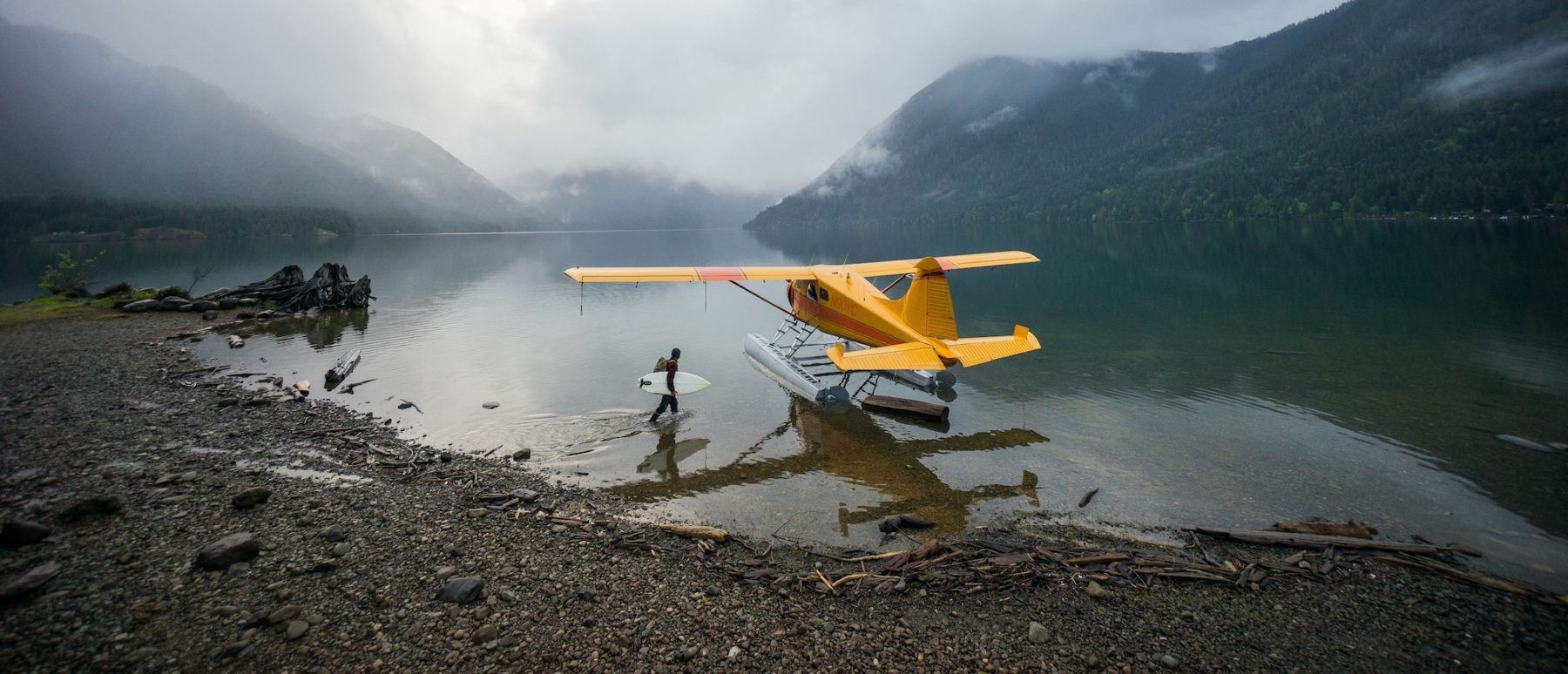
Chris Burkard is a prolific photographer, filmmaker, and author who is known for diving headfirst into epic adventures, documenting them with his camera, and producing one-of-kind stories that resonate deeply with millions of people around the world. He’s bikepacked across Iceland in winter, scouted cold-water surf breaks in British Columbia, and explored some of the lesser-known corners of the American West—just to name a few. In all his work, Chris combines his abundant positive energy with curiosity and authenticity, which has earned him the admiration of fellow accomplished artists, well-known brands, and nearly four million Instagram followers.
Earlier this week, Chris released his newest book titled Wayward– a collection of some of his best and never-before-seen photographs from some of the wildest places on earth. Wayward also features extensive written stories that detail his fascinating career path and the challenges, mistakes, and adventures that made him the artist he is today. I was lucky enough to receive an advanced copy of the book, and I read it in one sitting and thoroughly enjoyed it. The photographs are obviously stunning, but what I really appreciated was Chris’s willingness to share the many lessons he’s learned along his professional journey– lessons that I (and maybe you) can apply to your own creative endeavors.
If you’ve been listening to Mountain & Prairie for the past few years, then you surely remember my first conversation with Chris during the first few weeks of the pandemic. I was thrilled to have Chris join me again, this time for an inspiring conversation about Wayward, creativity, adventure, fatherhood, and more. We talked about what he’s learned during the pandemic, the process of writing Wayward, and why, in this high-tech world, he remains committed to publishing physical books. We discuss the importance of being yourself, how he overcomes self-doubt, and who he trusts to give him honest feedback. Chris also talks about how he evaluates risk, discusses how working with Patagonia helped him to find his voice as a photographer, explains his passion for sharing his experiences with others, and much more. Be sure to check the episode notes for a full list of everything we discuss and links to all the information.
A huge thanks to Chris for making the time to chat with me again, especially during such a busy travel schedule. And whether you’re interested in beautiful photos or learning lessons from an accomplished creative, I encourage you to check out Wayward.
Thanks for listening. Hope you enjoy.
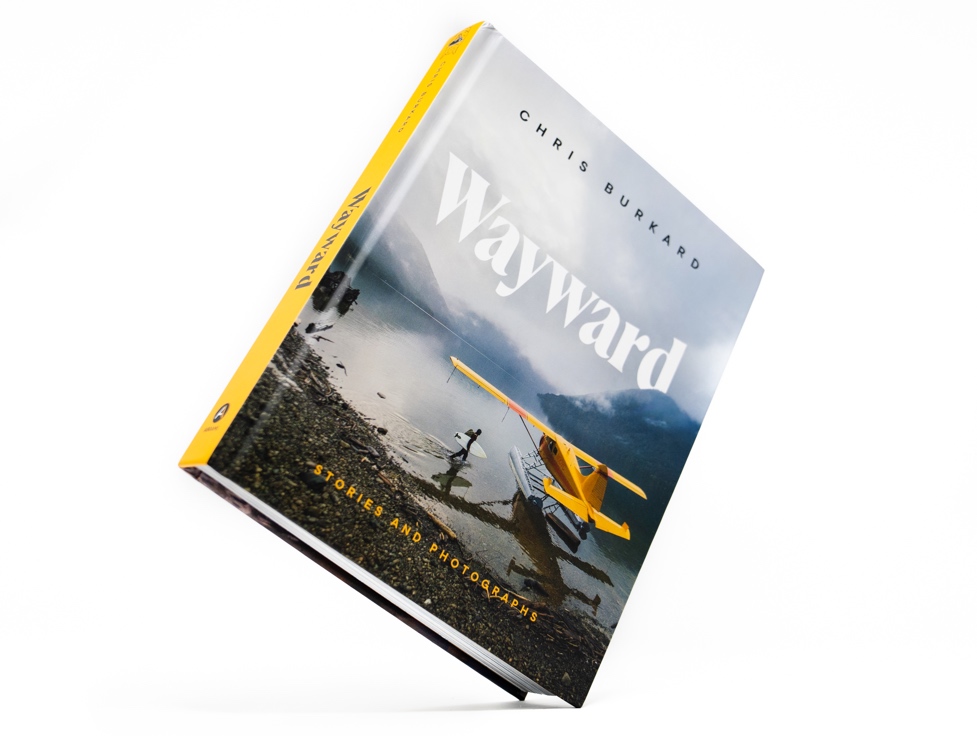
Photos courtesy of Chris Burkard
—
Download on Apple Podcasts
—
Download on Spotify
—
Download on Google Podcasts
—
Download on Overcast
—
EPISODE NOTES
Topics Discussed:
- 5:00 – How the pandemic has been for Chris and his family
- 9:25 – Process of writing the book
- 14:00 – Thoughts when looking back at his early work
- 17:30 – Early challenges and localism
- 23:45 – Patagonia’s role in Chris’s artistic evolution
- 27:40 – Importance of having the confidence to be yourself
- 31:30 – Overcoming self-doubt
- 33:45 – People Chris trusts to give honest opinions
- 36:45 – How Chris transitions from hardcore adventures back into “real life”
- 40:30 – Reevaluation of risk as he gets older
- 42:40 – Lessons from suffering
- 44:00 – Why Chris continues to focus his creative energy on books
- 54:00 – Importance of sharing the experiences with others
- 58:30 – Projects in the works
Information Referenced:
- Chris Burkard
- Wayward by Chris Burkard [Amazon / Bookshop]
- The Constant Gardener by John Le Carre [Amazon / Bookshop]
- California Surf Project by Chris Burkard [Amazon / Bookshop]
- Patagonia
- Surfer Magazine
- Keith Ladzinski
- Distant Shores by Chris Burkard [Amazon / Bookshop]
- John Muir
- Ansel Adams
- Edward Weston
- Edward Abbey
- Jimmy Chin
- There and Back by Jimmy Chin [Amazon / Bookshop]
- Corey Rich
- Paul Nicklen
- Hampton Sides
Enjoy this episode? Then you might like these too:
- Pete McBride – A Passion for Water & Wild Places
- Hampton Sides, Part 3 – Tales from a Most Excellent Adventure
- Peter Heller – Chasing the Flow
- Iris Gardner – Living with Intention
- Heather Hansman, Part 2 – The Fascinating Story of Skiing’s Past, Present, & Future
- Kelsey Johnson – Chasing Her Artistic Ambitions
- Duke Phillips IV – Living with the Land
Reflections On My First Elk Hunt, with Adam Gall
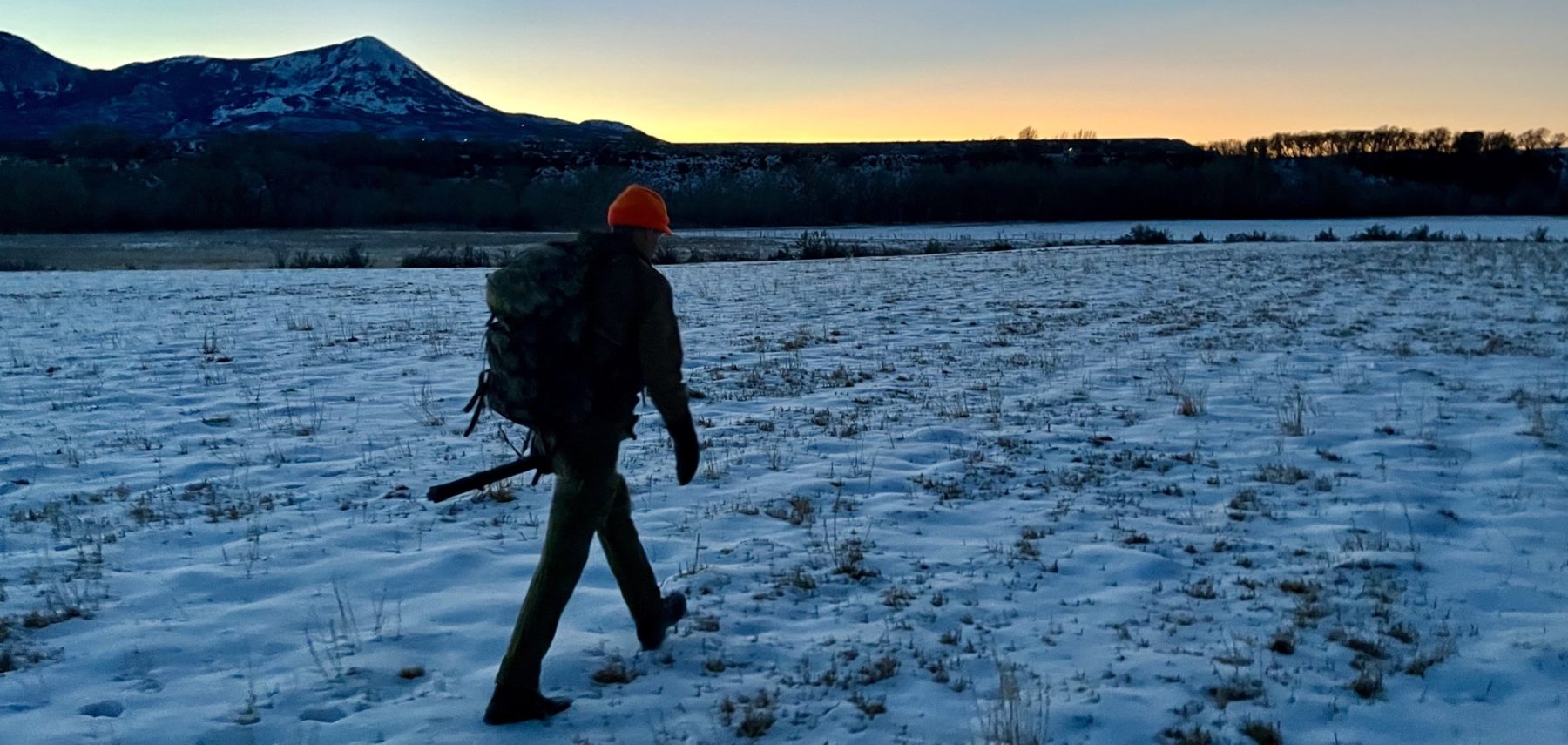
Longtime Mountain & Prairie listeners will remember Adam Gall– he’s a Colorado-based hunting guide who, along with his wife Ana, owns Timber to Table Guide Service. Adam is a highly regarded expert in the pursuit of elk and mule deer, and he offers a variety of outfitting services ranging from public land hunts for experienced hunters to private land hunts for beginners. In my first episode with Adam, we discussed his career path to guiding, which included stints as a wolf biologist and science teacher, as well as his advocacy for public lands and wildlife conservation.
In early January, I had the pleasure of joining Adam for my first-ever elk hunt, and this episode is a discussion about that extremely powerful experience. I had wanted to hunt elk ever since moving to the Rocky Mountains back in 2005, but I never took the necessary steps to learn how to do it. While I do have limited experience with bird hunting, I had zero experience hunting with a rifle. The idea of starting big game hunting from scratch was intimidating and overwhelming– plus, I have way-too-many other hobbies that fill my time– so elk hunting has been on the back burner for more than 16 years. But after getting to know Adam, learning about his skills as a teacher, and admiring his calm demeanor and reverence for wildlife, I decided that he was just the person to introduce me to the sport of elk hunting.
To be completely transparent, I was very nervous about all aspects of the hunt– my shooting proficiency, my ability to kill the elk quickly, quartering the animal, and processing the meat. I have the utmost respect for the skills required to be a responsible and effective big game hunter, so I was intent on approaching the entire endeavor with a high level of seriousness and focus. From the moment I arrived in Hotchkiss until we had processed the last pound of meat, Adam and Ana were exceptional teachers–we had a successful hunt and I left Hotchkiss with a new-found, life-changing appreciation for everything that is required to procure meat for my family.
The purpose of this episode is to provide instruction and insight for people like me– individuals who are interested in big game hunting and procuring meat but have no idea where or how to start. Even if you’ve never shot a gun, there will be useful information in this episode. Adam and I discuss all aspects of the hunt–from shooting practice at the gun range on the first day all the way to processing the meat into burger, steaks, and roasts four days later. I discuss the overwhelming emotions I felt after killing such a majestic animal, and the eye-opening experience of learning about specific cuts of meat with Ana. We discuss how Adam’s experience as a teacher makes him such an effective guide, and the importance of approaching hunting with respect, reverence, and curiosity. We talk about game management, food systems, private lands’ role in wildlife health, and much more.
I hope you enjoy this conversation as much as I did. Hopefully, it will give you the encouragement to pursue hunting if it is of interest to you. Hunting is obviously not for everyone, but as a person who eats and enjoys meat, I am very grateful to have had the opportunity to participate in all the tasks that are required to put clean, healthy meat on my family’s table.
Thanks again to Adam and Ana for the once-in-a-lifetime experience, and thanks to you for listening. Enjoy!
Photos by Ed and Adam
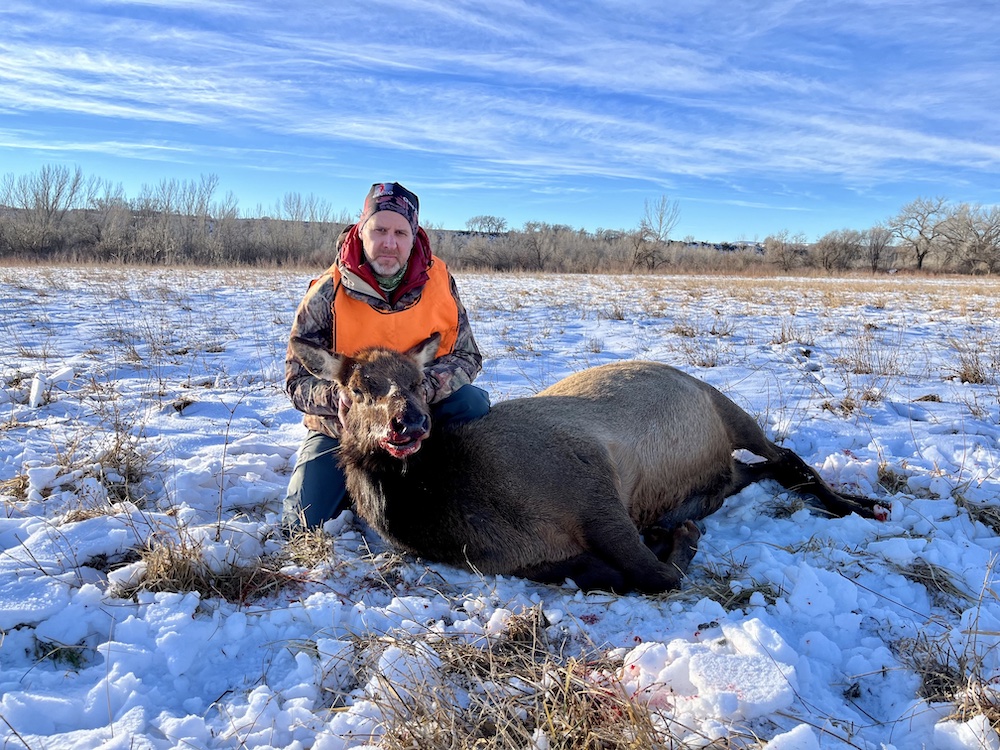
—
—
Download on Apple Podcasts
—
Download on Spotify
—
Download on Google Podcasts
—
Download on Overcast
—
EPISODE NOTES
Topics Discussed:
- 4:45 – Thanks to Adam and Ana
- 6:15 – Why Adam enjoys teaching first-time hunters
- 8:15 – Adam’s background as a teacher
- 10:30 – Balancing fun and seriousness
- 16:15 – Details of the beginner’s private land meat hunt
- 21:45 – Importance of game management on private lands
- 23:45 – Hunt preparation
- 32:15 – Morning of the hunt
- 34:45 – The kill
- 37:45 – Respect for the taking a life
- 44:45 – Quartering the animal and processing the meat
- 54:45 – A foundational shift in perspective
- 58:00 – Cooking resources and ideas
- 59:45 – Closing thoughts
Information Referenced:
- Adam’s first M&P episode
- Timber to Table Guide Service
- Dark Timber Lodge
- Hotchkiss, Colorado
- Paonia, Colorado
- Colorado Parks and Wildlfe
- Colorado Parks and Wildlife – Big Game Hunting
- Backcountry Hunters and Anglers
- Ryan Busse episode
- Kate Kavanaugh episode
- Buck, Buck, Moose: Recipes and Techniques for Cooking Deer, Elk, Moose, Antelope and Other Antlered Things by Hank Shaw – Amazon / Bookshop
Enjoy this episode? Then you might like these too:
- Ryan Busse – Standing His Ground
- Iris Gardner – Living with Intention
- Rachel VandeVoort – Harnessing the Power of Outdoor Recreation
- Dan Prenzlow – Generous Service, Humble Leadership
- Kate Kavanaugh – Regeneration & Restoration
- Mark Kenyon – A Passion for Public Lands
- Matt Skoglund – Adventures in Bison Ranching
- Chris Dombrowski – Words, Water & the West
- Jessica Wahl Turner – Outdoor Recreation & Rural Economies
Elliott Woods – Stories from Dangerous Places
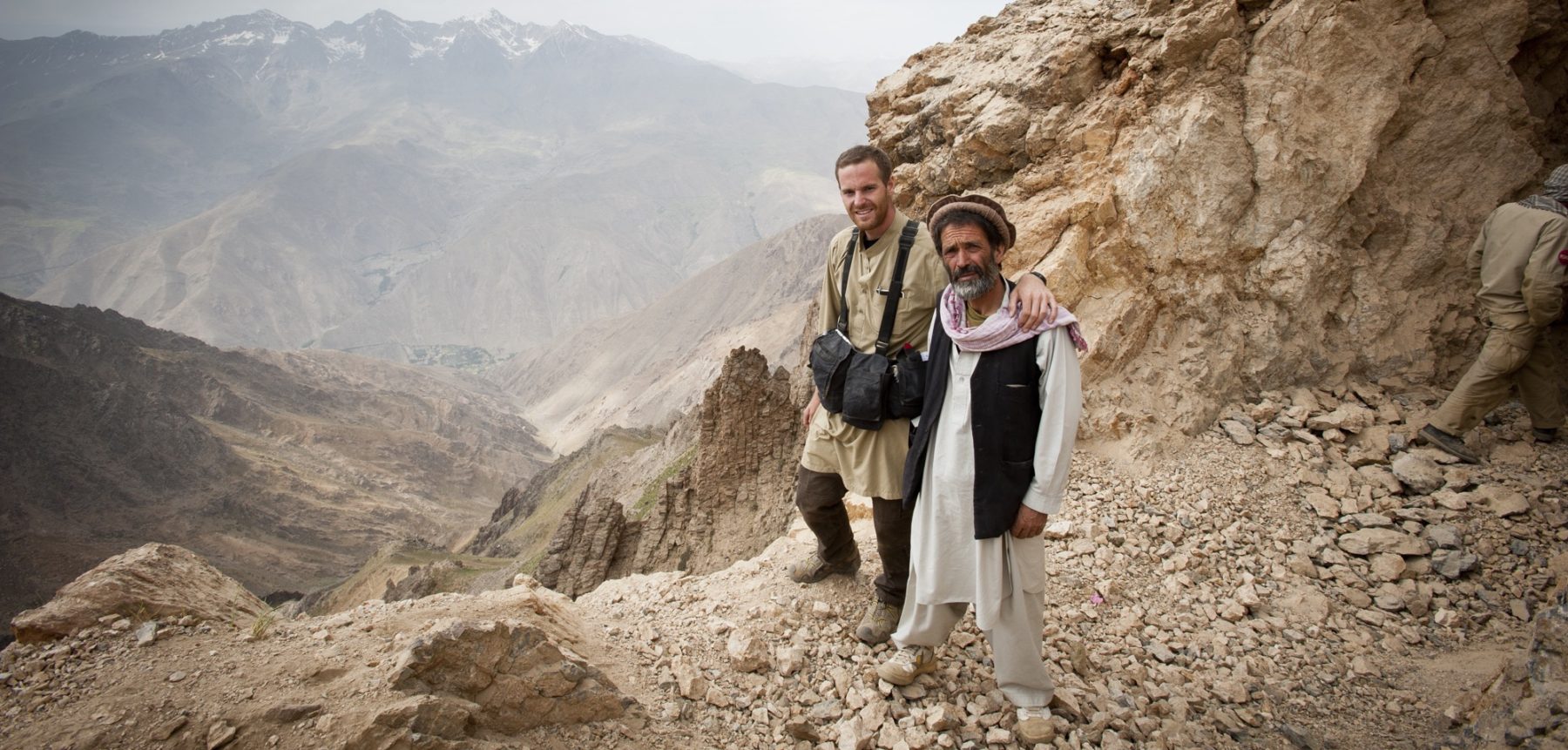
Elliott Woods is a Montana-based veteran and multimedia journalist who has reported for publications including Outside, The Wall Street Journal, The New York Times, and many more. His most recent project is a podcast called Third Squad, which tells the powerful story of “one journalist, 12 Marines and two decades of war.” Back in 2011, Elliott was an embedded journalist with a group of Marines who were positioned deep in one of Afghanistan’s most dangerous regions. Nearly a decade later, Elliott embarked on a cross-country road trip to reunite with the surviving members of the team and discuss how that violent deployment impacted their lives. Third Squad tells the stories of these Marines, offering raw insights into the impact of war on individual soldiers, both on the battlefield and back at home.
Elliott was born and raised on the east coast, and as a kid, he never had strong ambitions to join the military. However, after an unsuccessful stint in college left him lacking purpose and low on options, he decided to join the National Guard. Elliott was eventually deployed to Iraq, where he served for a year as an Army combat engineer. When Elliott had finished serving and returned to college at the University of Virginia, he approached his education with a new focus and purpose, and it was there that he discovered writing and journalism. As a journalist, Elliott has traveled everywhere from war-torn regions of the globe to well-known conflicts in the American West– from the Gaza Strip to the front lines of the Keystone XL Pipeline protests. Whether reporting on public lands, outdoor adventure, or war, Elliott brings focus and intensity to all of his projects.
Elliott and I met years ago, so it was great to reconnect and have an in-depth conversation about his life and career. We started out by discussing his upbringing in Maryland and Pennsylvania, and how he developed a love of the outdoors at an early age. We discuss his education, his failed first attempt at college, and his path to the military. We discuss his time in Iraq, his career as a journalist, and the origins of the Third Squad podcast. We talk about the current state of journalism, and Elliott discusses why he feels the need to cover stories that involve dangerous people and places. We talk about hero culture, the importance of having a purpose, how the natural world has been a healing force in his life, and Elliott offers up some excellent book recommendations.
I encourage all of you to check out Third Squad, as well as Elliott’s 2016 TED Talk that I reference in the conversation. There are links to everything in the episode notes. Thanks to Elliott for all of his hard work and for joining me for such an important conversation. Enjoy.
Photos courtesy of Elliott Woods.
—
Download on Apple Podcasts
—
Download on Spotify
—
Download on Google Podcasts
—
Download on Overcast
—
EPISODE NOTES
Topics Discussed:
- 4:00 – Elliott’s childhood and how he got into the military
- 12:00 – Elliott discusses what it was like having joined the military weeks before 9/11/2001
- 15:00 – Elliott talks about reintegrating to normal life as a student after his deployment in Iraq
- 22:30 – Elliott discusses the importance of having a mission in his life
- 29:00 – Elliott talks about why he disagrees with “hero culture” in the US
- 34:30 – Elliott talks about his mentality when writing about powerful or dangerous people
- 43:00 – Elliott talks about “solution journalism” and the need to highlight problems in journalism
- 53:45 – Elliott discusses the impact Montana and nature has had on him
- 58:15 – Elliott’s book recommendations
- 1:04:00 – Elliott’s parting words of wisdom
Information Referenced:
- Elliott’s podcast: Third Squad
- Elliott’s TED talk: Finding Fulfilment in the Aftermath of War
- Gaithersburg, MD
- Bethesda Naval Hospital
- Lewisburg, PA
- Susquehanna River
- Georgetown Prep
- Valley Forge Military Academy
- Fordham University
- Fort Leonard Wood
- Virginia Commonwealth University
- Saddam Hussein
- Mosul, Iraq
- University of Virginia
- Virginia Quarterly Review
- Mad Libs
- Greg Gianforte
- Sebastian Junger
- Existentialism
- Miguel de Cervantes Saavedra
- Absaroka-Beartooth Wilderness
- Livingston, MT
- Wilson Rawls
- Gary Paulsen
- Kurt Vonnegut
- Svetlana Alexievich
- Tim O’Brien
- Abe Streep
Enjoy this episode? Then you might like these too:
- Jason Gardner – A Life of Purpose & Service
- John Branch – Seeking the Extraordinary in the Ordinary
- Antonia Malchik – Exploring Culture & Complexity
- Ryan Busse – Standing His Ground
- George Hodgin – Mission-Driven Entrepreneur
- Hal Herring – A Man of Words & Wild Places
- Heather Hansman, Part 2 – The Fascinating Story of Skiing’s Past, Present, & Future
Heather Hansman, Part 2 – The Fascinating Story of Skiing’s Past, Present & Future
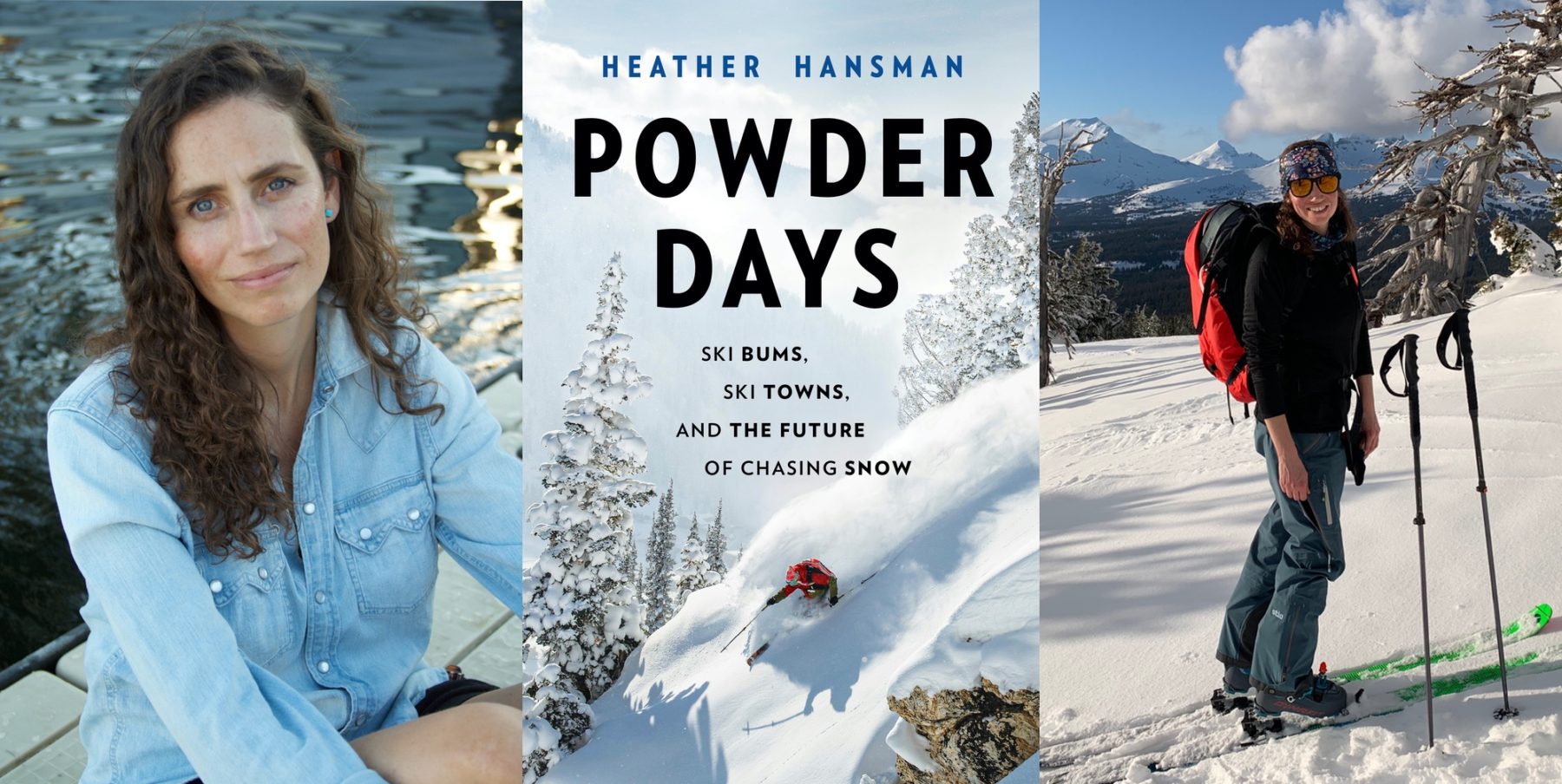
Heather Hansman is a Seattle-based writer and editor, as well as the author of the excellent new book Powder Days: Ski Bums, Ski Towns, and the Future of Chasing Snow. Longtime listeners will remember Heather’s first appearance on the podcast, when we discussed her book Downriver, one of my favorite books about the complicated subject of water in the West. Heather has an uncanny ability to distill complex, sometimes-messy topics into fun-to-read narratives that are equally educational and entertaining. And she’s done it once again with Powder Days— it’s a thoughtful and thorough examination of ski culture, the ski industry, and the myriad of challenges that can accompany life in ski communities.
Heather was born and raised on the east coast, but headed West immediately after college, where she spent many winters living and working in ski towns throughout the Rocky Mountains. She eventually left the ski bum lifestyle behind to pursue a career in journalism but has remained closely connected to skiing and the ski culture for all of her adult life. Given her professional success as a journalist and her personal love of skiing, Heather is uniquely qualified to offer this nuanced, in-depth look at skiing and its impact on the culture, economy, and environment of mountain towns throughout the United States.
Heather and I connected a few days before Powder Days‘ publication date to talk about the book and the many important topics that it addresses. We start out discussing why she chose to write a book about the ski industry, and how the many issues and challenges facing ski communities are representative of broader issues facing the American West. We discuss the history of skiing in the United States and how the industry has grown and transformed over the past 70 years. We discuss income inequality in ski towns, as well as the prevalence of mental health and substance abuse problems that often plague these communities. We discuss the psychological profiles of sensation-seeking skiers, the big business of skiing and ski resorts, equity in outdoor recreation, climate change’s effect on skiing, and much more.
Whether you’re a skier or not, I highly recommend you check out Powder Days. It’s a must-read for anyone interested in understanding the economic and social forces shaping the modern-day American West. And for more information on Heather, you can check out our first episode– there’s a link in the episode notes.
Big thanks to Heather for writing yet another wonderful book, and thanks to all of you for listening. Enjoy!
Photos courtesy of Heather Hansman.
—
Download on Apple Podcasts
—
Download on Spotify
—
Download on Google Podcasts
—
Download on Overcast
—
EPISODE NOTES
Topics Discussed:
- 4:30 – Why Heather chose to write a book about skiing
- 8:00 – “Ski bum” defined
- 12:00 – Heather’s time as a ski bum and when she decided to leave that world
- 15:00 – The psychological profile of obsessed skiers
- 18:00 – The appeal of seeking adventure in the mountains
- 19:40 – History of the ski industry in the US
- 23:00 – Changes in the business of skiing
- 27:00 – Extreme economic inequality in ski towns
- 30:30 – What is the future of economic sustainability in ski towns
- 33:30 -Gini coefficient and more on inequality
- 38:20 – Climate change and the ski industry
- 41:30 – Predicting the future of skiing related to climate
- 43:00 – Feeling that came with revisiting the ski world
- 45:00 – The need for ski bums to engage in the community
- 48:30 – Booze and mental health in mountain communities
- 51:20 – Goals and reasons for writing this book
- 55:00 – Heather’s current projects
- 56:00 – Good books
Information Referenced:
- Heather Hansman
- “Ski Bum”
- Beaver Creek
- Arapahoe Basin
- Five personality traits
- Sensation seeking
- Ryan Burke – Jackson Hole
- Steamboat Springs
- 10th Mountain Division
- Vail Resorts
- Alterra
- Aspen, Colorado
- Gini coefficient
- Auden Schendler episode
- Heather’s Outside column
- Firewatcher’s Daughter
- Firekeeper’s Daughter by Angeline Boulley – Bookshop / Amazon
- Great Circle by Maggie Shipstead – Bookshop / Amazon
Enjoy this episode? Then you might like these too:
- John Branch – Seeking the Extraordinary in the Ordinary
- Luke Smithwick – A Life in High Places
- Hampton Sides, Part 3 – Tales from a Most Excellent Adventure
- Kelsey Johnson – Chasing Her Artistic Ambitions
- Iris Gardner – Living with Intention
- Jessica Wahl Turner – Outdoor Recreation & Rural Economies
- Chris Burkard – The Art of Suffering
- Kate Kavanaugh – Regeneration & Restoration
- Sara Dant – A Deep Dive Into the History of the West
Matt Pierson – Finding New Solutions for Food Insecurity
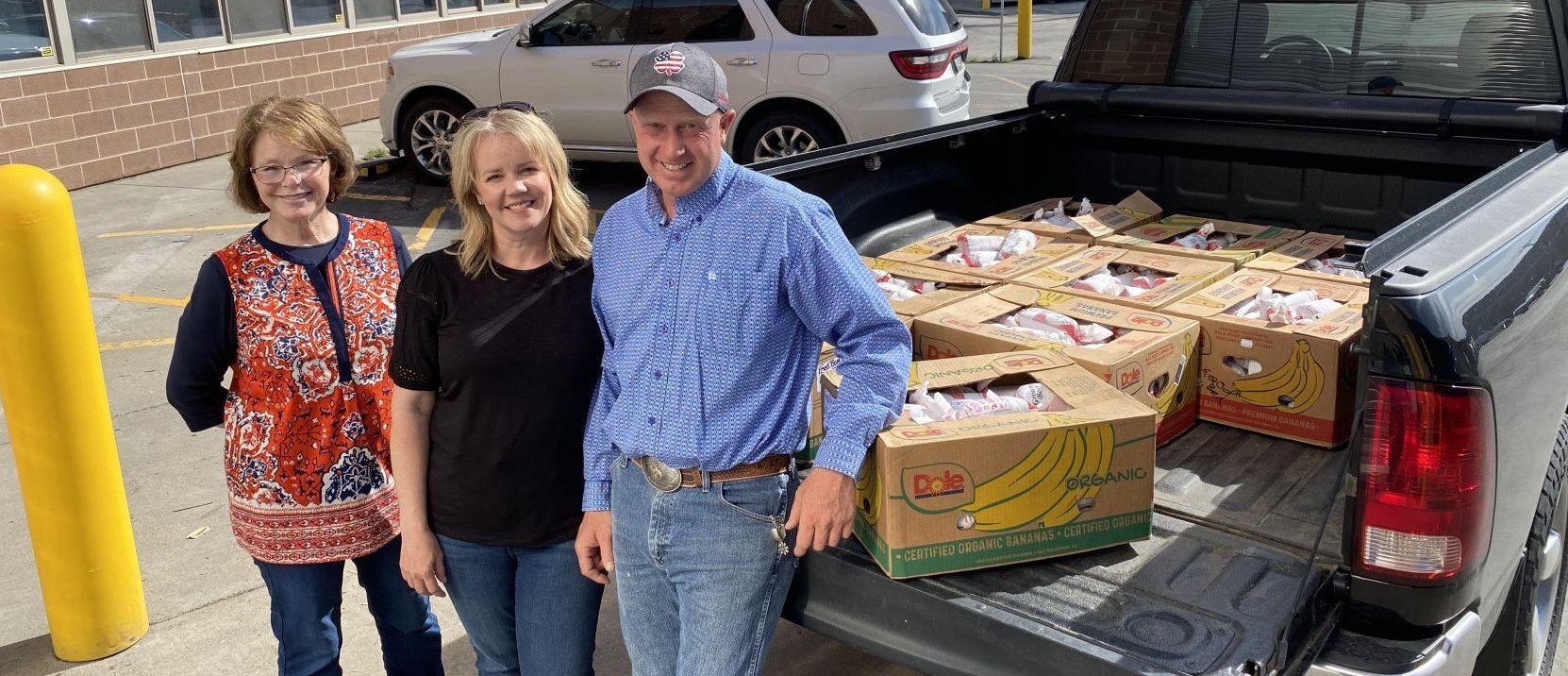
Matt Pierson is a fifth-generation Montana rancher who owns and operates Highland Livestock Company alongside his wife and two sons. He’s also the founder and President of the Producer Partnership, a newly formed non-profit organization that brings together farmers and ranchers with the goal of ending hunger in Montana. Since its start in spring of 2020, the Producer Partnership has given away tens of thousands of pounds of beef to Montana food banks and is creating replicable, scalable solutions for fighting hunger throughout the West and beyond.
The idea for the Producer Partnership was born in early 2020, just as the COVID-19 pandemic was roiling communities and economies across the globe. With many Montana residents out of work and food banks struggling to keep up with the unprecedented demand, Matt decided to donate the meat from a cow he was planning to cull to his local food bank. He quickly recognized the direct positive impact that his donation had on the community, so he reached out to friends to drum up more donations. Within a month, he had directed 10,000 pounds of ground beef to area food banks. He kept going, and by the end of 2020, that number had risen to more than 53,000 pounds of beef. Through creativity, hard work, and an unyielding commitment to G.S.D. (“Getting Stuff Done”), Matt and his team at the Producer Partnership have created a new model for solving food insecurity in Montana.
Matt and I connected virtually for a wide-ranging conversation that will be inspiring and educational for anyone interested in impactful, purpose-driven work. We started out discussing his family’s long history in Montana, and then we moved into details of how the Producer Partnership began. We talked about the challenges around processing meat both during the early stages of the pandemic and now, as well as the cutting-edge meat processing facility that the Producer Partnership is currently building. We discussed the scalability and replicability of the Producer Partnership model, and how he expects the organization to evolve in the coming years. Matt discussed the importance of community; why he chooses to volunteer for causes ranging from youth soccer to Trout Unlimited; the future of agriculture; how he defines success in his ranching operation; and much more.
This is an inspiring episode, and I know you’ll enjoy it. Go to producerpartnership.com to learn more about Matt and his work– and donate or buy some gear if you are so inclined. Enjoy!
Photos courtesy of the Producer Partnership
—
Download on Apple Podcasts
—
Download on Spotify
—
Download on Google Podcasts
—
Download on Overcast
—
This episode is brought to you by The Arthur M. Blank Family Foundation and its Montana-based AMB West Philanthropies, both of which embody the values-based approach to philanthropy and business of their Chairman Arthur M. Blank
EPISODE NOTES
Topics Discussed:
- 3:50 – Matt’s family history in Montana
- 4:50 – The beginnings of the Producer Partnership
- 8:20 – Logistics during the early days of the Producer Partnership
- 10:20 – Media begins to pick up the Producer Partnership story
- 12:00 – “GSD” – Getting Stuff Done
- 14:00 – First year success
- 15:50 – Managing the Producer Partnership and the family ranch
- 18:20 – Executing the idea of building a new processing facility
- 22:00 – Adding value to all steps of the process
- 26:20 – Realities of building a first-of-its-kind federally approved processing facility
- 30:00 – Role for the Producer Partnership post-COVID
- 32:00 – Potential for replicability
- 39:00 – The importance of community
- 43:00 – How Matt judges success in ranching
- 47:45 – How Matt thinks agriculture will evolve in the coming years
- 52:00 – The unexpected surprise of creating a non-profit
- 56:00 – Importance of being a problem solver, thinking independently
- 57:30 – Favorite books
- 1:00:30 – Words of wisdom
- 1:02:30 – Overcoming the labor challenges
Information Referenced:
- The Producer Partnership
- DONATE to the Producer Partnership
- Producer Partnership Merch
- Livingston, Montana
- Yellowstone River Beef Processing
- Livingston Food Resource Center
- Missoula Food Bank
- Montana Food Bank Network
- 501(c)(3)
- Matt Skoglund – Episodes 1 & 2
- John Deer film, featuring Matt
- Lonesome Dove by Larry McMurtry – Bookshop / Amazon
- Lonesome Dove movie
- Everything Your Coach Never Told You Because You’re a Girl by Dan Blank – Bookshop / Amazon
- Arthur M. Blank Family Foundation
- AMB West Philanthropies
Enjoy this episode? Then you might like these too:
- NEW WEST DISPATCH: Matt Skoglund – Ranching in the Age of COVID
- Lesli Allison & Tuda Libby Crews – Durable Conservation in the West… and Beyond
- Daniela Ibarra-Howell – Healing the Land Holistically
- Kate Kavanaugh – Regeneration & Restoration
- Duke Phillips III – A Vision for the New West
- Duke Phillips IV – Living with the Land
- Alexis Bonogofsky – Taking a Stand for the West
- Shane Doyle – Reverence for the Past, Hope for the Future
Ryan Busse – Standing His Ground
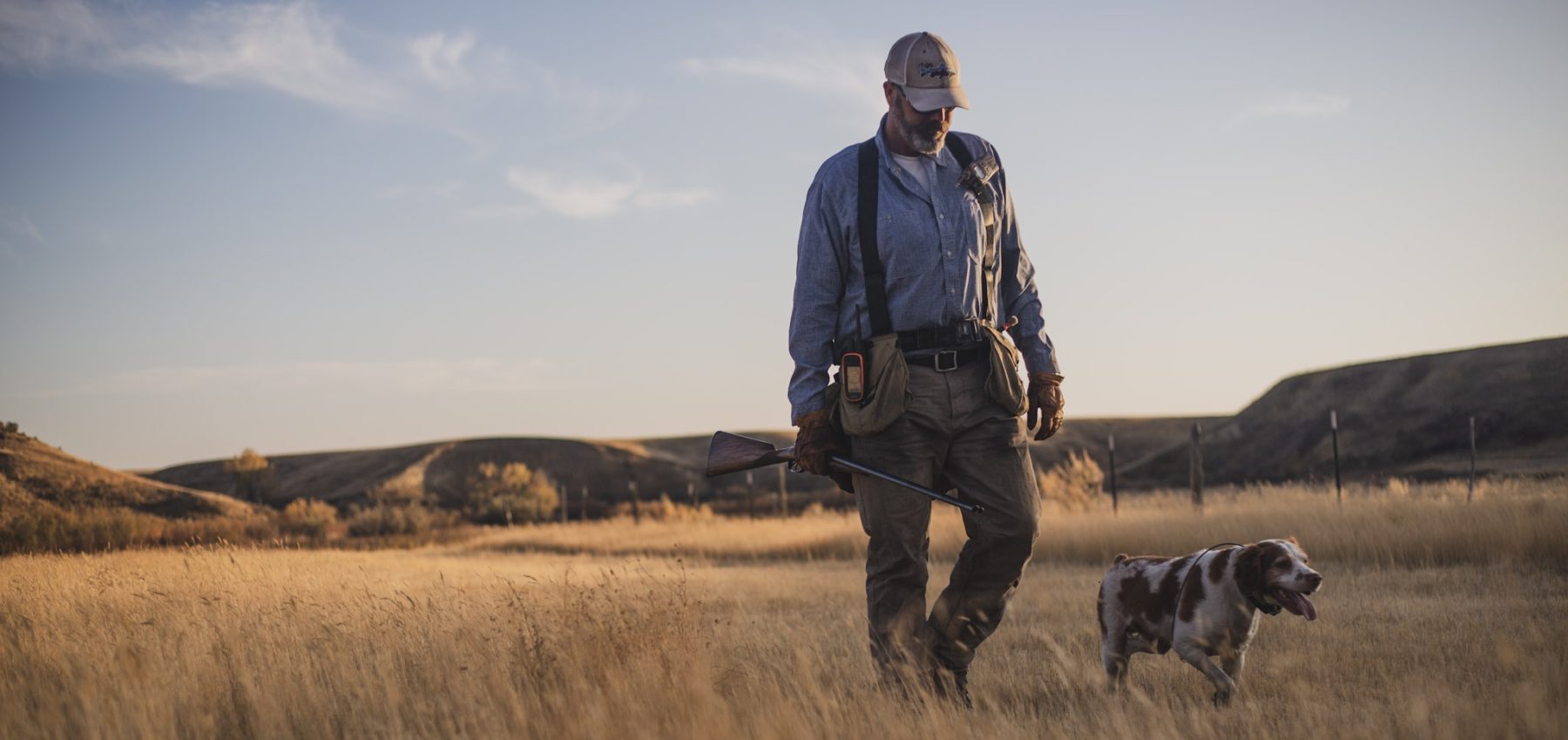
Ryan Busse is a Montana-based conservationist, public lands advocate, and former top-performing firearms executive. He’s also the author of the new book Gunfight: My Battle Against the Industry that Radicalized America, which has received advanced praise from everyone from Publishers Weekly to Senator Jon Tester. Ryan is a life-long hunter and angler, as well as a proud gun owner, and he brings a unique, nuanced perspective to our country’s ongoing debate about guns and the Second Amendment. Gunfight is in no way an “anti-gun” book– rather, it’s an insider’s examination of how and why the firearms industry transformed from a sportsman-centered business into a politically driven machine that uses decisiveness and fear to grow profits exponentially. From a broader perspective, Gunfight helped me to understand how we ended up at this bizarre moment in history– a moment defined by anger, misinformation, tribalism, and binary thinking.
Ryan was born in western Kansas and grew up on his family’s ranch, where most of his childhood was centered around hunting, fishing, and a close connection to the land. After college, Ryan focused his energy on building a career in the sporting goods industry, first working for an optics company and then moving into the firearms business. Ryan found his calling as a gun salesman, and, over the course of his career, he helped transform a small firearms company named Kimber into an internationally recognized brand. But as you’ll hear in our conversation, Ryan’s advocacy for public lands and conservation created a rift between him and the firearms industry– a rift that eventually exposed the industry’s authoritarian power structure that does not tolerate independent thinking or deviations from industry dogma. Ryan refused to be bullied or told what to think, and he eventually quit his lucrative job selling guns and decided to tell his story and that of the industry’s transformation. The result is his book Gunfight, which we are discussing here today.
I was lucky enough to receive an advanced copy of Gunfight, and I was thrilled to have a chance to discuss it with Ryan. We started out talking about his upbringing on his family’s Kansas ranch and how his father introduced him to the writings of conservation luminaries, including Aldo Leopold and Theodore Roosevelt. We then discussed his life-long love of hunting and guns, and why he chose to pursue a career in the gun industry. We discussed the exact moment when he realized that his personal devotion to public lands was at odds with his industry’s stance and the unraveling that occurred over the course of the following years. We talk about why gun sales soar during Democratic administrations, the industry’s shift from hunting rifles to assault rifles, some very disturbing stories from industry events, Ryan’s public land advocacy, the positive influence of his wife, and much more.
I thoroughly enjoyed this conversation, and I learned a lot. I really appreciate Ryan taking the time to chat, and I hope you find it enlightening. Be sure to check out the episode notes for a complete list of topics and links to everything we discussed. Enjoy!
Photos courtesy of Ryan Busse
—
Download on Apple Podcasts
—
Download on Spotify
—
Download on Google Podcasts
—
Download on Overcast
—
EPISODE NOTES
Topics Discussed:
- 5:00 – Ryan’s background
- 8:30 – Ryan discusses his father and his impact on Ryan’s conservation ethic
- 12:45 – Ryan talks about what he was like in high school
- 15:00 – Ryan discusses when he felt like his role in the firearms/optics industry was a good career path for him
- 17:00 – Ryan tells the story of the experience that made him second guess his career
- 22:00 – Following his falling out with the leaders in firearms industry, Ryan explained why he stayed in the industry
- 26:00 – Ryan describes an uncomfortable moment when he went to an NRA conference
- 32:30 – Ryan describes a moment where a journalist showed up to an interview armed with an AR-15
- 37:30 – Ryan discusses the phenomenon that gun ownership/purchases sky rocket during Democratic presidential administrations
- 41:30 – Ryan explores why gun enthusiasts or industry personnel may disagree with him
- 45:30 – Ryan talks about his wife
- 48:00 – Ryan talks about Backcountry Hunters and Anglers and his role with them
- 1:02:30 – Ryan’s book recommendations
- 1:05:00 – Ryan’s parting words of wisdom
Information Referenced:
- Ryan Busse
- Burlington, CO
- Burris Optics
- Kimber
- The Conservation Reserve Program
- Smith & Wesson
- Adam Grant
- Badger Two-Medicine area
- Cheney Energy Plan
- Trout Unlimited
- Roan Plateau
- National Riffle Association
- National Shooting Sports Foundation
- AR-15
- Assault Weapons Ban of 1994
- Q-Anon
- Sam Harris
- Backcountry Hunters and Anglers
- National Audubon Society
- Martin Heinrich
- Timothy Egan
- Patrick Radden Keefe
Enjoy this episode? Then you might like these too:
- Hal Herring – A Man of Words & Wild Places
- Adam Gall – A Reverence for Wildlife & Wild Places
- Rachel VandeVoort – Harnessing the Power of Outdoor Recreation
- Mark Kenyon – A Passion for Public Lands
- Antonia Malchik – Exploring Culture & Complexity
- Gabe Vasquez – Advocate for Equity in the Outdoors
- Dan Prenzlow – Generous Service, Humble Leadership
- Alexis Bonogofsky – Taking a Stand for the West
- Adam Foss – Lessons Learned From a Life Afield
Lesli Allison & Tuda Libby Crews – Durable Conservation in the West… and Beyond
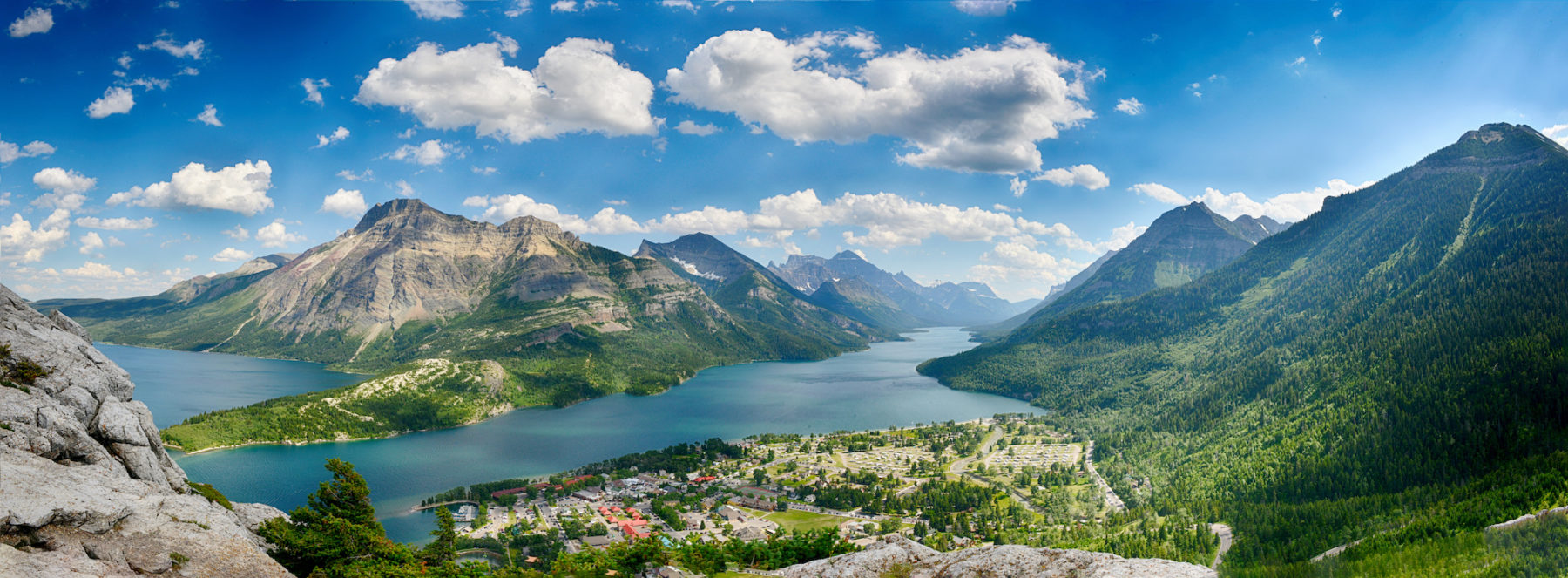
Lesli Allison and Tuda Libby Crews join me to discuss the critical role of private and working lands in achieving durable conservation outcomes in the United States. Lesli is a founding member and the Executive Director of the Western Landowners Alliance, a nonprofit organization that advances policies and practices that sustain working lands, connected landscapes, and native species. Tuda is a rancher and owner of Ute Creek Cattle Company, a conservation-focused ranching operation in northeastern New Mexico that has been in Tuda’s family for more than 200 years. Whether discussing on-the-ground stewardship practices or the intricacies of federal conservation policy, Lesli and Tuda are uniquely qualified to offer informed and thoughtful perspectives on all aspects of private land in the West.
While ranchers, farmers, and conservation stakeholders have long understood the critical importance of private land stewardship and conservation, the Biden administration’s 30×30 conservation goal has brought the topic to the forefront of American politics and mainstream media. 30×30 has prompted challenging conversations about what it means to conserve land, and it has sparked healthy debates about the government’s role in private land stewardship. 30×30 is a bold initiative and its implications for private landowners, particularly agricultural producers, are enormously complex– we’ll never find sufficient answers in pithy Tweets or surface-level news stories. So, I was excited to have Lesli and Tuda join me for an in-depth, hour-long conversation about 30×30 and private lands’ role in large-scale conservation.
Lesli, Tuda, and I connected via Zoom and enjoyed a wide-ranging conversation, covering everything from Tuda’s family history in New Mexico to the intricacies and realities of the 30×30 initiative. We started out discussing the vital role private lands play in conservation and environmental health here in the United States. Tuda talks about her family’s process of restoring her family’s ranch in New Mexico and the many environmental benefits that they have experienced. We obviously dig into 30×30, discussing its pros and cons and its opportunities and challenges. We talk about the importance of garnering local support for all land-related initiatives, and they each discuss their thoughts on the odds of success for an initiative as ambitious as 30×30. And as usual, they each offer up some excellent book recommendations that I think you’ll enjoy.
Please check out the episode notes for a full list of topics we discuss and links to all of the information we reference. Enjoy!
Photos courtesy of the Salazar Center, Lesli Allison, and Tuda Libby Crews.
—
Download on Apple Podcasts
—
Download on Spotify
—
Download on Google Podcasts
—
Download on Overcast
—
This episode is brought to you in partnership with Colorado State University’s Salazar Center for North American Conservation.
On Sept. 28-29, 2021 the Salazar Center will host its third annual International Symposium on Conservation Impact. The virtual event will serve as the first major public convening focused on next steps for the Biden administration’s America the Beautiful initiative, with Secretary of Agriculture Tom Vilsack, Secretary of Interior Deb Haaland, and White House Council on Environmental Quality Chair Brenda Mallory joining on the second day.
The two-day event will also feature researchers, practitioners, and political leaders from Canada, Mexico, and Indigenous territories, who—along with their U.S. counterparts—will explore the state of progress toward large landscape conservation goals throughout North America, and highlight lessons learned from other national-level efforts, such as Canada’s Pathway to Target One. In this context, the symposium will address critical themes such as transboundary partnerships, Indigenous leadership, and climate impacts, with former Vice President Al Gore providing remarks on the urgency of efforts to mitigate climate change.
Please follow the link in the episode notes to learn more, or go directly to salazarcenter.colostate.edu. Thank you.
—
EPISODE NOTES
Topics Discussed:
- 4:40 – Lesli’s introduction
- 6:25 – Tuda’s introduction
- 9:55 – Lesli discusses private lands’ role in conservation
- 13:25 – Tuda describes her ranch and her family’s conservation work there
- 19:40 – Lesli talks about performing private land conservation work at scale
- 24:40 – Tuda describes her process of arriving at creative land stewardship solutions
- 28:55 – Lesli and Tuda discuss 30 by 30
- 39:40 – Lesli discusses means of protecting agricultural property from subdivision
- 44:10 – Nodding towards public land conservation efforts, Leslie and Tuda discuss was to garner public support for private land stewardship efforts
- 51:40 – Lesli and Tuda talk about how they see our odds for success in these efforts
- 55:40 – Book recommendations
- 59:40 – Lesli mentions what WLA is doing from a media perspective
Information Referenced:
- Salazar Center
- Western Landowners Alliance
- Ute Creek Cattle Company
- Saltcedar (tamarisk)
- 30 by 30
- Nikki Silvestri
- Chaffee County
- Scott Momaday
- Aldo Leopold
- David Epstein
- John Steinbeck
- Timothy Egan
- Norman MacLean
- Dan Dagget
- Tracy Kidder
- Khaled Hosseini
Enjoy this episode? Then you might like these too:
- Dr. David Hewitt – The Science of Wildlife Conservation
- Carlos Fernandez – The Power of Partnerships
- Daniela Ibarra-Howell – Healing the Land Holistically
- NEW WEST DISPATCH – Marci McLean & Cora Neumann on COVID’s Impact on Native Communities
- NEW WEST DISPATCH: Matt Skoglund – Ranching in the Age of COVID
- Duke Phillips III – A Vision for the New West
- Duke Phillips IV – Living with the Land
- Russ Schnitzer – A Life Devoted to Western Landscapes
Hampton Sides, Part 3 – Tales from a Most Excellent Adventure
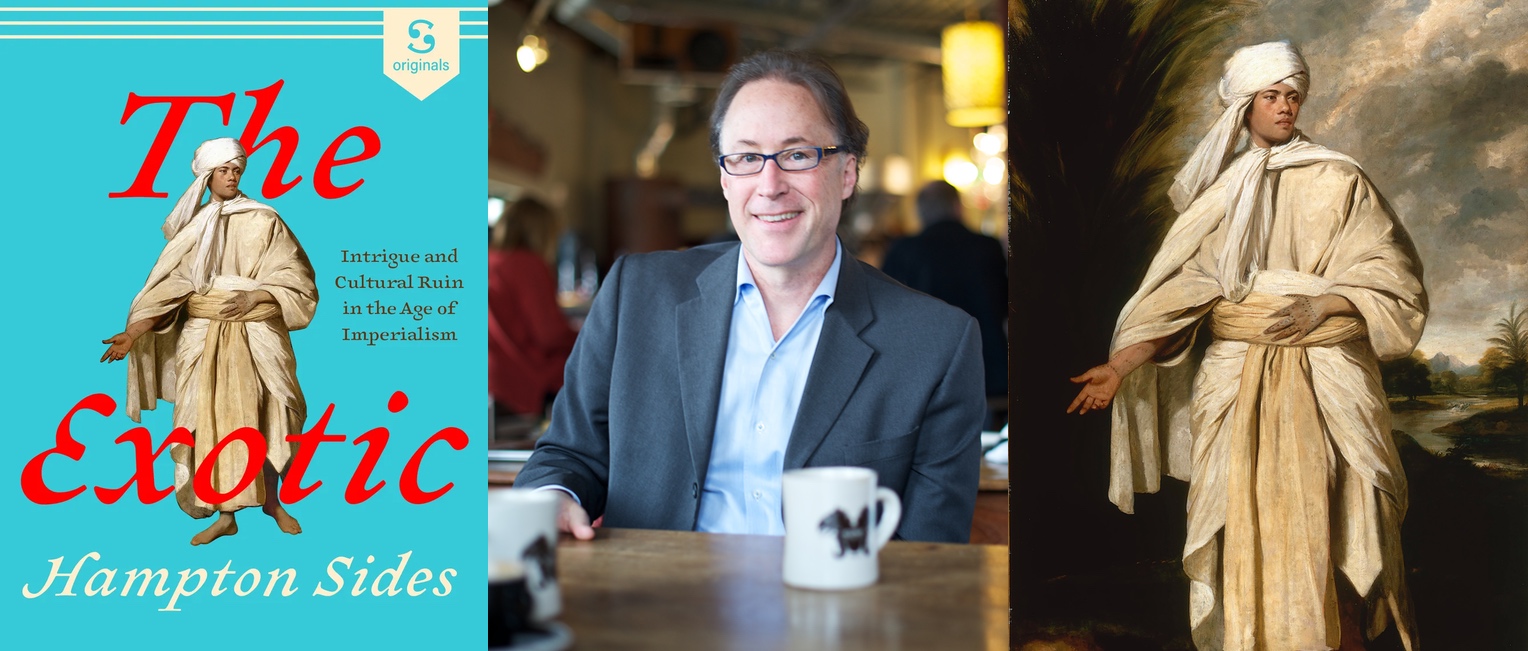
Hampton Sides is a historian and New York Times bestselling author who is best known for his engaging works of narrative nonfiction, including the books Blood and Thunder, Ghost Soldiers, On Desperate Ground, and more. His latest project is an ebook and audiobook titled The Exotic: Intrigue and Cultural Ruin in the Age of Imperialism, which details the life and unbelievable adventures of a man named Mai, who was the first Polynesian to set foot on British soil. The Exotic is much shorter than Hampton’s previous books but much longer than a magazine article, giving the reader a chance to enjoy Hampton’s one-of-a-kind historical storytelling in only a few hours of reading.
Longtime listeners of Mountain & Prairie will remember Hampton’s two previous appearances on the podcast. The first was an in-depth discussion of his book Blood and Thunder and the history of the American West, which was recorded live and on stage at the Aspen Institute. In his second appearance, we focused on his writing and research process, and his career progression from journalist at Outside magazine to becoming a best-selling historian. Today’s conversation takes us far beyond the American West, everywhere from remote islands in the South Pacific to King George’s court in England. So if you’re a fan of adventure, history, and profiles of Indigenous people who have often been overlooked by mainstream history, you’ll love this book.
Hampton and I connected virtually and had a fun conversation about the book and his process for writing it. We talked a lot about Mai’s unbelievable journey from Polynesia to England and back again, as well as the opportunities and challenges of exploring history from an Indigenous perspective. We talked about Hampton’s process for researching the book and how COVID has forced him to adjust his usual approach. Hampton was actually in the South Pacific researching the book in March 2020 when the pandemic hit, which, as you’ll hear, added an extra layer of adventure to an already adventurous trip. And as usual, Hampton offers up some great book recommendations that I think you’ll enjoy.
The Exotic is available exclusively on Scribd, which is an online service that gives you instant access to ebooks, audiobooks, articles, podcasts, and more. I’ve thoroughly enjoyed Scribd over the past few weeks, and I’d encourage you to give it a shot. You can access it for free for 30 days by following this link. And I’m not being paid for this endorsement– I’m just a fan of what Scribd is doing and the unique forms of writing that they are bringing to the world.
I hope you enjoy this episode, and I hope you’ll invest a few hours reading The Exotic. And if you haven’t already, go back and listen to my past episodes with Hampton– they are fun and educational conversations. Thanks so much.
Hampton’s headshot by Sergio Salvador.
—
Download on Apple Podcasts
—
Download on Spotify
—
Download on Google Podcasts
—
Download on Overcast
—
EPISODE NOTES
Topics Discussed:
- 4:00 – How Mai got Hampton’s attention
- 11:45 – Hampton discusses who Mai was
- 22:00 – Hampton walks us through what Mai did while he was in England
- 31:30 – Hampton explains what happens when Mai returns home
- 36:30 – Hampton describes doing his research while COVID-19 took off and discusses how the pandemic affected his writing
- 43:30 – Hampton talks about Captain Cook
- 51:15 – Hampton’s book recommendations
Information Referenced:
- Hampton Sides
- Hampton’s first and second M&P episodes
- 30-day free trial of Scribd
- Context about Mai
- Captain James Cook
- Scribd
- Sir Joshua Reynolds
- John Magnier
- Tahiti
- Raiatea
- Bora Bora
- Captain Samuel Wallace
- Motavai Bay
- Tobias Furneaux
- Jean-Jaques Rousseau
- Sir Joseph Banks
- The Kew Gardens
- King George III
- Dr. Thomas Dimsdale
- Samuel Johnson
- James Boswell
- Hyde Park
- Captain William Bligh
- Louis Antoine de Bougainville
- Bougainvillea
Enjoy this episode? Then you might like these too:
- Hampton Sides – Live at the Aspen Institute
- Hampton Sides, Part 2 – How to Tell a Damn Good Story
- Peter Heller – Chasing the Flow
- William deBuys – Sage of the Southwest
- Heather Hansman – Demystifying Water in the West
- Chris Dombrowski – Words, Water & the West
- Sara Dant – A Deep Dive Into the History of the West
- Hal Herring – A Man of Words & Wild Places
- Nickolas Butler – The Craft of Creativity
Luke Smithwick – A Life in High Places
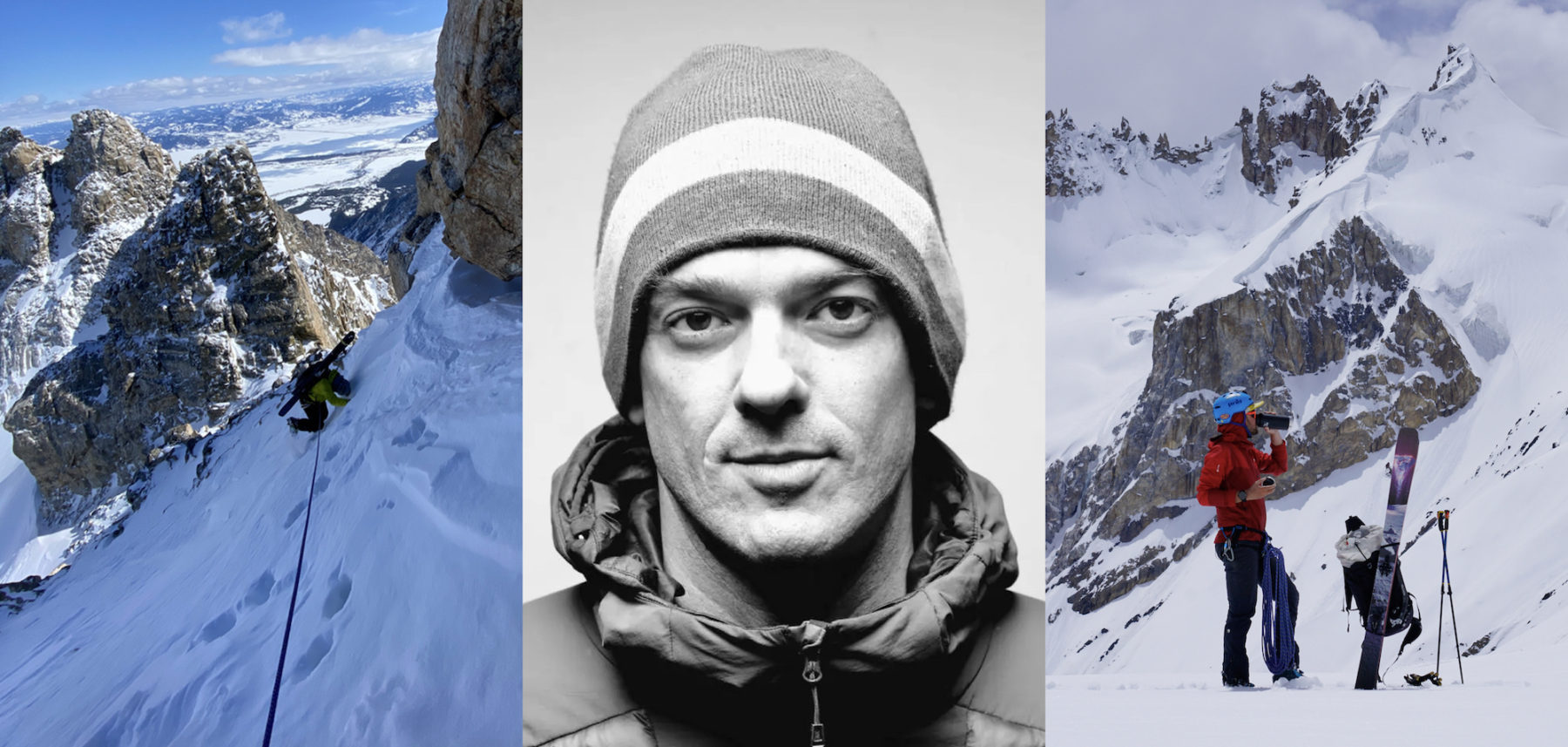
Luke Smithwick is a professional alpinist, ski mountaineer, and mountain guide best known for his cutting-edge climbs and descents in the world’s wildest mountain ranges. Luke is based in Victor, Idaho, in the shadow of the legendary Teton Range, but he spends large portions of each year deep in the Himalayas, guiding clients on remote peaks or pursuing personal climbing and skiing objectives on 7-8,000-meter peaks. He is currently hard at work on a multi-year skiing project called The Himalaya 500, which is his personal quest to ski 500 aesthetic ski lines throughout the greater Himalayan Range.
Luke was born and raised in North Carolina, and he moved to Colorado for college, where he attended CU Boulder and studied environmental biology and cultural anthropology. When not in class, Luke immersed himself in outdoor sports and soon began working as a guide– first a river guide on Colorado’s Upper Arkansas River and then a climbing guide. After graduation, Luke completely committed himself to the mountains, and his adventures have since taken him everywhere from the Alaska Range to his current work in the Himalayas. His company, Himalaya Alpine Guides, focuses on trips to some of the lesser-known (and less crowded) peaks in the Himalayan Range, where his clients can enjoy completely unique climbing and cultural experiences that cannot be found on more mainstream, well-known mountains.
Luke and I went to high school together back in the mid-1990s, and I was a couple of grades ahead of him. After graduation, we lost touch but have reconnected during the past few years thanks to shared interests and common friends. I was so happy that he joined me on the podcast, because I had lots of questions about how a guy from small-town North Carolina has become one of the world’s most accomplished Himalayan skiers. We had a wonderful conversation, discussing everything from his career trajectory to this season’s climbing objectives. We talked about how he picks ski lines, how climate change is affecting the Himalayas, the unique nature of his guiding company, how he trains, why he has made his home in the American West, and his deep respect for the people, history, and cultures of the Himalayas.
I loved catching up with my old friend Luke. I was blown away by all he has accomplished in the past 20 years, and I have the utmost respect for his understated, humble approach to life, learning, and adventure. Be sure to check the episode notes for links to everything we discussed. Enjoy!
Photos courtesy of Luke Smithwick.
—
Download on Apple Podcasts
—
Download on Spotify
—
Download on Google Podcasts
—
Download on Overcast
—
EPISODE NOTES
Topics Discussed:
- 4:00 – Luke walks us through his trajectory post high school and how he became a professional outdoor guide
- 7:30 – Luke talks about his work and his guide company in the Himalayas
- 9:45 – Luke explains why he focuses on a deep understanding of mountain ranges instead of just the principle summits of a range
- 13:15 – Luke discusses how he finds his clientele
- 15:30 – Luke explains the importance of local relationships for his business
- 17:45 – Luke discusses his project, the Himalaya 500
- 21:15 – Luke explains how he picks his ski lines
- 23:00 – Luke talks about the information age and its impact on the availability of “secret spots”
- 25:00 – Luke talks about the people he has met in his travels around the Himalaya
- 27:45 – Luke talks about how current action in Afghanistan may affect his work
- 28:45 – Luke discusses the impacts of climate change that he sees in his work
- 32:00 – Luke explains how he trains for his work and play in the mountains in order to make it a sustainable lifestyle
- 36:00 – Luke talks about his current 8,000 meter peak goal
- 39:00 – Luke discusses how he balances humility and the need for self-promotion in his field
- 44:45 – Luke talks about training for alpine trips in his forties
- 48:00 – Luke talks about his family
- 49:15 – Luke discusses his hometown and the significance of Boy Scouts in his upbringing
- 51:30 – Luke’s book recommendations
- 53:30 – Luke’s film recommendations
- 54:30 – Luke talks about the most powerful experience in his life
- 56:45 – Luke’s parting words of wisdom
Information Referenced:
- Luke Smithwick
- Arkansas River Valley
- Colorado Outward Bound School
- Woodberry Forest School
- Berthoud Pass
- Rollins Pass
- Denali
- Anchorage, AK
- Aconcagua
- Tibet
- Manali, India
- Sherpa
- Nepal
- Khumbu Region of Nepal
- K2
- Karakoram
- Pakistan
- Bhutan
- Tamotsu Nakamura
- Islamabad
- GLOFs (glacial lake outburst floods)
- Indo-Gangetic
- Hunza, Pakistan
- Dhaulagiri
- Kashmir
- Victor, ID
- Laurinburg, NC
- Tarboro, NC
- Kathmandu
- McNair Evans
- Camp Sea Gull
- Herman Hesse
- Barry Lopez
- Roadhouse
Enjoy this episode? Then you might like these too:
- Mitsu Iwasaki – Adventure, Advocacy, & Alpinism
- Mike Foote – Perfection Is In the Process
- Steve Casimiro – Voice of Adventure
- Rachel VandeVoort – Harnessing the Power of Outdoor Recreation
- Kyle Richardson – Mountains & Music
- Live in Bozeman – Cate Havstad, Jillian Lukiwski, Becca Skinner & Juanita Vero
- Jessica Lewis – Doing More With Less
Shane Doyle – Reverence for the Past, Hope for the Future
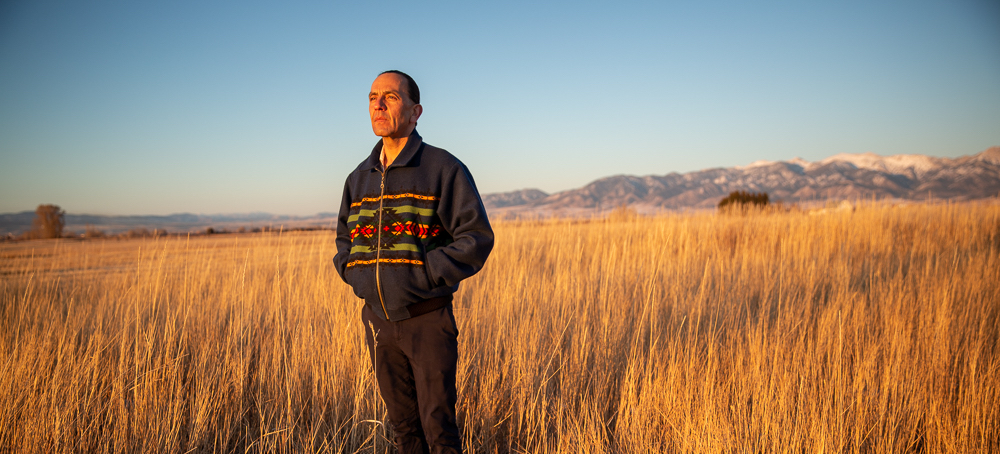
Shane Doyle is a Montana-based scholar, teacher, and community advocate whose work focuses on the history and heritage of Native American tribes of the Northern Great Plains. Shane is an enrolled member of the Apsáalooke Nation (also known as the Crow Tribe), and he holds a doctorate in Curriculum and Instruction from Montana State University. His unique personal and professional experiences, combined with his deep curiosity and seemingly endless energy, have made Shane a well-known leader in many fields, including education, land use advocacy, and the arts.
Shane grew up in Crow Agency, Montana, and he did not have an interest in history until college, when a road trip with a professor opened his eyes to Montana’s rich Native American past. From that moment onward, Shane’s curiosity has continued to grow, and he has built his career around making Native American history a cultural mainstay in everything from Montana’s educational system to governmental land management decisions. Whether designing educational curriculums, making films, or singing Northern Plains tribal music, Shane is always focused on serving his community.
Whether you’re a long-time listener or this is your first episode, I know you’ll enjoy getting to know Shane. We started out discussing his youth on the Crow reservation, and he talks about that fateful road trip when he fell in love with history. We talk about his family and the important life lessons that he learned from his grandmother. We discuss the history of the Apsáalooke, and the importance of the Crazy Mountains from a cultural and historical perspective. We also discuss his consulting business Native Nexus, some of his film projects, and his plans for the future. And Shane obviously has plenty of excellent book recommendations, so be sure to check out the episode notes for links to all of those.
As you’ll hear in this conversation, Shane is doing so much excellent work and has many more projects in the pipeline. I’ll look forward to a part 2 with Shane in the future so we can hear updates on everything that he’s working on. Hope you enjoy!
Photos courtesy of Shane Doyle.
—
Download on Apple Podcasts
—
Download on Spotify
—
Download on Google Podcasts
—
Download on Overcast
—
This episode is brought to you by The Arthur M. Blank Family Foundation and its Montana-based AMB West Philanthropies, both of which embody the values-based approach to philanthropy and business of their Chairman Arthur M. Blank
EPISODE NOTES
Topics Discussed:
- 3:15 – Shane’s childhood and how he pursued Indigenous history in his youth
- 7:45 – Shane describes how he engaged in studying the Indigenous history of Montana
- 10:30 – Shane discusses Asaalooke Nation history
- 14:30 – Shane discusses his thoughts regarding a history of broken treaties
- 18:15 – Shane talks about the service element of his work
- 21:00 – Shane discusses the significance of the Crazy Mountain Range, including his own experience fasting in that mountain range
- 27:15 – Shane explains regularity of his meditation ceremonies
- 30:15 – Shane mentions some resources for people interested in Northern Plains Indigenous culture
- 34:00 – Shane discusses the book he is writing, Messages from Medicine Wheel Country
- 38:00 – Shane talks about his film regarding the Crazy Mountains
- 41:45 – Shane explains how folks can get involved in the protection of the Crazy Mountains
- 43:30 – Shane discusses his business, Native Nexus
- 47:15 – Shane talks about where he thinks his career is going next
- 51:45 – Shane’s book recommendations
- 55:45 – Shane’s film recommendations, as well as some films he feels less enthusiastic about
- 1:01:30 – Shane’s parting words of wisdom
Information Referenced:
- Arthur M. Blank Family Foundation
- AMB West Philanthropies
- Apsáalooke Nation (Crow Tribe)
- Film: Awaxaawippíia: The Crow Nation’s Sacred Ties
- Crazy Mountains
- Native Nexus
- Crow Agency, MT
- Little Bighorn River
- Battle of Little Bighorn
- Flathead Lake
- Blackfeet Nation
- Cheyenne Nation
- Lakota Nation
- Confederated Salish and Kootenai Tribes of the Flathead Reservation
- Bighorn Range
- Musselshell, MT
- Black Hills
- Three Forks Headwaters of the Missouri River
- Fort Laramie
- Virginia City
- Plenty Coups
- John G. Neihardt
- Joseph Medicine Crow
- Alma Hogan Snell
- Sun Dance
- Sweat Lodge
- Frederick E. Hoxie
- Elliot West
- Fred W. Voget
- Little Big Man
- The Outlaw Josey Wales
- Reservation Dogs
- The Revenant
- Killers of the Flower Moon
- Osage Nation
- James Welch
- Frederick Voget Lefthand
- Nathaniel Philbrick
Enjoy this episode? Then you might like these too:
- Marci McLean & Cora Neumann on COVID’s Impact on Native Communities
- Chris Douglas – An Unexpected Artistic Journey
- Juanita Vero, Part 2 – A Deep Desire to Serve
- Becky Edwards – Amplifying the Power of Women in the West
- Rachel VandeVoort – Harnessing the Power of Outdoor Recreation
- Hal Herring – A Man of Words & Wild Places
- Antonia Malchik – Exploring Culture & Complexity
- Len Necefer – Indigenous Advocate
- Callan Wink – A New Voice for the New West
Antonia Malchik – Exploring Culture & Complexity
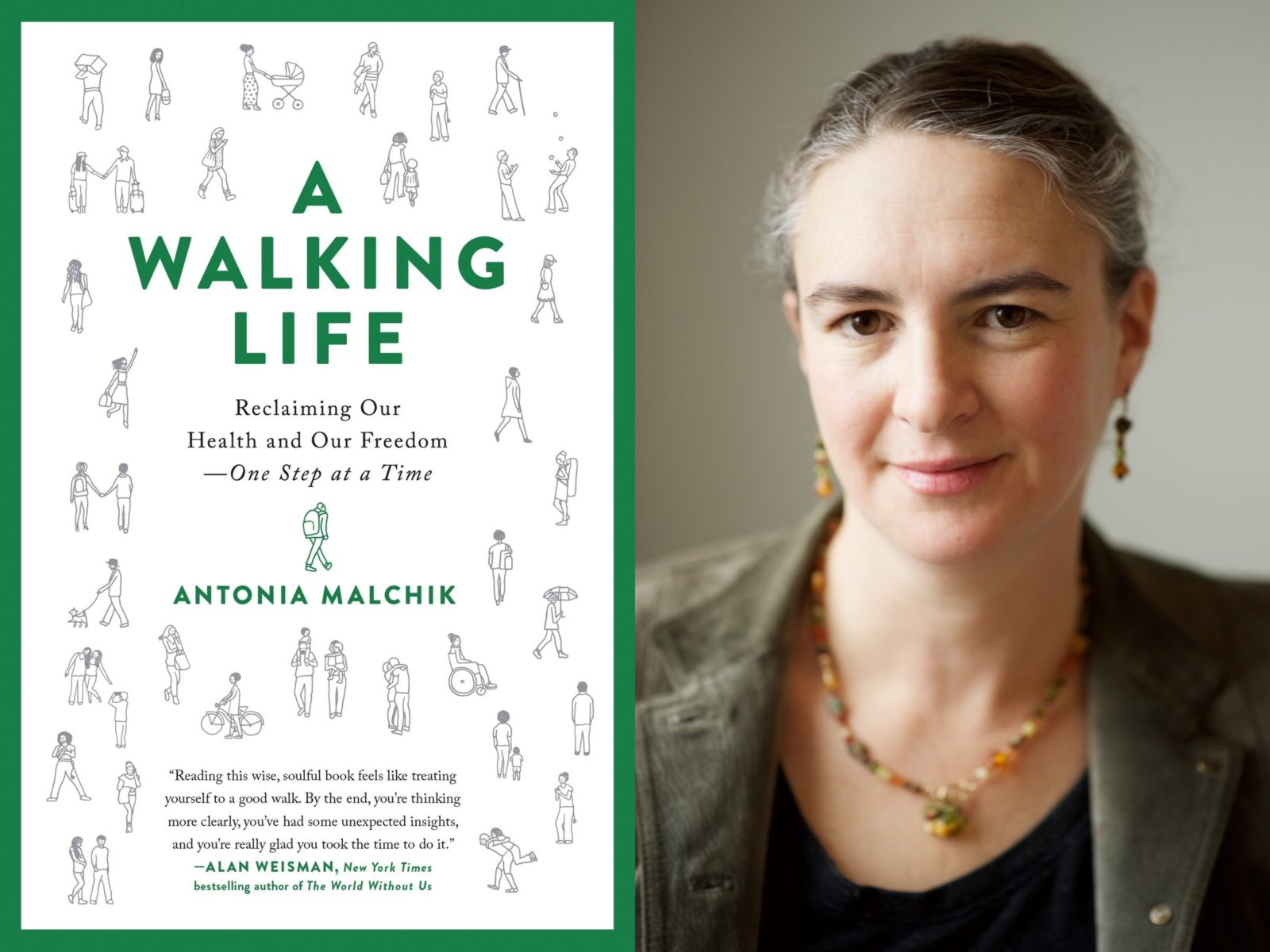
Antonia Malchik is a Montana-based writer and essayist, and she’s also the author of the book A Walking Life: Reclaiming Our Health and Freedom One Step at a Time. She has written for publications including The Atlantic and High Country News, she also writes a regular Substack newsletter titled On the Commons, which I highly recommend. Antonia thinks deeply about a wide range of topics, including community, conservation, the environment, private property, the West, books, and more. She has a true talent for writing about complex subjects in an engaging, in-depth manner that both educates and challenges the reader.
Antonia grew up in northwest Montana– her mother was a multigenerational Montanan and her father was a first-generation immigrant from the former Soviet Union. Her family heritage combined with her innate curiosity gave Antonia a unique perspective on the world that informs all of her work. She has lived in Moscow, Vienna, Australia, and other far-flung regions, but she has always been drawn back to the landscapes of her home state of Montana, where she currently lives with her husband and two children.
I’ve been a long-time fan of Antonia’s work, so it was a pleasure to finally have her join me on the podcast. Just as her work covers a broad range of topics, so does this conversation– we discuss everything from Russian history to her Montana ancestors to her long-standing commitment to the craft of writing. We talk about why she has chosen to not participate in social media, and how she manages to consume online news and media without becoming overwhelmed. We talk a lot about her writing process, her thoughts on publishing her work, and her approach to exploring and writing about potentially controversial ideas. We obviously talk about her book A Walking Life, as well as how the act of walking can contribute to strong communities, mental health, and physical well-being. And finally, Antonia is known for her excellent book recommendations, and she offers up some great ones– be sure to check the episode notes for links to all the books and authors she mentions.
I thoroughly enjoyed this conversation and can’t thank Antonia enough for all of her hard work. Hope you enjoy.
Header photo of Antonia Malchik by Lindsey Jane Photography.
—
Download on Apple Podcasts
—
Download on Spotify
—
Download on Google Podcasts
—
Download on Overcast
—
EPISODE NOTES
Topics Discussed:
- 5:00 – Antonia explains why she was left on the streets of Moscow and told not to get lost.
- 8:45 – Antonia reflects on moving to a completely different culture during a time when international relations were tense.
- 14:15 – Antonia recommends resources for understanding Russian history.
- 18:15 – Antonia reflects on the Montana side of her family and on the idea of pioneering.
- 23:00 – Antonia explains how and why she chooses to write.
- 27:45 – Antonia explores how she puts potentially controversial ideas out into the digital commons as well as explains when she decides to engage with people who disagree with her and comment on her writing.
- 31:30 – Despite anxiety regarding putting her work out for public viewership, Antonia reflects on why she still writes.
- 35:30 – Antonia and Ed discuss creating for the sake of continuing to create and the merits of not waiting for permission to create.
- 43:15 – Antonia explains, as a curious person, how she controls the constant influx of information that can occur through social and informational media.
- 49:00 – Antonia discusses her book, A Walking Life.
- 55:15 – Antonia talks about walking as it relates to mental health.
- 1:07:45 – Antonia’s favorite books about the West.
- 1:15:30 – Antonia’s parting words of wisdom.
Information Referenced:
- Antonia Malchik
- Joseph Stalin
- Soviet Union
- Berlin Wall
- Mikhail Gorbachev
- Burlingame, CA
- Leningrad
- Cold War
- Natasha’s Dance
- The Siege of Leningrad
- The 900 Days
- Anna Reid
- Svetlana Alexievich
- Geoffrey Hosking
- Lesley Chamberlain
- Hedrick Smith
- Brendan Leonard
- Semi-Rad
- Whitefish, MT
- High Country News
- Bill Bryson
- Lunch Ticket
- Orange County, NY
- Rachel VandeVoort
- Peter Norton
- Cal Newport
- Beyond the 100th Meridian
- John Wesley Powell
- Melissa Sevigny
- Katherine Schultz
- Willa Cather
- Joe Wilkins
- Alexis Bonogofsky
- Plenty Coups Chief of the Crows
- Alan Weisman
- H. Emerson Blake
- Jeremy Lent
- Douglas Rushkoff
- Dr. David Hewitt
Enjoy this episode? Then you might like these too:
- Chandra Brown – Fostering Creativity Through River Adventures
- Alexis Bonogofsky – Taking a Stand for the West
- Heather Hansman – Demystifying Water in the West
- Morgan Irons – Finding Her Muse
- Live in Bozeman – Cate Havstad, Jillian Lukiwski, Becca Skinner & Juanita Vero
- Kate Kavanaugh – Regeneration & Restoration
- Jessica Ilalaole – Creating Home in the High Desert
- Anna Brones – Committed to Creativity
- Iris Gardner – Living with Intention
Nickolas Butler – The Craft of Creativity
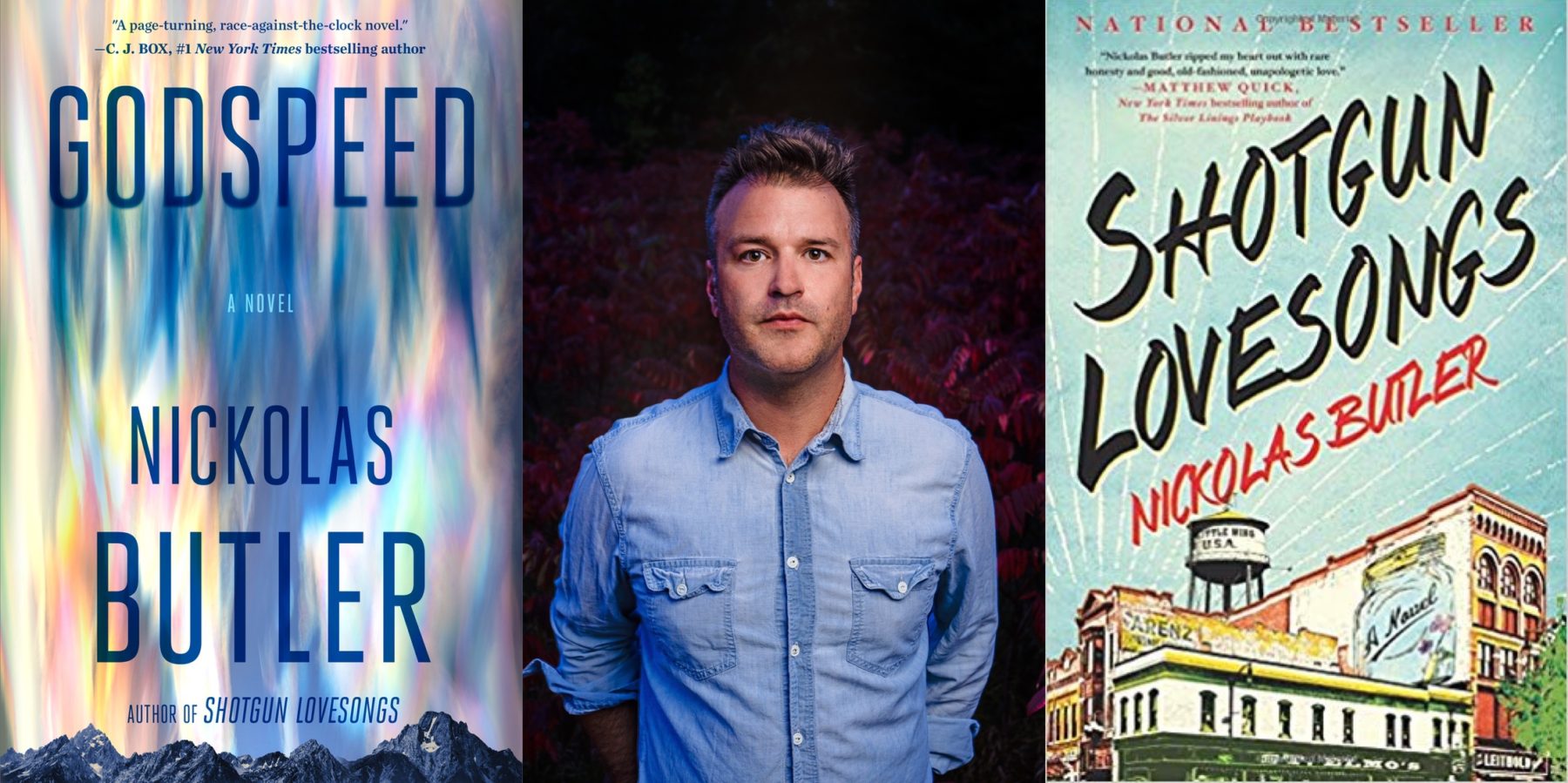
Nickolas Butler is an award-winning writer and novelist who has published five books, one of which is the wildly popular, award-winning Shotgun Love Songs. His most recent novel is titled Godspeed— a fast-paced, thriller of a book that is set in and around Jackson Hole, Wyoming. While the novel has all of the components that make for a great story– action, suspense, wild landscapes, complex characters– it also touches on many of the challenges facing the modern-day West, including income inequality and rural gentrification. From the first page of Godspeed, I was hooked, and I stayed up way too late for several nights in a row finishing the book.
For all of Nick’s accomplishments as a novelist, his path to becoming a full-time writer was not an easy one, nor was he an overnight success. He spent many years working a variety of jobs, including as a telemarketer, meatpacker, and Burger King maintenance man. And as you’ll hear him discuss in this conversation, it was during his stint working as a liquor store clerk that he decided to fully commit to the craft and profession of writing. Fast forward to today, and his focus, commitment, and hard work have paid off– not only is he a successful full-time writer, but also a devoted husband and father of two.
Nick and I recorded this conversation just a few days after the publication of Godspeed. I was lucky enough to read an advanced copy of the book prior to our conversation, and I can’t say enough great things about it. So we obviously talked a lot about the book– his process for writing it, how the book highlights present-day challenges facing the West, and how he went about developing the plot and the characters. We discussed his journey as a writer and artist– how and why he views writing as a craft, the importance of hard work, and how he keeps his competitive fire burning, even after experiencing so much success. We also talk a lot about family and community, which are two subjects that Nick and I are both very passionate about. And finally, Nick offers up a ton of excellent book and author recommendations, as well as some wise parting words.
Big thanks to the great writer, angler, and past podcast guest Chris Dombrowski for introducing me to Nick. Check the episode notes for the full list of everything we discuss and links to all of the books and authors that nick mentions. And I encourage you to pick up a copy of Godspeed— you’ll love it.
Photos courtesy of Nickolas Butler
—
Download on Apple Podcasts
—
Download on Spotify
—
Download on Google Podcasts
—
Download on Overcast
—
EPISODE NOTES
Topics Discussed:
- 4:00 – Nickolas compares his most recent book release with his first release.
- 9:30 – Nickolas discusses how he handles reviews of his work
- 13:45 – Nickolas explains how he balances creating art with treating writing as a job, like a craftmaker
- 16:00 – Nickolas discusses his most recent novel, Godspeed, and how the story came to him
- 21:00 – Nickolas talks about the process of a story gathering in his mind, and generally how long it takes.
- 22:30 – Nickolas discusses how he comes to know a place to write about it so well.
- 25:45 – Nickolas reads a passage from Godspeed and explores the challenges surrounding housing in the West and beyond.
- 32:00 – Nickolas explores the way he crafts stories in his writing, and how it leads to empathy in his most recent novel.
- 36:45 – Nickolas describes the role of meth and addiction in Godspeed.
- 38:30 – Nickolas talks through the pace and process of writing Godspeed.
- 41:15 – Nickolas discusses some of his current projects.
- 42:45 – Nickolas looks back on his career before being a writer.
- 49:30 – Nickolas discusses his transition from early career to writing career.
- 52:15 – Nickolas talks about how he keeps his “fire going” in his career.
- 55:00 – Nickolas talks about teaching work ethic to his children.
- 58:00 – Nickolas identifies his literary icons.
- 1:00:45 – Nickolas’s favorite books about the West.
- 1:03:00 – Nickolas’s parting words of wisdom.
Information Referenced:
- Nickolas Butler
- Chris Dombrowski
- Marcus Burke
- Pretty Woman
- Coldplay
- James Ellen McPhearson
- Peter Heller
- Michael Perry
- Eau Claire, WI
- Jackson, WY
- Lord of the Flies
- John Larison
- Upper Arkansas River Valley
- Ethan Canin
- Pushed Out: Contested Development and Rural Gentrification in the US West
- The Eau Claire Leader Telegram
- Oscar Mayer
- Rick Bass
- Stephen King
- Marilyn Robinson
- Jim Harrison
- The UP (Upper Peninsula)
- Annie Proulx
- Tom McGowen
- Legends of the Fall
- Treasure of the Sierra Madre
- Ken Kesey
- CJ Box
- David James Duncan
Enjoy this episode? Then you might like these too:
- Chris Dombrowski – Words, Water & the West
- Peter Heller – Chasing the Flow
- Heather Hansman – Demystifying Water in the West
- Hampton Sides – Live at the Aspen Institute
- David Gessner, Part 2 – Ambition, Art, and Arête
- Sara Dant – A Deep Dive Into the History of the West
- Alexis Bonogofsky – Taking a Stand for the West
- Monte Burke – Exploring Obsession
- Chris Burkard – The Art of Suffering
Nicole Morgenthau – Curiosity & Creativity
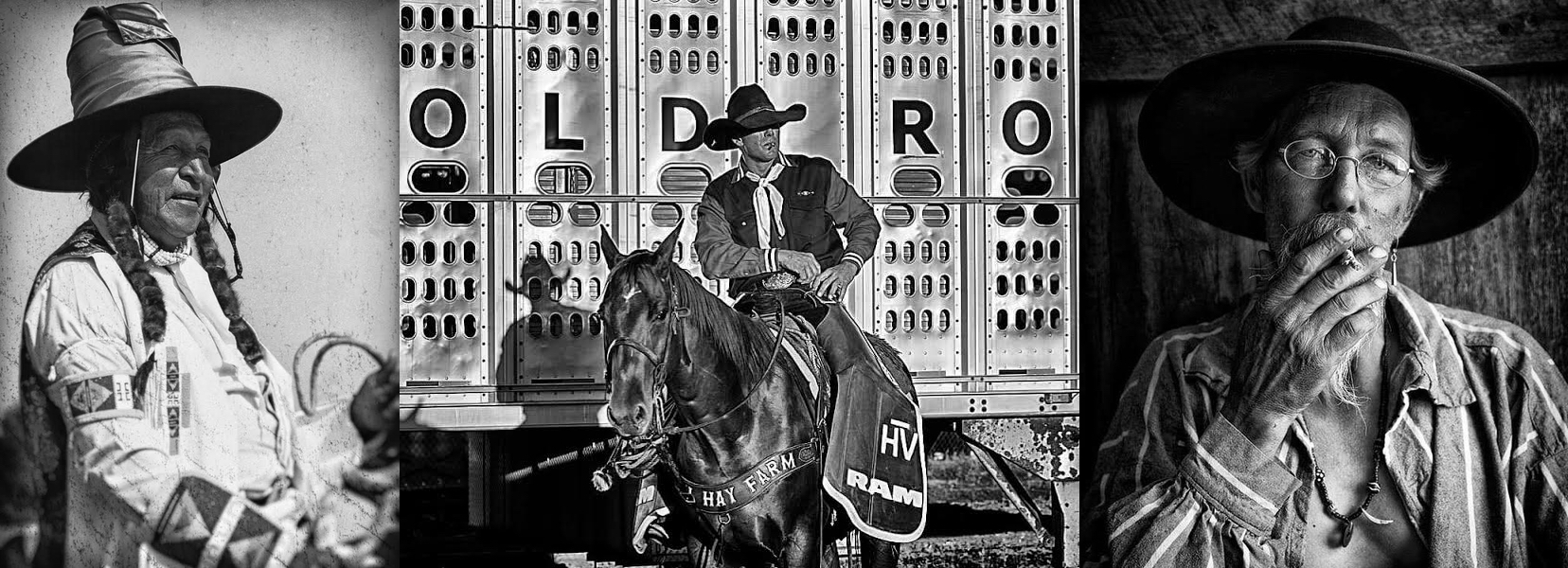
Nicole Morgenthau – Curiosity & Creativity
Nicole Morgenthau is a Utah-based professional photographer whose work depicts the people and places of the American West in a completely unique, one-of-a-kind style. While she has been involved in many aspects of the photography business throughout her career, Nicole may be best known for her portraits of a wide range of western characters– from cowgirls to mountain men, from professional athletes to mountain-town ski bums. And her creative pursuits don’t stop with photography– Nicole is also the owner of Sandstone Sky Jewelry, a business in which she makes and curates a variety of stunning jewelry, much of which has its creative roots in Native American culture.
Nicole was born and raised on the east coast, just outside of New York City. As a kid, she loved western movies and dreamed of moving out of the humid New Jersey suburbs and into wide-open, arid landscapes of the American West. After high school, she made the move West for college, first in Colorado and then to Montana State, where she studied photography. And immediately after graduating, she dove headfirst into the photography business, first as an assistant to several commercial photographers and then as her own boss. Since then, her work has been featured by well-known brands such as Patagonia, Outside, Men’s Journal, the New York Times, and more.
Nicole and I connected a few weeks ago and had an insightful discussion about everything from the photography business to jewelry making to overcoming creative blocks. We started out by discussing her childhood in New Jersey, her desire to move West, and how she decided to take that leap. We then talked about her journey as a professional photographer– the ups and downs, the evolution of the business, and how she found her voice as a portrait photographer. We talked about her jewelry business and how it compliments photography, both creatively and financially. And toward the end, she offers up some excellent music recommendations, wise parting words, and an inspiring quote from Anthony Bourdain that I think you’ll appreciate.
Be sure the check the episode notes for links to all the people and places Nicole mentions. This was a fun chat, and I hope you enjoy.
All photos by Nicole Morgenthau
—
Download on Apple Podcasts
—
Download on Spotify
—
Download on Google Podcasts
—
Download on Overcast
—
EPISODE NOTES
Topics Discussed:
- 3:30 – Growing up in New Jersey
- 5:30 – First trip to the West
- 7:30 – Decision to attend college in the West
- 9:00 – Childhood beginnings in art and creativity
- 10:45 – Nicoles first years in professional photography
- 12:30 – Working as an assistant
- 14:00 – Going out on her own
- 18:00 – Importance of toughness
- 19:00 – Finding her “voice” as a photographer
- 24:00 – What’s the key to good portrait photography
- 26:30 – Photography influences
- 28:45 – The evolution of her photography
- 31:30 – Nicole’s jewelry business, Sandstone Sky Jewelry
- 37:00 – Inspiring interactions while making jewelry
- 39:30 – Techniques for remaining calm despite being Type A
- 42:000 – Musical influences
- 45:00 – Advice to aspiring creatives
- 50:00 – Upside of education and workshops
- 54:00 – Parting words of wisdom
- 59:30 – Parting quote
Information Referenced:
- Nicole Morgenthau
- Sandstone Sky Jewelry
- Andy Anderson
- Mountain Man Rendevouz
- Edward Curtis
- Sally Mann
- Mark Tucker
- Chris Douglas
- Chris Douglas podcast episode
- Shiprock, NM
- Navajo Nation
- Cody Jinks
- Avett Brothers
- Macduff Everton
- Four Corners
- Anthony Bourdain
Enjoy this episode? Then you might like these too:
- Chris Douglas – An Unexpected Artistic Journey
- Chris Burkard – The Art of Suffering
- Anna Brones – Committed to Creativity
- Jillian Lukiwski – Art and Adventure in the American West
- Jessica Ilalaole – Creating Home in the High Desert
- Jessica Lewis – Doing More With Less
- Ivan McClellan – A New Look at the Old West
- Iris Gardner – Living with Intention
Adam Gall – A Reverence for Wildlife & Wild Places
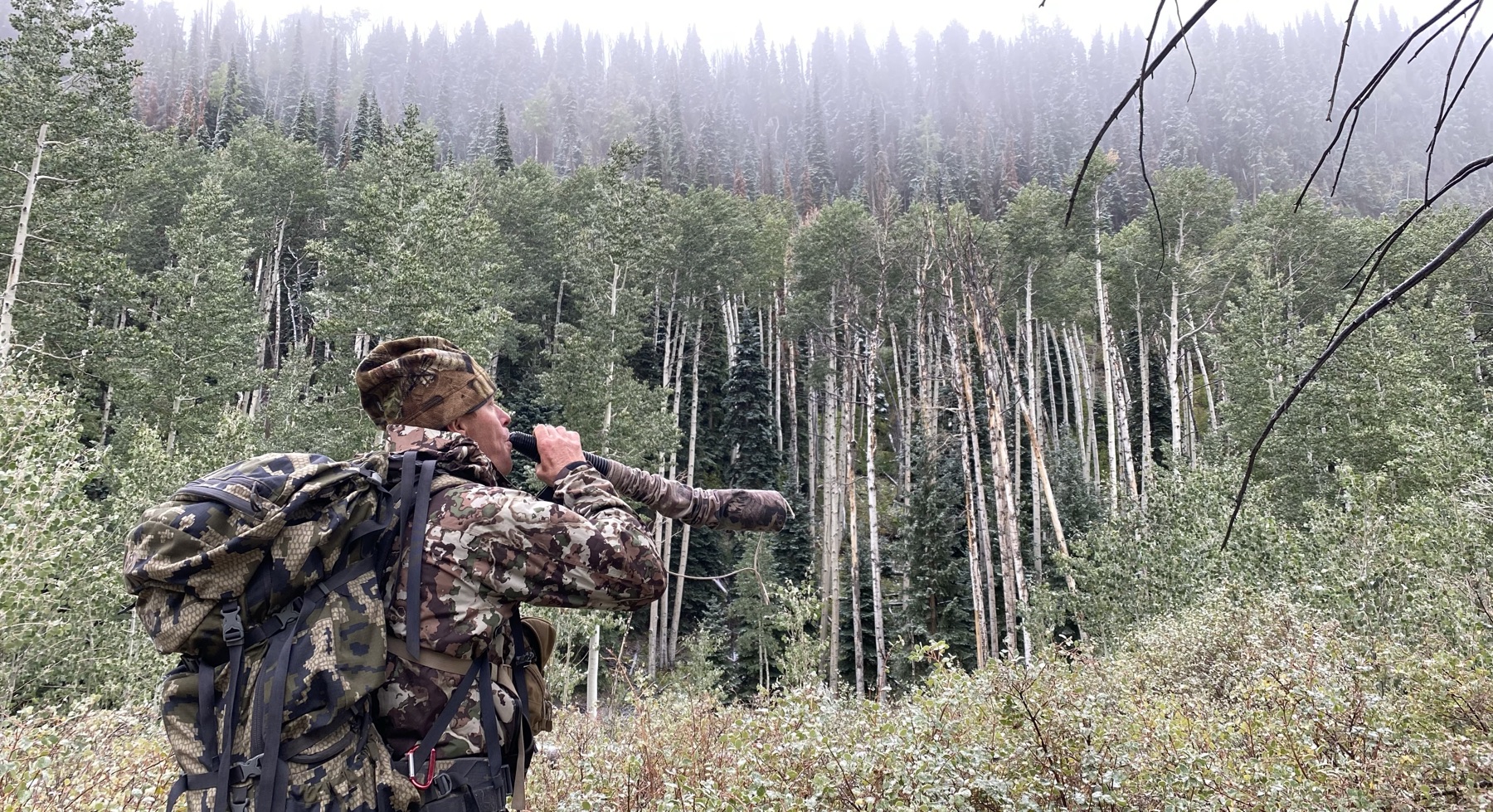
Adam Gall is a hunting guide and owner of Timber to Table Guide Service, a guiding company focused on helping hunters of all skill levels put wild, healthy, and delicious meat on their tables. Based out of the small town of Hotchkiss on Colorado’s Western Slope, Timber to Table offers multi-day hunts on both public and private lands, offering top-notch instruction on everything from the intricacies of elk hunting to the technical skills needed to properly and efficiently process the meat. Adam is highly regarded by many of my friends and past podcast guests and praised as an outside-the-box thinker, so I’m thrilled to finally have him join me for a conversation.
Adam’s professional background gives him a unique perspective on wildlife, land management, and wild places in the American West– he worked as a wildland firefighter, a wolf biologist, and a high school science teacher before devoting himself to full-time guiding. He has also been involved in a variety of volunteer initiatives, ranging from leadership positions with groups like Backcountry Hunters and Anglers to advisory roles on issues such as the wolf reintroduction in Colorado. As you’ll hear in our conversation, Adam thinks deeply and independently on a wide range of land and wildlife issues, and he offers his ideas respectfully and thoughtfully– something we could all use a little more of these days.
I connected with Adam while he was on a family vacation in rural Montana, and we had a wide-ranging conversation that we probably could’ve continued for hours. We started out chatting about his upbringing in Michigan and how he fell in love with hunting despite coming from a family of non-hunters. We talked about Timber to Table– how the guide service came to be, the challenges of running his own business, and his commitment to ethical hunting practices. We talked a lot about wolves and the wolf reintroduction in Colorado, and Adam offered some new thoughts that differ from some of my past podcast guests. He also describes the skills needed to be a great hunter, recommends some of his favorite books, and offers some wise parting words.
This was a thought-provoking conversation that provided a new perspective for me on several important topics, so I hope you enjoy it.
Photo courtesy of Adam Gall
—
Download on Apple Podcasts
—
Download on Spotify
—
Download on Google Podcasts
—
Download on Overcast
EPISODE NOTES
Topics Discussed:
- 3:30 – Adam talks about where he grew up
- 9:45 – Adam explains how hunting became a part of his life
- 12:30 – Adam describes his guide service, Timber to Table Guided Service, which provides an educational and holistic hunting and butchering experience
- 19:30 – Adam talks about balancing his work and home life
- 23:30 – Adam talks about how he got into wolf biology prior to his guiding work and dives into the controversy that surrounds them
- 39:15 – Adam discusses his role in the Stakeholder Advisory Group as a part of Colorado Parks and Wildlife’s wolf reintroduction work
- 44:30 – Adam’s resources for learning more about wolves
- 47:00 – Adam gives advice on how to get started in hunting
- 52:45 – Adam discusses what makes an excellent hunter
- 57:15 – Adam’s book recommendations
- 1:02:30 – Adam’s parting words of wisdom
Information Referenced:
- Timber to Table Guide Service
- Chris Dombrowski
- Callan Wink
- Steven Rinella
- Sagebrush Rebellion
- Lolo Pass
- Nez Perce Tribe
- Mike Phillips
- Ted Turner
- Colorado wolf reintroduction legislation (CO Proposition 114)
- Carter Niemeyer
- Mike Jiminez
- Doug Smith
- Dan Flores
- Rick Bass
- Dave Meches
- Carter Niemeyer
- Randy Newberg
- Cory Jacobsen
- Backcountry Hunters and Anglers
- R3 Programs
- Barry Lopez
- Chris Dombrowski
- James Galvin
- Allan Eckert
Enjoy this episode? Then you might like these too:
- Hal Herring – A Man of Words & Wild Places
- Chris Dombrowski – Words, Water & the West
- Mike Phillips – Audacious Goals, Relentless Action
- Kate Kavanaugh – Regeneration & Restoration
- Gabe Vasquez – Advocate for Equity in the Outdoors
- Mark Kenyon – A Passion for Public Lands
- Becca Aceto – Forging Her Own Path in the West
- Rachel VandeVoort – Harnessing the Power of Outdoor Recreation
John Branch – Seeking the Extraordinary in the Ordinary
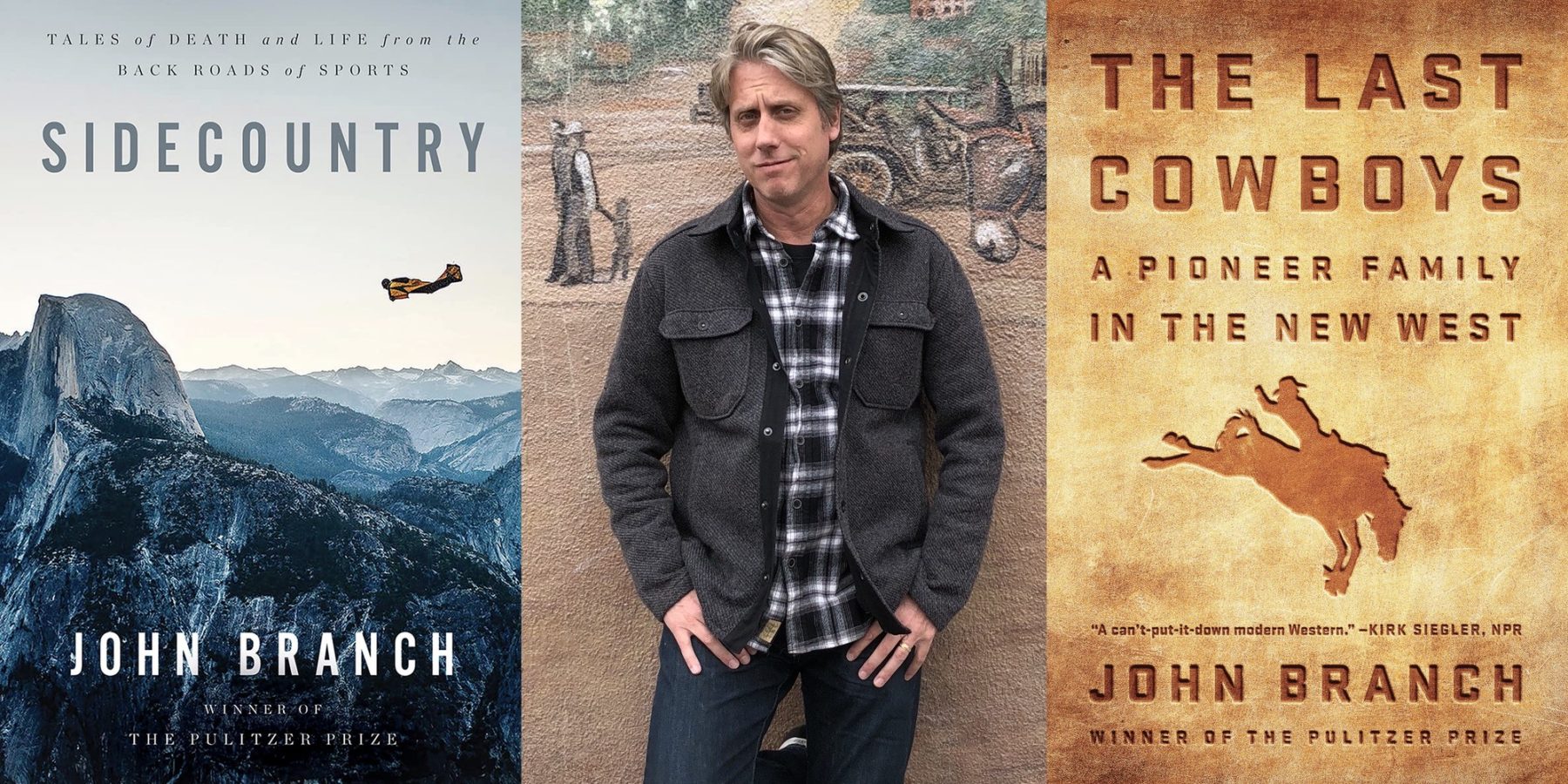
John Branch is a Pulitzer-prize-winning journalist with the New York Times and the author of the brand new book Sidecountry: Tales of Death and Life from the Back Roads of Sports. He is also the author of The Last Cowboys: A Pioneer Family in the New West, which is one of my favorite books about the modern-day challenges facing ranching families in the American West. Whether he’s reporting on the historic ascent of the Dawn Wall on Yosemite’s El Capitan, reconstructing a deadly avalanche in the Washington backcountry, or describing the financial realities of the cattle ranching business, John’s has one of the most unique and engaging voices you’ll find anywhere in print.
Growing up in Colorado, John never had serious childhood dreams about a career in writing or journalism. He studied business at CU Boulder and graduated fully focused on pursuing jobs in the business world. But after several years of building a successful career with retail-focused companies, John found himself dreaming of a career as a writer. So, in the mid-1990s, with minimal writing experience under his belt, he applied to graduate school, was accepted, and officially began his journey as a journalist. Fast forward to 2013, and John won the Pulitzer Prize for his New York Times article titled Snow Fall: The Avalanche at Tunnel Creek.
In our modern-day, frenetic world that is overflowing with articles and information, I’ve found that John’s work rises above the fray and sticks with me for many years after my first reading. While he has reported on many well-known sports figures such as Tommy Caldwell or even Kobe Bryant, John says he enjoys finding meaning in less-flashy tales, telling the stories of “ordinary people tangled up in something extraordinary.” So in this conversation, we talk about his commitment to uncovering these little-known stories– from his on-the-ground reporting to his process of sitting down at the keyboard to write. We also dig into some of his favorite outdoor-related stories, his new book Sidecountry and his older book The Last Cowboys, and his unconventional path into journalism. We talk about reporting from the top of El Capitan, his process of writing Snow Fall, his heroes and mentors, and much more. Finally, John offers up some great book and music recommendations, and well as timely advice for aspiring creatives.
I’ve been a fan of John’s for many years, so I can’t thank him enough for taking the time to chat with me. I encourage you to find copies of Sidecountry and The Last Cowboys, and keep an eye out for everything he writes for the Times. Check the notes for links to everything we discuss. Hope you enjoy!
Photo courtesy of John Branch
—
Download on Apple Podcasts
—
Download on Spotify
—
Download on Google Podcasts
—
Download on Overcast
EPISODE NOTES
Topics Discussed:
- 4:30 – John discusses his childhood, education, and career shift from business to journalism
- 10:00 – John discusses his family’s reaction to his change in career
- 11:15 – John explains how he ended up in Colorado Springs
- 12:00 – John describes his climb through the journalism world
- 14:30 – John explains how he caught the attention of the New York Times
- 16:30 – John explains why he feels his career transition worked
- 19:00 – John describes the kind of stories he looks to tell in his writing and how he knows when there is a story in front of him worth digging into
- 25:00 – John explains how he builds trust with the subjects of his stories
- 27:00 – John describes his most recent book, Side County
- 32:15 – John describes his writing process
- 38:30 – John describes his editing process and explains how he still gets nervous about submitting his work
- 43:15 – John talks about the importance of journalism now more than ever
- 46:15 – John talks about how he manages the constant influx of information in his job
- 48:45 – John talks about his ideal writing environment
- 50:00 – John identifies several of his writing heroes/role models
- 53:00 – John talks about how he differentiates between which stories should be told in articles and which should be told in books
- 56:15 – John discusses his musical tastes
- 59:00 – John’s parting words of wisdom
Information Referenced:
- John Branch
- John on Twitter and Instagram
- Sidecountry: Tales of Death and Life from the Back Roads of Sports
- The Last Cowboys: A Pioneer Family in the New West
- Zima
- Colorado Springs Gazette
- New York Times
- Snow Fall
- Stevens Pass
- ‘Battling’ Up a Sheer Yosemite Face, Seizing a Dream, Not a Rope
- Tommy Caldwell
- Jay Bilas
- John Prine
- Dan Barry
- Barry Lopez
- Paul Theroux
- Larry McMurtry
- Louis L’Amour
- The Avett Brothers
- Gin Blossoms
- Smashing Pumpkins
- Counting Crows
- The Kooks
- The Coral
- Tom Petty
Enjoy this episode? Then you might like these too:
- Heather Hansman – Demystifying Water in the West
- Monte Burke – Exploring Obsession
- Brendan Leonard, Part 2 – On Running, Creating, and Other Irrational Passions
- Steve Casimiro – Voice of Adventure
- Chris Burkard – The Art of Suffering
- Anna Brones – Committed to Creativity
- Emilene Ostlind – Storytelling for the New West
- Alexis Bonogofsky – Taking a Stand for the West
- Sara Dant – A Deep Dive Into the History of the West
Matt Barber & Joel Doub, Part 2 – Tales from an Entrepreneurial Adventure
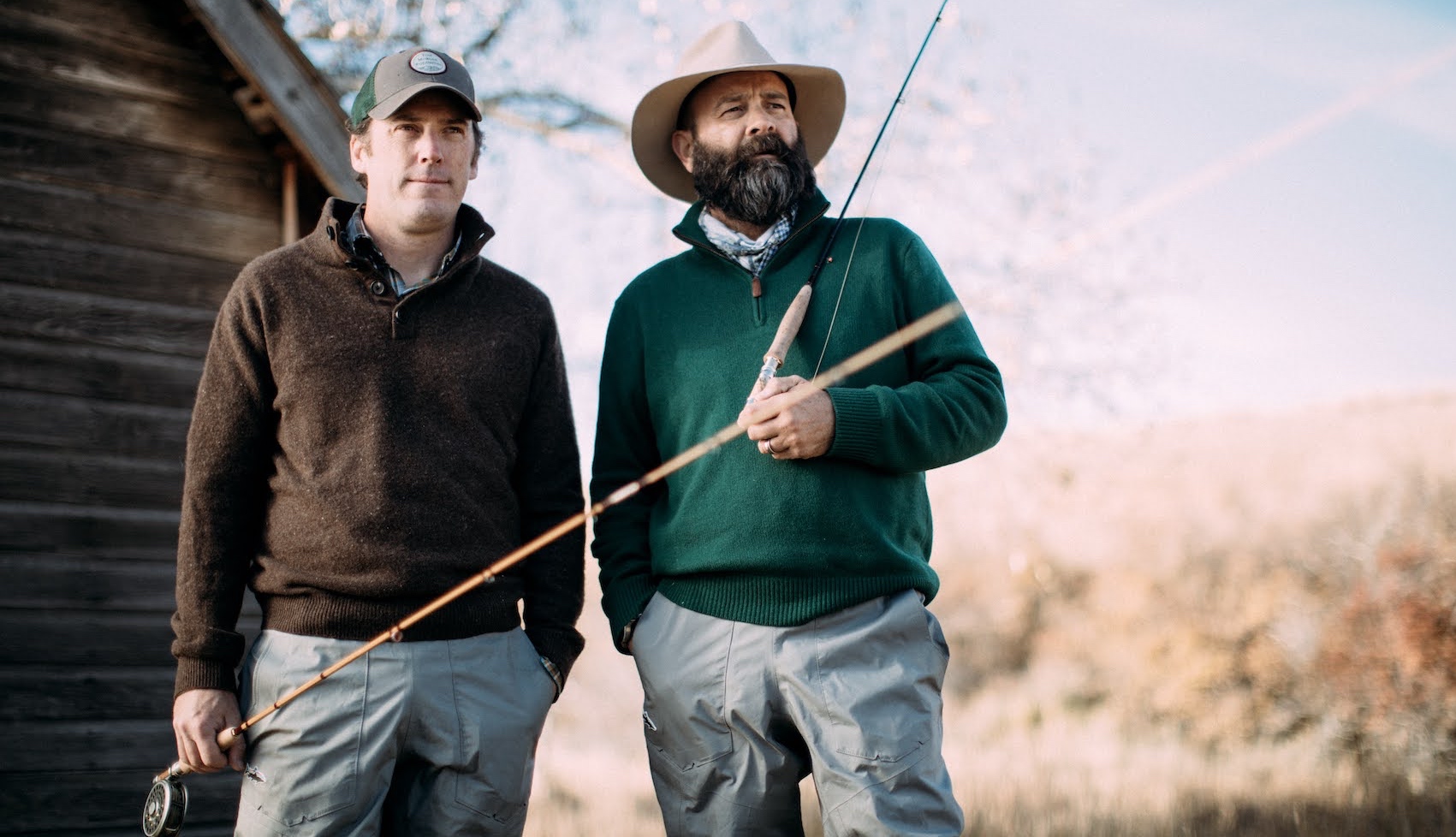
Matt Barber and Joel Doub are the owners of Tom Morgan Rodsmiths, one of the West’s most renowned custom fly rod companies. I was introduced to Matt and Joel nearly three and half years ago and was quickly fascinated by their entrepreneurial journey and Tom Morgan Rodsmiths’ storied history in the fly fishing world. As longtime listeners may remember, I recorded a podcast with Matt and Joel in January of 2018, about a year after they had purchased the company from Tom and Gerri Morgan. In that conversation we talked in-depth about the history of the company, Matt and Joel’s unconventional backgrounds, and their plans for the future of TMR– it was a fun conversation that led to a great friendship between all of us.
But in the more than three years since I published that episode, Tom Morgan Rodsmiths has grown in size and scope, and Matt and Joel have continued to evolve as business owners. They’ve enjoyed highs that include being featured in the New York Times and steadily growing their sales year over year. But they’ve also faced unexpected challenges, most notably a global pandemic and its far-reaching supply chain and economic effects. But thanks to their creativity, planning, complementary skill sets, and unwavering commitment to the values of the founders Tom and Gerri Morgan, Matt and Joel have thrived as entrepreneurs and built wonderful lives for their families in Montana.
A quick, one-time snapshot of any entrepreneurial venture can never provide the full, vivid story of a company and its owners, so I wanted to bring Matt and Joel back on the podcast to give us an update and share some of their hard-earned wisdom and lessons learned. We talked a bit about the specifics of the fly fishing business, but most of the topics we discussed were around resilience, teamwork, marketing, managing complex work, and maintaining a positive attitude– actionable advice that almost anyone could put to use in business or creative endeavors. You don’t need to listen to our first episode to glean value from this one, but it’s worth a listen too, so there’s a link in the notes to access that episode if you’d like.
Be sure to check out the Tom Morgan Rodsmiths website and follow them on social media– links to everything are in the notes. They will be celebrating the company’s 25th anniversary in the coming weeks and offering some special, one-of-a-kind products that will be of interest to anglers and outdoor enthusiasts of all stripes. Thanks to Matt and Joel for the inspiring conversation, and I hope you enjoy.
Header photo by Paolo Marchesi
—
Download on Apple Podcasts
—
Download on Spotify
—
Download on Google Podcasts
—
Download on Overcast
EPISODE NOTES
Topics Discussed:
- 4:30 – Introduction to Matt and Joel
- 11:30 – Update on the progress of Tom Morgan Rodsmiths
- 16:15 – Matt and Joel discuss the benefits and challenges of co-owning a business
- 12:15 – Matt and Joel discuss how they navigate owning Tom Morgan Rodsmiths while respecting the legacy of its founders
- 27:45 – Matt and Joel talk about the coverage they received from the New York Times
- 31:45 – Matt and Joel explain their thoughts and practice of marketing their products
- 38:15 – How Matt and Joel stay organized to manage the many, many challenges of running a business
- 49:30 – Matt and Joel discuss generosity in their work and lives
- 53:15 – Matt and Joel talk about living in Montana, having recently moved there
- 56:15 – Matt and Joel’s book recommendations
- 58:45 – Matt and Joel’s parting words of wisdom
Information Referenced:
- Tom Morgan Rodsmiths
- Previous M&P episode
- Saint Lawrence University
- Suez Canal
- Techstars
- Cal Newport
- 10 Percent Happier
- Vipassana
- Waking Up
- Malcolm Brooks
- Callan Wink
- John Larison
- Mattew Crawford
- Joe Haldeman
Enjoy this episode? Then you might like these too:
- Max Wenerstrom – Timeless Craftsmanship
- Kelsey Johnson – Chasing Her Artistic Ambitions
- Chris Douglas – An Unexpected Artistic Journey
- Kate Kavanaugh – Regeneration & Restoration
- Chris Burkard – The Art of Suffering
- Live in Bozeman – Cate Havstad, Jillian Lukiwski, Becca Skinner & Juanita Vero
- Hal Herring – A Man of Words & Wild Places
- Mark Kenyon – A Passion for Public Lands
- Matt Skoglund – Adventures in Bison Ranching
Max Wenerstrom – Timeless Craftsmanship
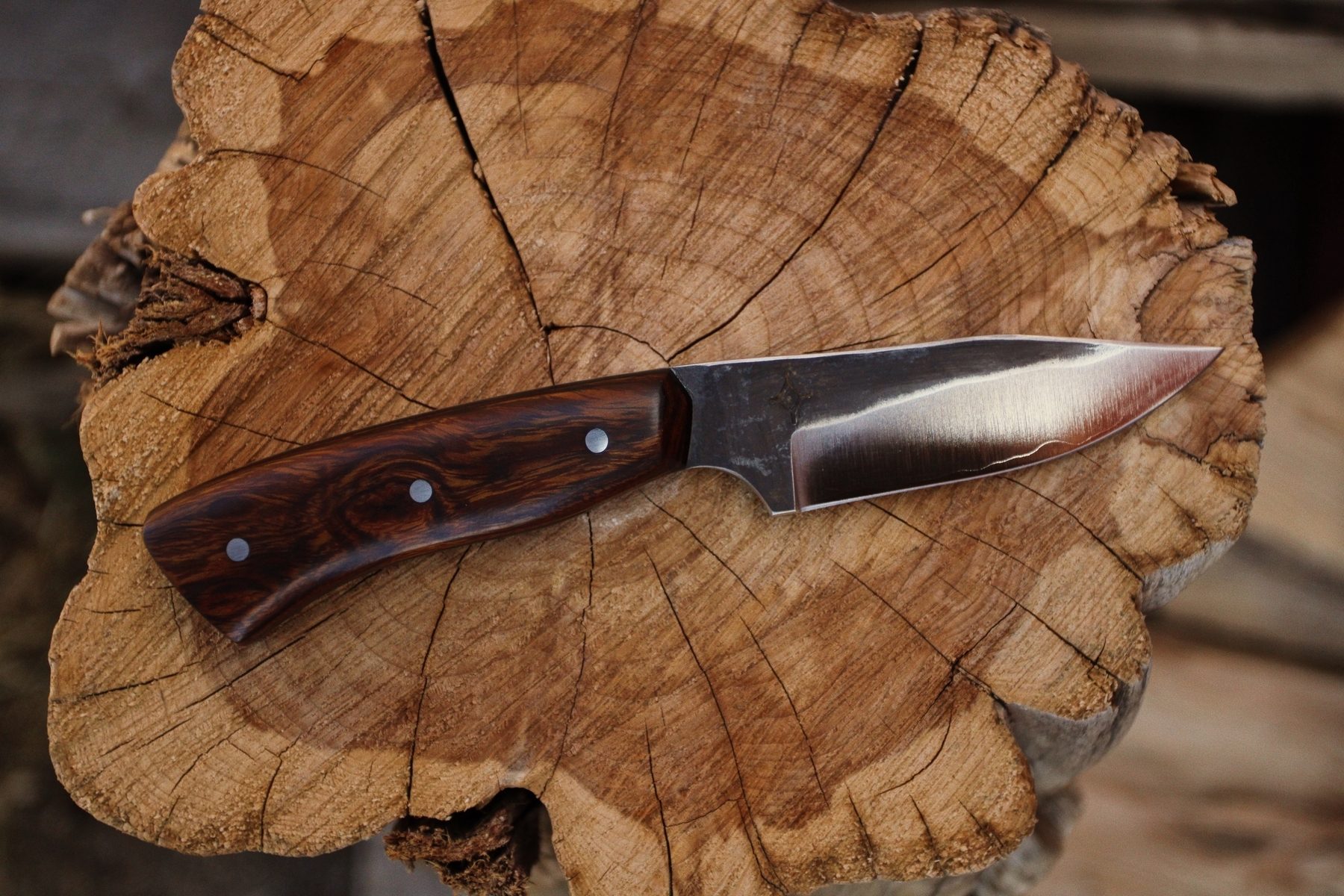
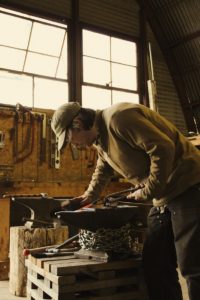
Max Wenerstrom is a blacksmith and craftsman best known for creating hand-forged knives that balance a beautiful aesthetic with practical durability. Max started blacksmithing at the age of 15, became obsessed with the craft, and quickly demonstrated an elite talent for creating one-of-a-kind knives. His passion led him to study under a 17th-generation Japanese bladesmith, who began teaching Max the art of forging knives in the Japanese tradition– a labor-intensive, time-honored method of creating some of the world’s sharpest and most durable knives.
I was introduced to Max by my friends at Ranchlands, one of the West’s most respected ranch management companies. Max was participating in a residency at Ranchlands’ 87,000-acre Chico Basin Ranch, where he was offering blacksmithing demonstrations and forging a specific model of knife developed in partnership with Ranchlands. It’s a knife created specifically for ranchers– designed to be used on horseback for everyday work and high-stakes situations. So when the folks at Ranchlands told me about Max, I drove out, and we sat down for an inspiring conversation.
Max is only 21 years old, and as you’ll hear in the interview, I was blown away by his maturity, work ethic, and commitment to quality. But aside from my endless amazement with his age, we covered a ton of interesting topics. We chatted about his beginnings in the craft, and what led him to study with world-famous Japanese bladesmith Murray Carter. We discussed his dedication to creating the highest quality products, how he pushes himself to constantly improve his craft, and the hard work involved in both. We discuss how he started building his business during high school and how it has grown and evolved in recent years. We talked about his partnership with Ranchlands, the process of making a knife, his deep love of the West, and advice for anyone seeking to begin a deliberate practice of craftsmanship.
I really loved this conversation and appreciated Max taking the time to chat. Be sure to check out the episode notes for links to Max’s website and to the specific Ranchlands-inspired knife that we discussed. I hope you enjoy!
Photos by Claudia Landreville, courtesy of Ranchlands
—
Download on Apple Podcasts
—
Download on Spotify
—
Download on Google Podcasts
—
Download on Overcast
EPISODE NOTES
Topics Discussed:
- 3:15 – When Max started forging knives
- 11:35 – Why Max start smithing at such a young age
- 13:45 – When Max realized he had a talent for bladesmithing
- 16:30 – How Max ended up using his bladesmithing at Ranchlands
- 23:30 – Max discusses his mentality in bladesmithing, why he values quality in his knives, and how he pushes himself to improve his craft
- 26:00 – Max walks us through the process of making a knife
- 29:15 – Max talks about what you need if you are interested in starting bladesmithing
- 32:30 – Max discusses what made his teacher, Murray Carter, such a good teacher
- 34:15 – Max highlights other craft-makers he admires
- 37:30 – Max discusses his plans for the future of his craft
- 43:00 – Max discusses knife sharpening, care, and styles of knives
- 53:15 – Max identifies the West as a source of inspiration
- 1:00:45 – Max’s parting advice
Information Referenced:
- Wenerstrom Forge, LLC
- Murray Carter
- Carter Cutlery Journeyman Program
- Yoshimoto Bladesmithing
- Ranchlands
- Chico Basin Ranch
- Duke Phillips III
- Duke Phillips IV
- Neck Knives
- Field Knives
- Ranchlands-Inspired Remuda Knife
- Knife Anatomy
- Finger Choil
- Heel of the blade
- Alex Pole
- Seth Godin
- Whetstone
- Louis L’Amour
- Osaka
- Geoffrey Keating
Enjoy this episode? Then you might like these too:
- Duke Phillips III – A Vision for the New West
- Duke Phillips IV – Living with the Land
- Kate Kavanaugh – Regeneration & Restoration
- Chris Douglas – An Unexpected Artistic Journey
- Daniela Ibarra-Howell – Healing the Land Holistically
- Live in Bozeman – Cate Havstad, Jillian Lukiwski, Becca Skinner & Juanita Vero
- Jessica Lewis – Doing More With Less
Dr. David Hewitt – The Science of Wildlife Conservation
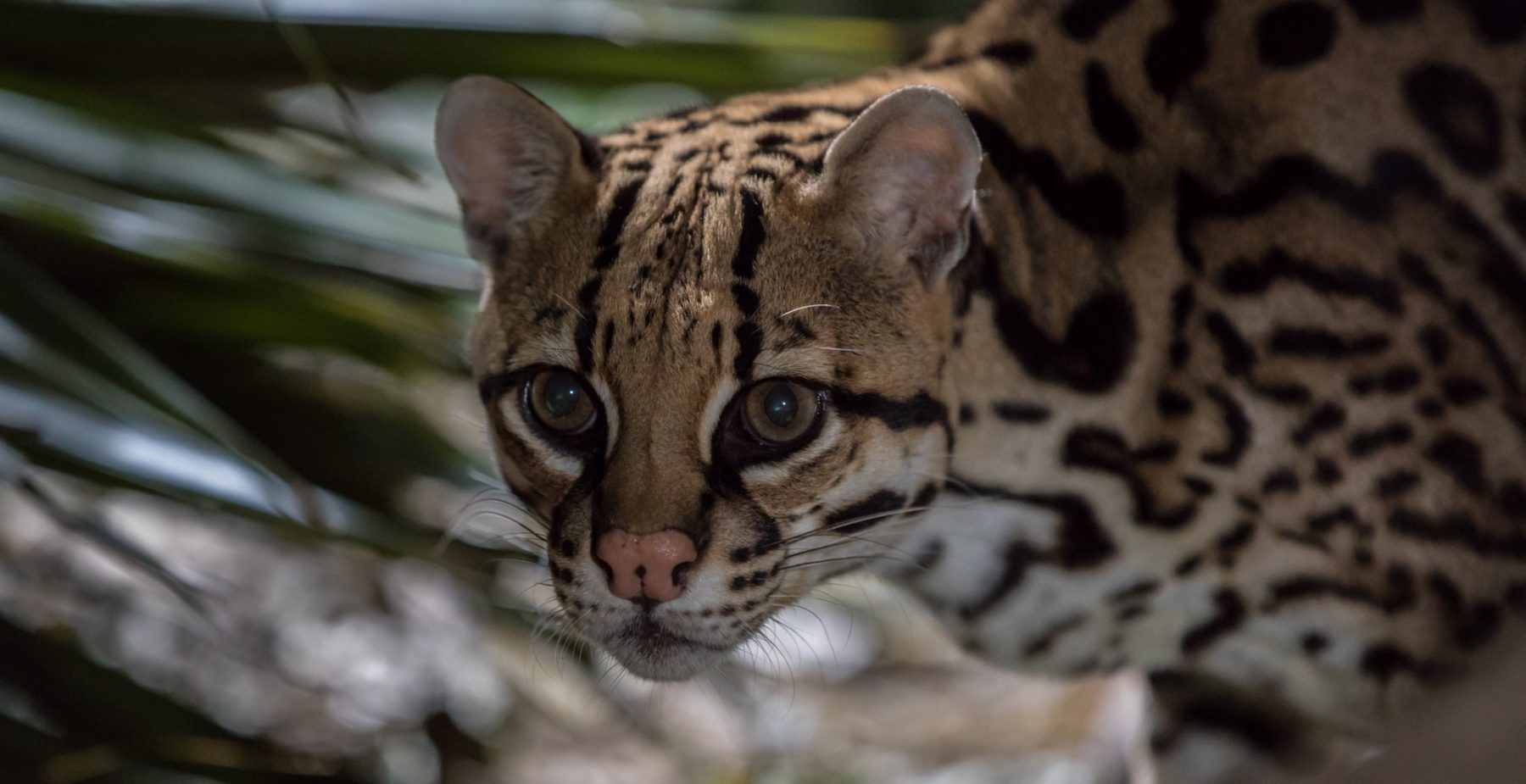
Dr. David Hewitt is the Executive Director of the Caesar Kleberg Wildlife Research Institute, an organization widely recognized as the leading wildlife research organization in Texas. The Institute is located on the campus of Texas A&M – Kingsville, and its mission is to provide science-based information for enhancing the conservation and management of Texas wildlife. Dave and his team at the Institute are focused on applied science– research that is useful, actionable, and tightly focused on helping land managers meet their goals.
Dave was born and raised in Colorado and followed in his grandfather’s footsteps to become a wildlife biologist. After earning his undergraduate degree from Colorado State, his education and research took him to many different corners of the United States, and in 1996 he landed at the Caesar Kleberg Wildlife Research Institute. For the past 25 years, Dave has been fully focused on the flora and fauna of Texas, and many of his projects have positive ripple effects on land management throughout the American West and beyond. Whether discussing the management of ocelot, restoration of native grasslands, or the history of the Institute, Dave’s enthusiasm for the natural world is palpable and inspiring.
Dave and I had a fun discussion about the Institute’s past, present, and future, as well as his fascinating career path. We started out discussing the Institute’s namesake, Caesar Kleberg, and why Caesar is known as the father of Texas wildlife conservation. We then discussed why the huge proportion of private land in Texas makes the state so unique from a land and wildlife management perspective. We also dug into several of the Institute’s success stories, including its work with ocelots and native grasses throughout the state. Then we chatted about Dave’s personal background– his impressive educational journey, his love of teaching, and his vision for the future of the Institute.
If you enjoy learning about wildlife, native plants, and the people who have devoted their lives to protecting them, then you’ll love this episode with Dave. There’s a ton of fascinating information in this conversation, so be sure to check out the episode notes for links to everything we discuss. Enjoy!
Ocelot photo by Ben Masters. Headshot courtesy of David Hewitt.
—
Download on Apple Podcasts
—
Download on Spotify
—
Download on Google Podcasts
—
Download on Overcast
—
This episode is brought to you in partnership with EXPLORE RANCHES
Explore Ranches was born out of a desire to share some of the most wild and scenic places in the world with others. We offer authentic outdoor experiences and access to charming ranch homes on some of the world’s least explored private lands. In return for enabling access to these natural treasures, we are making new connections between our guests and land owning partners. In the process, we are all contributing to a network of open space that not only benefits wildlife but the very food we eat, water we drink and air we breathe. Whether you are one of our guests, a ranch partner or one of our guides, at Explore Ranches we are all on an endless journey to find our place in the wild.
—
EPISODE NOTES
Topics Discussed:
- 5:00—Dave discusses the story of Caesar Kleberg.
- 14:00—Dave explains the differences between land management in Texas and states Colorado or Montana.
- 16:30—Dave explains the type of research that goes on at the Caesar Kleberg Wildlife Research Institute.
- 19:30—Dave discusses victories during his tenure with CKWRI.
- 22:30—Dave discusses building trust with private landowners in wildlife conservation.
- 24:45—Dave dives deeper into the CCWRI Ocelot Program.
- 32:00—Dave discusses the varied opinions regarding the Endangered Species Act.
- 37:45—Dave discusses the CKWRI Grasslands program.
- 47:00—Dave walks us through his career path.
- 53:30—Dave explains how he balances his research with his teaching.
- 57:00—Dave projects where he thinks the CKWRI is headed in the future.
- 1:00:30—Dave’s book recommendations.
- 1:03:00—Dave’s parting words of wisdom.
Information Referenced:
- Dr. David G. Hewitt
- Caesar Kleberg Wildlife Research Institute
- Caesar Kleberg
- Cuero, TX
- Corpus Christi, TX
- Robert Kleberg
- King Ranch
- Texas Fish and Oyster Commission
- Richard Kleberg
- Caesar Kleberg Foundation for Wildlife Conservation
- Jay Kleberg
- Ferruginous Pygmy Owl
- Chihuahuan Desert
- Ocelot
- Dr. Micheal E. Tewes
- Laguna Atascosa Wildlife Refuge
- Yturria Ranch
- Raymondville, TX
- East Foundation
- Dr. Neil Wilkins
- Endangered Species Act (ESA)
- Old world bluestems
- Permian Basin
- Panhandle of Texas
- Eagle Ford Oil Clay
- Forbs (botany)
- Crowley County, CO
- Greeley, CO
- Uvalde, TX
- Fallow Deer
- Ruffed Grouse
- Tio Kleberg
- Dr. Duane Leach
- Andrea Wulf
- Dan Flores
Enjoy this episode? Then you might like these too:
- Teal Blake – On Being Authentic & Original
- Duke Phillips III – A Vision for the New West
- Duke Phillips IV – Living with the Land
- James Decker – Inspired Leadership in the New West
- Sara Dant – A Deep Dive Into the History of the West
- Jay Kleberg – True Dedication to Conservation, Adventure & Texas
- Allison Ryan – Connecting People With Place
- Jesse Womack – Land Stewardship is in His Blood
- Gabe Vasquez – Advocate for Equity in the Outdoors
NEW WEST DISPATCH – Marci McLean & Cora Neumann on COVID’s Impact on Native Communities
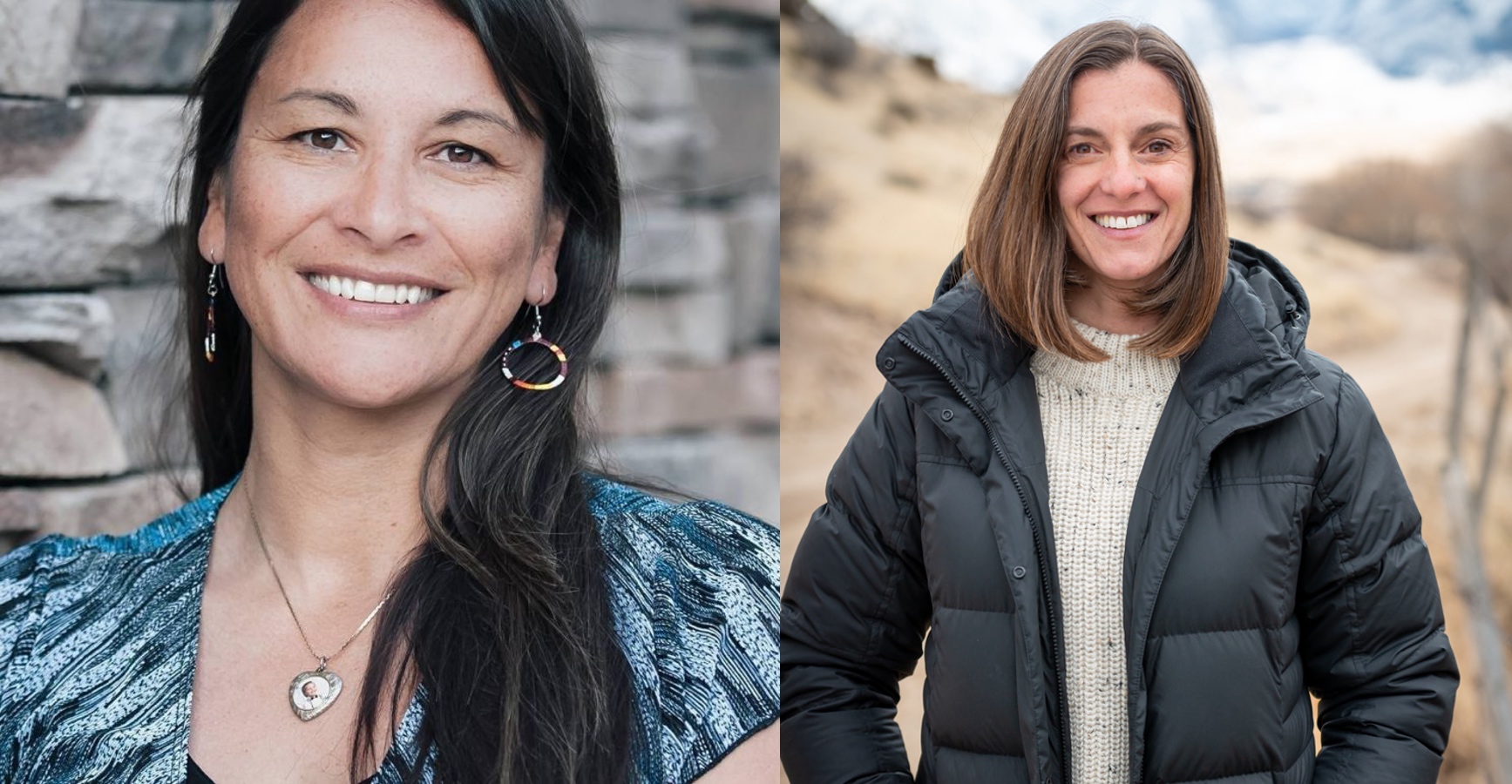
Marci McLean and Cora Neumann are joining me for another episode of my ongoing series called New West Dispatches. In each New West Dispatch, I break from the normal Mountain & Prairie format of discussing a guest’s personal experiences, influences, and life story, and instead we spend the hour diving deep into a specific, timely issue that is creating challenges in the American West. The goal of these episodes is to offer a clear-eyed examination of a pressing issue, then to highlight the people and ideas that are helping to solve these sometimes-overwhelming problems. These episodes are meant to educate and provide actionable information, while also offering hope and optimism in the face of challenges.
In today’s New West Dispatch, we’ll be discussing COVID’s impact on Native communities in Montana and throughout the American West. Marci and Cora are uniquely qualified to discuss this topic, as they have been on the front lines of Montana’s public health response to the devastating effects of COVID across tribal lands. Marci grew up on the Blackfeet Nation and currently serves as Executive Director of Montana Native Vote, an organization with the mission of building leaders in Montana’s Indian County. Cora Nuemann is a PhD-level public health expert and the founder of We Are Montana, an organization that supports public health leadership across rural and Native Montana. In early 2020, when it became clear that COVID was a true threat, Marci and Cora teamed up and took action, offering much-needed education, funding, and support to combat the virus in Native communities.
We had an enlightening and educational conversation, and I am so grateful to Marci and Cora for joining me to share their experiences and wisdom. We start out by discussing both Marci and Cora’s backgrounds, and how they decided to take action as the pandemic descended on Montana. We talk about the specific factors that made this pandemic so devastating to Native communities and why Native Americans suffered the highest death rates of any community in the United States. We discuss the Native response to the pandemic– what worked, what didn’t, and some specific success stories. And we also talk about vaccine rollout and how Marci and Cora see the next year playing out. Finally, they both offer up some excellent book recommendations on Native American history, culture, and current events.
The notes for this episode are even more robust than usual, so be sure to check them out for links to articles, resources, and further information on everything we cover. Thanks again to Marci and Cora for their hard work and focus on this important issue. I hope you enjoy and learn as much as I did!
Photos courtesy of Marci and Cora.
Download on Apple Podcasts
—
Download on Spotify
—
Download on Google Podcasts
—
Download on Overcast
—
EPISODE NOTES
Topics Discussed:
- 4:00 – Introductions
- 13: 15 – When did Cora and Marci know when COVID was going to be a big impact on their communities
- 20:45 – What worked in communicating public health in Cora and Marci’s community
- 24:00 – Reflections on how Indigenous communities responded to information coming from the Trump administration regarding COVID
- 27:15 – Why Indigenous communities are so vulnerable in pandemic scenarios like COVID
- 33:45 – Cora and Marci discuss the extensive work they have done in and around Indigenous communities in Montana regarding public health and COVID.
- 40:30 – The vaccine rollout progress in and around Indigenous Montana communities
- 42:00 – How do we get to the new normal
- 43:30 – How can people help in these efforts
- 47:45 – Book recommendations
- 51:15 – Parting words of wisdom
Information Referenced:
- COVID impacts on Indigenous Americans
- COVID impacts on Indigenous people in Montana
- Coverage of Cora and Marci’s work
- The 19th feature: As Montana’s tribal nations are threatened by COVID, women health leaders have stepped up
- Great Falls Tribune: Montana COVID-19 relief: Organizations help tribal communities
- Mansfield Center panel: Montana tribal leaders discuss fighting the pandemic | Local News | missoulian.com
- Intercept feature: Montana Tribes Hard-Hit by Covid-19 Brace for Republican Takeover Miranda Green
- Indian Country Today: Montana responds to local advocacy groups and adds American Indians in Phase 1B vaccine rollout
- Notes From The Field – COVID Local Blog – supporting Tribal leaders (this is work with the former White House pandemic team – who are now back in the White House!)
- New nonprofit aimed at tackling COVID-19 in Native, rural communities
- Social Media
- Vaccine rollout information:
- DPHHS report March 16th: Native Americans make up about 7% of Montana’s population, but represent 18% of reported COVID-19 related deaths in the state. COVID-19 was the 3rd leading cause of death in 2020.
- Blackfeet Nation is currently reporting 95% of eligible enrolled members are vaccinated—7,600 of 9,778
- More than 30% of the Crow Tribe’s eligible population had received at least one vaccine as of March 18.
- In Great Falls as of March 12, more than 75% of Indian Family Health Clinic (IFHC, an IHS-funded urban Indian organization) eligible patients had received their first dose of COVID-19 vaccine and 60% were fully immunized.
- Each week, the Centers for Disease Control and Prevention allocates COVID-19 vaccines to IHS, which then distributes them across their areas. IHS’ Billings-area location, which includes eleven Montana facilities, receives, on average, 1,200 Moderna doses, 1,170 Pfizer doses and 100 Johnson & Johnson doses each week. In the first eight weeks of distribution, every IHS site in Montana had a 100% vaccination rate, meaning no shots were wasted. So far, the IHS facilities across Montana have administered at least one dose to 29% of the eligible population, and 21% of the eligible IHS population is fully immunized.
- Blackfeet (Niitsitapi or Siksikaitsitapi)
- Medicaid expansion
- Two-spirit
- Montana Native Vote
- We Are Montana
- Indigenous Movements Interchange
- Elizabeth Cameron
- Crow Nation (Apsáalooke)
- Ember Singer
- CSKT Tribal Health
- Incident Command Center
- Food Sovereignty
- Roxanne Dunbar-Ortiz
- Percy Bullchild, Woody Kipp
- Sherman Alexie
- Joy Harjo
- Louise Erdrich
- David Treuer
- Chris La Tray
- One-Sentence Journal
- Becoming Little Shell (upcoming)
- Nick Estes
- Robin Wall Kimmerer
- Ruth Lister
- Jesmyn Ward
- Geoffrey Rose
- Paul Offit
Enjoy this episode? Then you might like these too:
- NEW WEST DISPATCH: Matt Skoglund – Ranching in the Age of COVID
- Juanita Vero, Part 2 – A Deep Desire to Serve
- Becky Edwards – Amplifying the Power of Women in the West
- Chris La Tray – Rediscovering His Past, Writing His Future
- Ivan McClellan – A New Look at the Old West
- Gabe Vasquez – Advocate for Equity in the Outdoors
- Len Necefer – Indigenous Advocate
- Carlos Fernandez – The Power of Partnerships
Brendan Leonard, Part 2 – On Running, Creating, and Other Irrational Passions
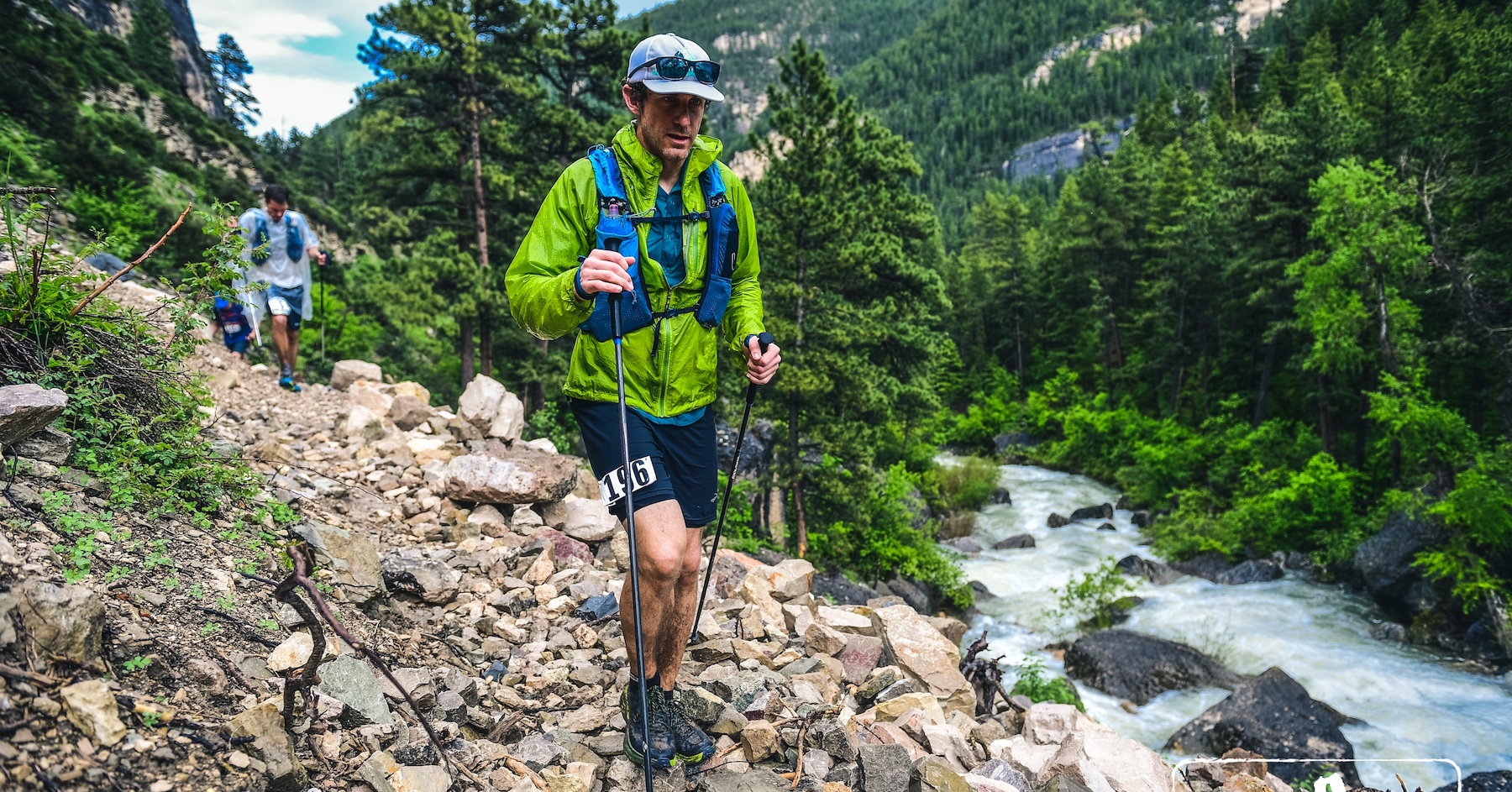
Brendan Leonard is a prolific writer and artist who is best known as the creator of Semi-Rad.com. He’s also the author of a brand new book titled I Hate Running and You Can Too: How to Get Started, Keep Going, and Make Sense of an Irrational Passion. The book offers motivation and witty insights into the sometimes-crazy pastime of running. And Brendan knows a thing or two about running irrational distances– he’s completed multiple 100-mile ultramarathons, ran 52 marathons in 52 weeks, directed the film How to Run 100 Miles, and co-hosts the Off The Couch Podcast, which features interviews with runners of all stripes.
Through his books, filmmaking, and writing on Semi-Rad.com, Brendan offers a unique perspective into the world of outdoor recreation and adventure. Rather than focusing on the mind-blowing feats of super-elite athletes, Brendan’s work highlights the passion and determination of regular people who enjoy pushing themselves hard in the outdoors. Brendan has also perfected the ability to draw larger life lessons from these outdoor adventures– lessons that can be applied to creative endeavors of any kind. You don’t have to be a runner or mountain athlete to glean actionable wisdom from Brendan’s work, and I personally credit Brendan’s influence with helping me to grow and evolve Mountain & Prairie.
Brendan and I connected a few days before the release of his new book and had a fun and wide-ranging conversation about everything from running to reading, from Ted Lasso to Matthew McConaughey. We started out by discussing his new book I Hate Running and You Can Too— how the book came to be, the process of writing it, and how its lessons can be applied to writing or other creative pursuits. We then discussed some of his own running achievements, including running 52 marathons over the course of 52 weeks and the life lessons he learned from that year-long commitment. We talked about the fallacy of looking for hacks in running or life, some of Brendan’s creative heroes, the importance of vulnerability, the process of finding his creative voice, recent good books, and much more.
If you’re the type of person who likes to push yourself creatively or physically, this episode is full of wisdom and insight that you can put to use immediately. I’d also encourage you to check out Brendan’s new book, and really all of his work– check out the links in the episode notes or just head to Semi-Rad.com. Huge thanks to Brendan, and I hope you enjoy.
Header image by Mile90 Photography; photo of Brendan and Rowlf courtesy of Brendan.
Download on Apple Podcasts
—
Download on Spotify
—
Download on Google Podcasts
—
Download on Overcast
—
EPISODE NOTES
Topics Discussed:
- 6:00 – Brendan discusses his latest book, I Hate Running and You Can Too
- 10:00 – Brendan discusses his progression as a runner
- 18:15 – Brendan talks about his experience running 52 marathons in 52 weeks
- 27:00 – The lessons Brendan learned from 52 marathon challenge
- 33:00 – Brendan explains how becoming a runner influenced other areas of his life
- 36:30 – Brendan discusses his claim that “there are no hacks” in running (or life)
- 42:00 – Who Brendan looks up to
- 50:30 – Brendan explores the process of finding his voice
- 55:30 – Brendan discusses vulnerability and the process of sharing his own experiences in his writing
- 1:02:30 – Brendan’s book recommendations
- 1:07:30 – Brendan’s parting words of wisdom
Information Referenced:
- Brendan Leonard
- On Instagram
- I Hate Running and You Can Too
- Sixty Meters to Anywhere
- The Camping Life (co-authored by Forrest Woodward)
- How to Run 100 Miles
- Off the Couch Podcast (co-hosted by Johnathan Ellsworth)
- Thanks for 10 years OR Finding A Voice
- Brendan’s first M&P episode
- Austin Kleon
- Run Rabbit Run
- Colfax Marathon
- Missoula Marathon
- New York City Marathon
- Strava
- Amelia Boone
- Ronny Coleman
- James Lucas
- The Voice
- American Idol
- Tim Ferris
- Aaron Draplin
- Adam J. Kurtz
- Judy Blunt
- Melissa Maerz
- Jay Rubin, Haruki Murakami
- Craig Mod
- Kevin Barry
- Andrew Forbes
- Road House
- Ted Lasso
- Do the Right Thing
- Heat
Enjoy this episode? Then you might like these too:
- Mike Foote – Perfection Is In the Process
- Anna Brones – Committed to Creativity
- Steve Casimiro – Voice of Adventure
- Chandra Brown – Fostering Creativity Through River Adventures
- Monte Burke – Exploring Obsession
- William deBuys – Sage of the Southwest
- Chris Burkard – The Art of Suffering
- Chris La Tray – Rediscovering His Past, Writing His Future
- Morgan Irons – Finding Her Muse
- Heather Hansman – Demystifying Water in the West
Mitsu Iwasaki – Adventure, Advocacy, & Alpinism
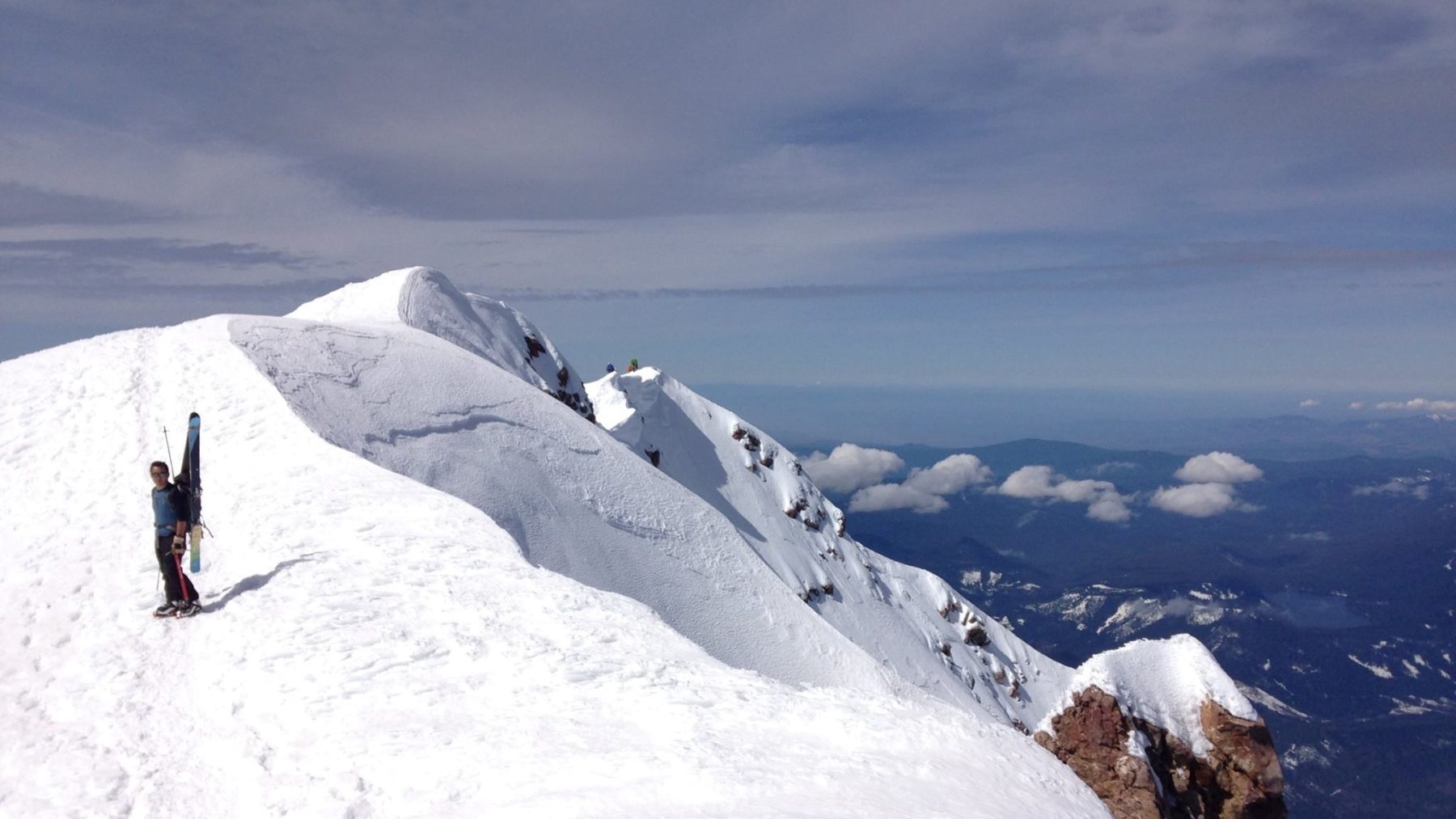
Mitsu Iwasaki is the CEO of the American Alpine Club (AAC), a historic and storied organization whose mission is to “share and support our passion for climbing and respect for the places we climb.” Founded in 1902, the AAC began as a social club for east coast elites who shared a passion for climbing, adventure, and conservation. But over the past 119 years, the AAC has evolved into an open and equitable organization, which provides “knowledge and inspiration, conservation and advocacy, and logistical support for the climbing community.” Mitsu took the helm of the AAC in the summer of 2020, ushering in a new phase for the Club’s growth and focus.
Mitsu was born in Japan but immigrated to Seattle with his family when he was six years old. In high school, at the urging of his father, Mitsu began spending his summers working on commercial fishing boats in Alaska, experiences that he credits as the genesis of his lifelong pursuit of adventure. He attended college in Washington State at the foot of the Cascade Mountains, then spent years as an Outward Bound instructor– successfully merging his love of climbing, skiing, and adventure with his career. A graduate degree in nonprofit management propelled Mitsu into leadership positions with several outdoor recreation organizations, which led him to his new role at the AAC.
For anyone interested in melding personal passions with lofty career aspirations, Mitsu’s life story will be both inspiring and instructional. We had a fascinating conservation covering everything from his days as a climber living out of his van to his current focus of creating more equitable access in the climbing community. We started by discussing the AAC– its history, goals, and evolution over nearly 120 years. We then talked about Mitsu’s personal background– moving to the US as a child, adjusting to life in the US while maintaining close connections to his Japanese heritage, lessons learned from working in commercial fishing, and experiences as an outdoor educator. We talk about his vision for the AAC, and he explains AAC’s exciting new equity initiative known as Climb United. We also discuss his mentors, favorite books, the best advice he’s ever received, and Mitsu offers some useful parting words of wisdom.
Be sure to check the episode note for a complete list of topics and links to everything we covered. Hope you enjoy.
Images courtesy of Mitsu Iwasaki
Download on Apple Podcasts
—
Download on Spotify
—
Download on Google Podcasts
—
Download on Overcast
—
EPISODE NOTES
Topics Discussed:
- 3:40 – Mitsu explains the history of American Alpine Club (AAC)
- 6:40 – Mitsu discusses programs and projects of AAC
- 9:25 – Mitsu discusses his role as CEO of AAC
- 12:10 – Mitsu explains some of his goals to adapt the AAC
- 14:10 – Mitsu discusses AAC’s work in the arena of climate change
- 19:10 –Mitsu discusses his early life and how he became interested in the outdoors, including his time spent on an Alaskan fishing boat
- 28:10 – Mitsu discusses his prior career with Outward Bound and his thoughts on experiential education
- 33:40 – Mitsu discusses his transition from outdoor enthusiast to executive
- 37:25 – Mitsu talks about his mentor, Brendan Leonard
- 41:25 – Mitsu talks about the AAC program, Climb United, and equity in the sport of climbing
- 48:55 – Mitsu’s book recommendations
- 52:25 – The best piece of advice Mitsu ever received
- 53:40 – Mitsu’s parting advice
Information Referenced:
- American Alpine Club
- International Climbing and Mountaineering Federation (UIAA)
- 10th Mountain Division
- 1939 attempt on K2
- 1963 first American expedition on Mt. Everest
- Glenn E. Porzak
- AAC Library
- Phil Powers
- Kamakura
- Shogun
- Bellevue, WA
- Anchorage, AK
- Naknek, AK
- Bristol Bay
- Chignik, AK
- Sebastian Junger
- Outward Bound
- National Outdoor Leadership School (NOLS)
- Brady Robinson
- Big City Mountaineers
- Brendan Leonard
- Climb United
- Leave No Trace (LNT)
- Marc Reisner
- Wallace Stegner
- Nina McConigley
Enjoy this episode? Then you might like these too:
- Mike Foote – Perfection Is In the Process
- Gabe Vasquez – Advocate for Equity in the Outdoors
- Jessica Wahl Turner – Outdoor Recreation & Rural Economies
- Chris Burkard – The Art of Suffering
- Kyle Richardson – Mountains & Music
- Rachel VandeVoort – Harnessing the Power of Outdoor Recreation
- Hal Herring – A Man of Words & Wild Places
- Juanita Vero, Part 2 – A Deep Desire to Serve
Jason Gardner – A Life of Purpose & Service
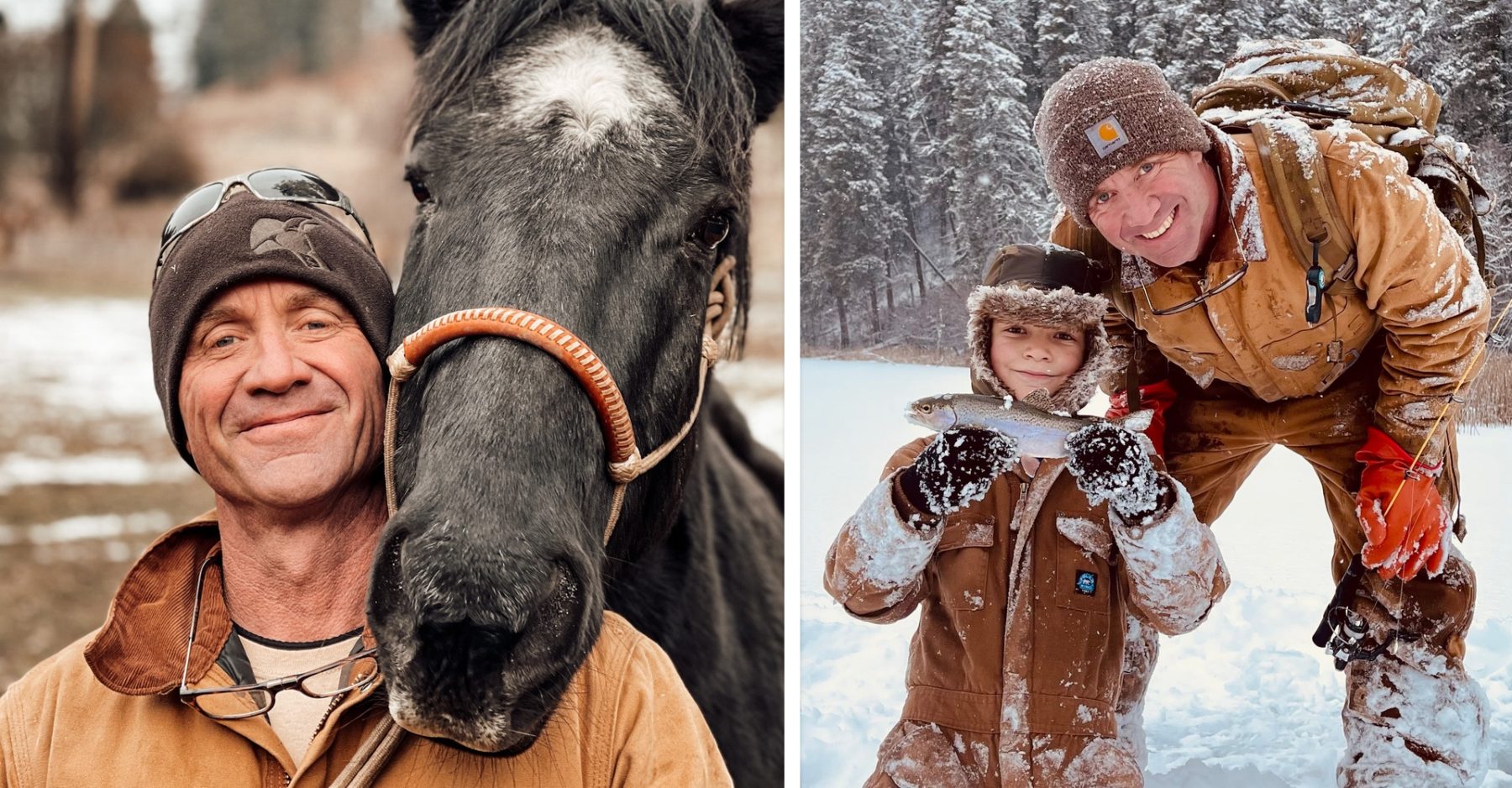
Jason Gardner is a father, homesteader, leadership instructor, and regenerative agriculture devotee who lives with his family on a remote property in the mountains of northeastern Washington State. Jason is also a retired Navy SEAL Master Chief who spent nearly thirty years in the SEAL teams and is a recipient of the Silver Star, two Bronze Stars, a Purple Heart, and numerous other awards. As you’ll hear in our conversation, Jason applies the lessons learned from his years of service toward building a meaningful life for his family in the wilds of Washington– a life lived with purpose and intention, built on a deep respect for the land.
If Jason sounds familiar, it’s because he’s the husband to Iris Gardner, who was a guest on the podcast just a few weeks ago. Given all of the wisdom that Iris shared regarding parenting and intentional living, and how fondly she spoke of Jason as a father and husband, I thought it would be fun to have Jason join me for a conversation. It was fascinating to hear Jason discuss many of the same topics that Iris and I covered, as he provided a complementary perspective on subjects including parenting, marriage, and thriving as a family in such a remote, wild region of the West.
This was a fantastic conversation, and I can’t thank Jason enough for taking the time to share his wisdom with me. We talked a lot about his military service– from his decision as a high-schooler to join the SEALs to his long and diverse career as a SEAL leader. We also discuss his life-long love of wild, mountainous places, and why he and Iris have chosen to raise their family in northeastern Washington. We talked about how to find purpose in work, no matter what your chosen career. We discuss the idea of having a warrior’s mentality and how he applies that idea to parenting and his current career as a leadership consultant. Jason explains the dichotomy of being an elite special forces operator and gentle father and husband. And we also talk about regenerative agriculture, the many life lessons he’s learned from training horses, influential music, his favorite books, the best advice he’s ever received, and much more.
There are so many insights and resources packed into this episode, so don’t forget to reference the episode notes for a full list of topics and links to everything we discussed. And if you’d like more insights into Jason and Iris’s life in Washington, you can check out their Youtube channel, which I’ve linked to in the notes. Thanks again to Jason, and I hope you enjoy.
Images courtesy of Jason Gardner
Download on Apple Podcasts
—
Download on Spotify
—
Download on Google Podcasts
—
Download on Overcast
—
EPISODE NOTES
Topics Discussed:
- 3:50 – Where Jason grew up
- 5:50 – How Jason developed a love of wild places
- 6:10 – When Jason first started considering military service and the SEALS
- 10:05 – How music helped frame Jason’s mindset
- 12:50 – Jason explores the dichotomy of his military and personal life
- 17:50 – What makes Jason so good at his job
- 19:20 – How Jason knew it was time to retire
- 23:20 – Jason explores the intentionality that enabled he and Iris to live the life they do
- 24:35 – How Jason’s approach to parenting has changed since retiring from the SEALS
- 28:20 – How did Jason come up with the points of To My Daughter
- 32:20 – What being a warrior means to Jason
- 34:35 – Jason explores how marriage works between two strong-willed individuals
- 37:50 – Jason discusses his recent work with horses and its impact on himself
- 43:50 – Jason’s advice on finding purpose, told through the lens of sniper training and “the stalk”
- 52:05 – Jason discusses his current role as a leadership coach
- 56:35 – Jason discusses books that have been important to him
- 58:05 – Jason discusses regenerative agriculture
- 1:01:05 – What Jason does for fun
- 1:02:50 – The best piece of advice Jason ever received
- 1:06:20 – Jason’s parting words of wisdom
Information Referenced:
- Jason Gardner on Instagram
- Jason’s motivational battle speech
- Iris Gardner
- Echelon Front
- Marin Corps Air Station El Toro
- San Clemente
- Camp Pendleton
- Okinawa (Kadena Air Base)
- Navy SEALS
- Marine Corps
- Hardcore (punk)
- Punk Rock
- Metallica
- Dead Kennedys
- Cro-Mags
- Minor Threat
- Uniform Choice
- Ill Repute
- Stalag 13
- Speed Metal
- Danheim
- Faun
- Wardruna
- Jocko Willink and Leif Babin
- Slayer
- Chris LeDoux
- To My Daughter
- Jocko Willink (podcast)
- Jordan Peterson
- Marcus Aurelius
- Larry McMurtry
- Akiva Silver
- Gabe Brown
- Joel Salatin
- The Daily Stoic
- Stoicism
- Jim Howell
- Dungeons and Dragons
- Jocko, “Good”
- Sisyphus
Enjoy this episode? Then you might like these as well:
- Iris Gardner – Living with Intention
- Chris Douglas – An Unexpected Artistic Journey
- Chris Burkard – The Art of Suffering
- George Hodgin – Mission-Driven Entrepreneur
- Daniela Ibarra-Howell – Healing the Land Holistically
- Kate Kavanaugh – Regeneration & Restoration
- Matt Skoglund – Adventures in Bison Ranching
- Hampton Sides – Live at the Aspen Institute
Kelsey Johnson – Chasing Her Artistic Ambitions
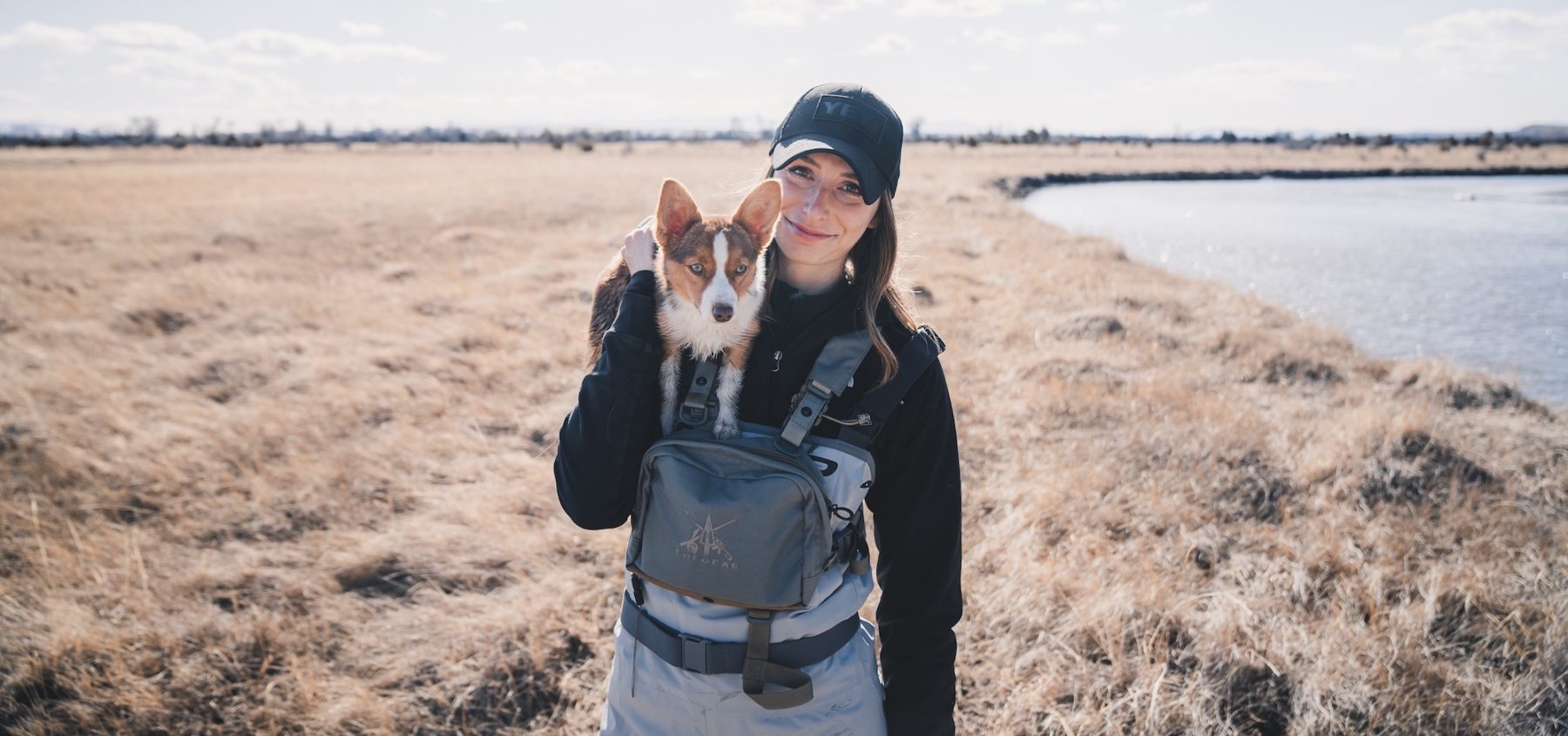
Kelsey Johnson is a Bozeman-based artist whose work highlights the epic wildlife, people, and landscapes of the American West. Using graphite pencils and oil paints, Kelsey creates stunning, life-like artwork– works that you would assume were created by a full-time artist with decades of experience. But in reality, Kelsey is new to professional art– she balances her artistic endeavors with a full-time job, and she actually started her art business only a few years ago, back in 2018. While Kelsey’s artistic career will undoubtedly continue to grow and flourish in the coming years, I am inspired by the commitment and work ethic she exhibits on a daily basis to turn her creative passions into a self-sustaining business.
Growing up in Pennsylvania, Kelsey was always artistic, but she put art aside and earned her undergraduate degree in agricultural business and agronomy. After graduation, she began a career with a large corporation where she sold corn and soybean seeds across the United States. While the job was safe and steady with plenty of upward mobility, she couldn’t shake the feeling that she was not completely fulfilled by her work. So, as you’ll hear her describe, a series of events came together that prompted her to pack up and move to Montana, where she rededicated herself to her artistic inclinations.
I greatly admire Kelsey and the way she has created a life and career here in the West. I also feel that she serves as a perfect example of how to balance professional, practical obligations with the pursuit of artistic goals. If you’ve got creative ambitions but struggle to fit them in between the other demands of life, you’ll find Kelsey’s story inspirational. We had a wide-ranging conversation, discussing everything from her childhood on the east coast to her eventual move to Montana. We talked about her evolution as an artist, some of her artistic breakthroughs, and her creative influences. She talks a lot about juggling professional and artistic commitments, and she also offers up some excellent book, music, and film recommendations.
And as you’ll hear in the episode, Kelsey and I will be doing a giveaway of a print of her newest painting, titled “Land of the Desert Poppy.” If you want to enter to win, follow me on Instagram and look for a post about the giveaway later this week, the week of February 22, 2021.
Thanks so much to Kelsey for taking the time to chat. Hope you enjoy this conversation.

Images courtesy of Kelsey Johnson
Download on Apple Podcasts
—
Download on Spotify
—
Download on Google Podcasts
—
Download on Overcast
—
EPISODE NOTES
Topics Discussed:
- 3:45 – Where Kelsey grew up
- 4:45 – How Kelsey initially got into agriculture
- 6:30 – When did Kelsey realize that agriculture was not the path for her
- 8:45 – How did Kelsey come to set her eyes on Montana
- 12:15 – What did Kelsey have to do to move to Bozeman
- 14:45 – Kelsey’s art
- 18:30 – How the art community in Southwest Montana influenced Kelsey’s art
- 20:45 – The first time Kelsey sold art
- 23:45 – Kelsey’s experience balancing her art with the rest of her life
- 25:45 – Kelsey’s biggest surprise in setting up her art business
- 26:45 – Kelsey discusses “big break” moments that helped get her work in front of more people
- 30:30 – Kelsey’s role models in the creative community of the American West
- 33:45 –Kelsey discusses how she knows she’s finished with a piece and explores those moments when a piece just “doesn’t work out”
- 37:15 – Kelsey’s advice for those getting started in creative pursuits
- 35:30 – Kelsey’s most recently finished piece (ft. information on a print giveaway!)
- 42:30 – Kelsey’s adventures in hunting
- 45:45 – What Kelsey does for fun
- 46:30 – Kelsey’s favorite books
- 50:00 – Kelsey’s favorite musicians
- 53:00 – Kelsey’s favorite movies
- 55:30 – Parting words of wisdom
Information Referenced:
- Kelsey Johnson
- Kelsey on Instagram
- KRae Artworks
- Helena, MT
- Custer, SD
- Black Hills
- Bozeman, MT
- Modern Huntsman
- Tyler Sharp
- Seth Godin
- Meat Eater
- Steven Rinella
- Mark Maggiori
- Jill Soukup
- AD Maddox
- Morgan Irons
- Joe Rogan
- Sara Dant
- Frank Church
- Frank Church River of No Return Wilderness
- James Galvin
- Becca Aceto
- Jim Morrison
- The Doors
- Allman Brothers
- Neil Young
- Traffic
- Cream
- Led Zeppelin
- Jose Gonzales
- Avett Brothers
- Out of the Furnace
- Roadhouse
- Big Land
Enjoy this episode? Then you might like these as well:
- Becca Aceto – Forging Her Own Path in the West
- Morgan Irons – Finding Her Muse
- Jessica Lewis – Doing More With Less
- Anna Brones – Committed to Creativity
- Kate Kavanaugh – Regeneration & Restoration
- Logan Maxwell Hagege – Artistic Evolution
- Melissa DiNino – Building a Unique Life in Big Sky Country
- Sara Dant – A Deep Dive Into the History of the West
- Daniel Vergés – The Pursuit of Simplicity in Art & Life
Iris Gardner – Living with Intention
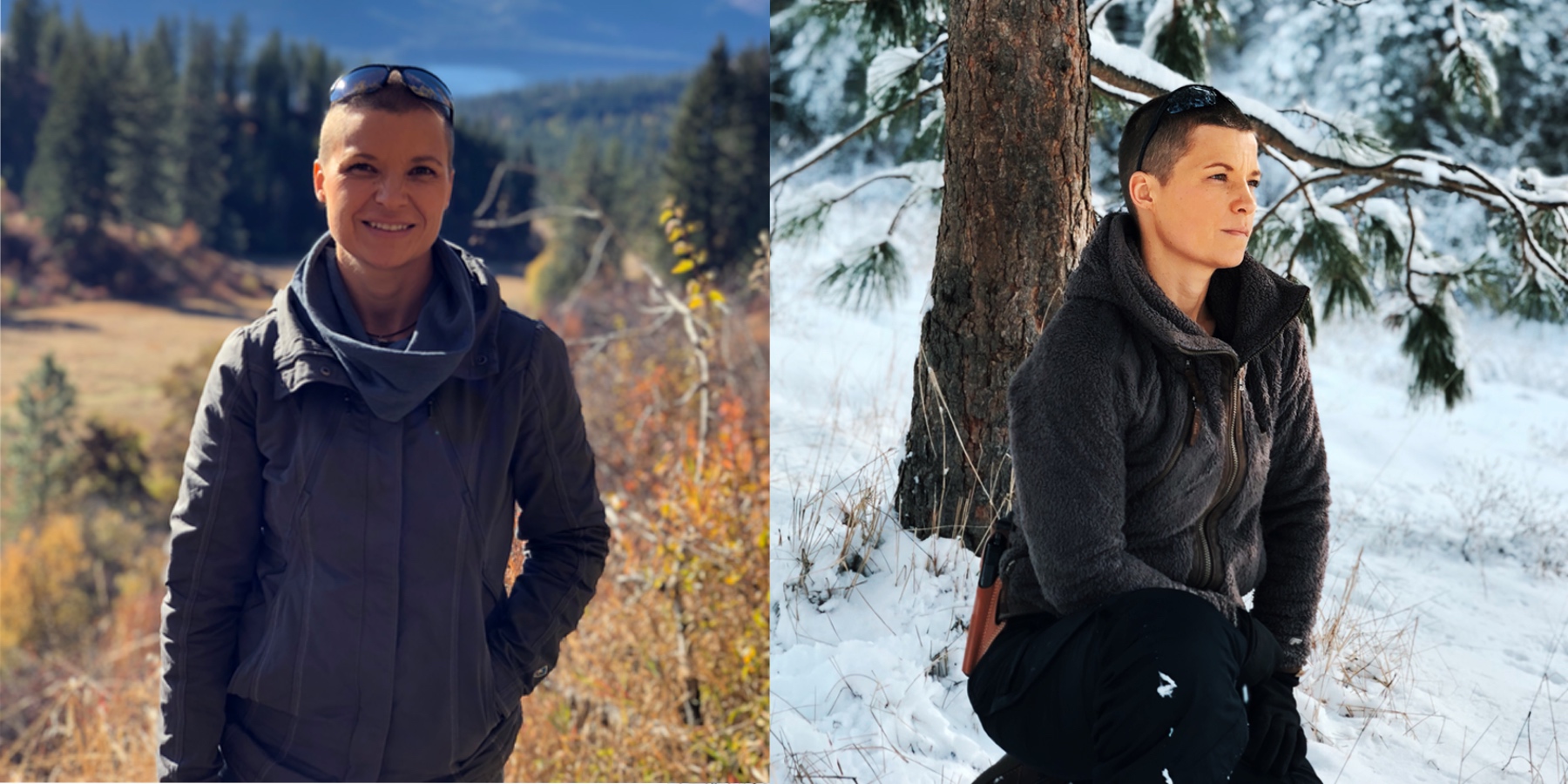
Iris Gardner is a writer, horse wrangler, mother, and former organic farmer who lives with her family on a homestead in northeastern Washington State. After many years of living and farming in southern California, Iris, her husband Jason, and their two children moved to their current home– a rural property located close to the Canadian border and more than two hours from the nearest city. As you’ll hear in our conversation, Iris and Jason have chosen to live and raise their children deliberately, with intention, and close to nature– in a beautiful landscape far removed from many of the so-called conveniences of modern life.
Iris grew up off the grid in rural Washington, in an area so remote that her home did not have electricity. During her childhood, she developed a deep love of reading, horses, and wild landscapes– all passions that are still of great importance to her and her family today. Iris’s husband Jason is a retired, highly decorated Navy SEAL who shares her devotion to intentional living and parenthood. Working as a team, Iris and Jason are building a meaningful and unique life for their family in the wilds of eastern Washington– a life that I have found both inspiring and instructional.
Iris and I have been following each other online for years, so it was wonderful to finally get the opportunity to have a conversion. We spent a lot of time discussing parenting– how she is raising her children to be both tough and compassionate, and how she balances managing risk with letting her kids learn from their own mistakes. We discuss her marriage with Jason and how they have grown as a couple through the various phases of their lives and careers. Iris is an enormously talented writer, and she is currently finishing up her first book, so we discuss her writing process, and she offers some excellent advice for people interested in pursuing creative endeavors. We also discuss the power of positivity, our shared love of reading, Iris’s heroes and mentors, and Iris offers some valuable words of wisdom.
If you want to learn even more about Iris’s journey, I’d encourage you to watch or listen to her conversation with retired Navy SEAL Jocko Willink on the Jocko Podcast. You’ll hear us reference Jocko often in our conversation, and that podcast episode is one of the most powerful conversations I’ve ever heard in my life, no exaggeration.
Iris is an inspiring, strong, tough, talented, and thoughtful woman, and I know you’ll enjoy our conversation. Thanks for listening.
Photos courtesy of Iris Gardner
Download on Apple Podcasts
—
Download on Spotify
—
Download on Google Podcasts
—
Download on Overcast
—
EPISODE NOTES
Topics Discussed:
- 3:40 – Iris describes her homestead
- 7:10 – Iris discusses parenting
- 12:40 – Iris describes raising kids tough
- 20:40 – Iris shares whether she always planned on being a mother
- 21:55 – How Iris and her husband, Jason, met
- 24:10 – Iris discusses the transition in her husband’s work (from SEAL to leadership consultant) and building independence within a marriage
- 26:55 – Iris talks about learning from each other in a marriage
- 29:55 – Iris discusses her memoir
- 31:40 – Iris discusses the relationship between reading and writing in her life
- 34:10 – Iris discusses her relationship with social media
- 39:10 – Iris’s advice for people with creative impulses/aspirations
- 43:55 – who are Iris’s heroes/mentors
- 46:25 – Why Iris feels positivity is important in the face of challenges
- 51:40 – How Iris uses the outdoors for introspection
- 53:10 – How Iris sets examples and encourages introspection, communication, and connection with her kids
- 1:00:40 – How having kids has impacted Ed and Iris
- 1:02:00 – Iris’s book recommendations
- 1:10:25 – Words of wisdom
Information Referenced:
- Iris on Instagram
- Watch Iris on Jocko Podcast
- Listen to Iris on Jocko Podcast
- Jason Gardner on Instagram
- J.R.R. Tolkein
- San Diego, CA
- Tecate, Mexico
- Navy SEALS
- Jocko Willink
- Echelon Front Leadership Consulting
- John Steinbeck
- Ken Kesey
- Edward Abbey
- High Country News
- Enneagram Personality Test
- David James Duncan
- Mike Foote
- Harry Potter series
- Jim Dale
Enjoy this episode? Then you might like these as well:
- George Hodgin – Mission-Driven Entrepreneur
- Kate Kavanaugh – Regeneration & Restoration
- Alexis Bonogofsky – Taking a Stand for the West
- Ivan McClellan – A New Look at the Old West
- Mark Kenyon – A Passion for Public Lands
- Duke Phillips IV – Living with the Land
- Juanita Vero – A Deep Love of Place
- Russ Schnitzer – A Life Devoted to Western Landscapes
The Ramblings of a “Conquistador of the Useless”
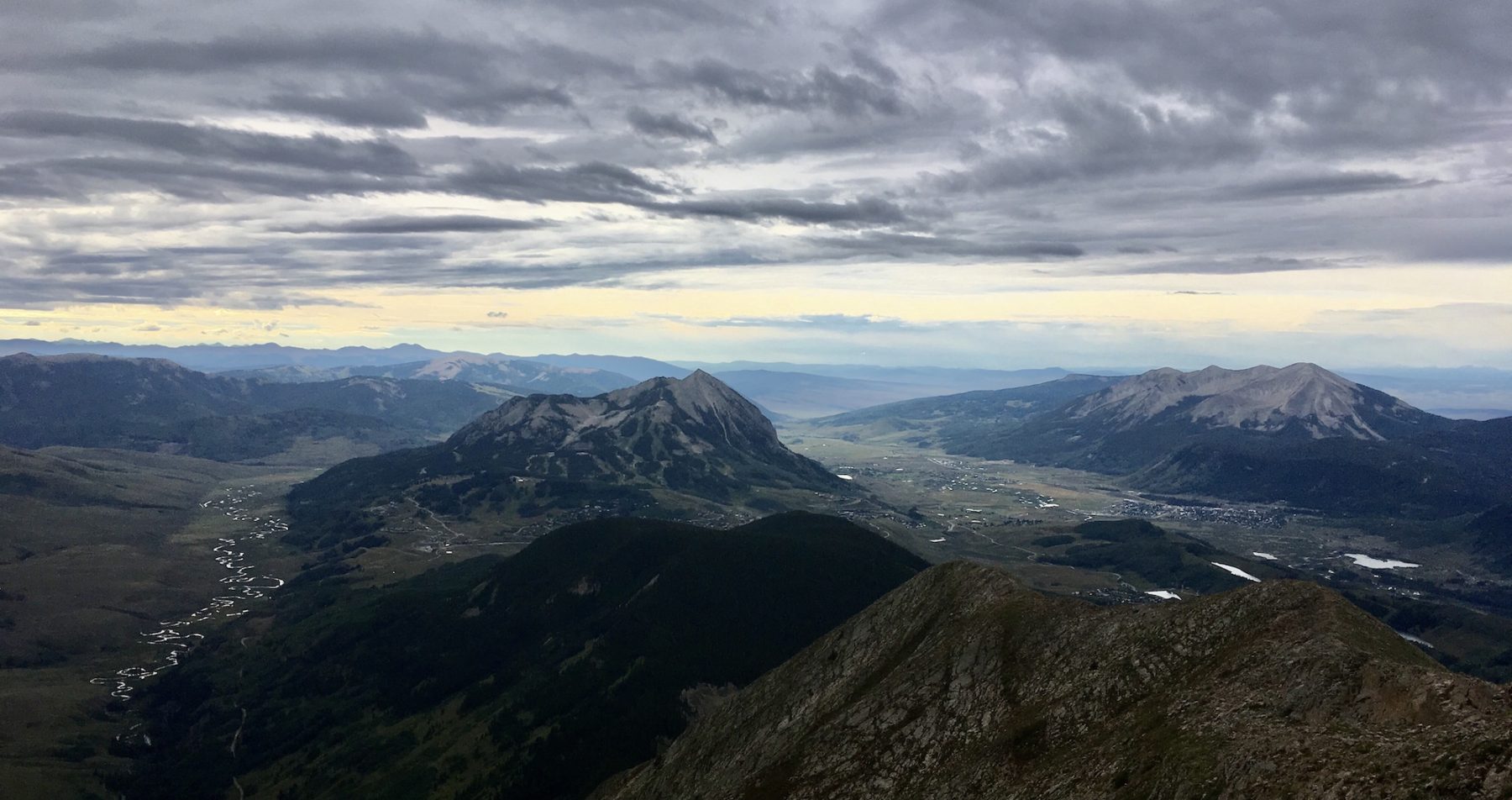
This episode is a little different than normal– it’s me being interviewed on the Off the Couch podcast by my friends Jonathan Ellsworth and Brendan Leonard. Brendan is likely familiar to many of you long-time listeners– he joined me on the podcast a few years ago to discuss his writing career, his film “How to Run 100 Miles” and his blog Semi-Rad. Jonathan is the creator of Blister, an amazing online resource that includes outdoor gear reviews, a podcast network, and much more. Jonathan will be joining me on this podcast in the coming months.
Jonathan and Brendan were nice enough to invite me on Off the Couch to discuss a somewhat silly challenge that I imposed on myself on my 43rd birthday. Every hour on the hour for 24 hours, I ran a 1.3-mile loop around my neighborhood. In between laps, I did a long list of tasks that I had been putting off, including stacking firewood, cleaning and rearranging my basement, sending a ridiculous number of emails, and other mindless tasks. The whole thing was based on a film by a guy named Beau Miles who did a similar challenge in Australia. I stumbled across the film on Youtube and decided to give it a shot a few days later. I’ve linked to that film in the episode notes.
That birthday challenge was just one part of what turned out to be a wide-ranging conversation about a ton of fun and funny topics. We discussed the backstory on the Mountain & Prairie, my experiences running 50 and 100-mile races, some scary moments I’ve had running ultras, why I’m so obsessed with reading books, and some of my favorite books from 2020. There were enough interesting topics that overlap with what we discuss here on Mountain & Prairie, so I thought some of y’all might enjoy it and get a few laughs at my expense.
If you’re interested in running and some of the fascinating characters that the sport attracts, I encourage you to check out Off the Couch. You’ll recognize a few past Mountain & Prairie guests, including Mike Foote and Joe Grant, but all of the episodes are fun and inspiring. There’s a link in the episode notes, so check it out. Enjoy!
Top photo by Ed, from the top of Gothic Mountain outside Crested Butte
Download on Apple Podcasts
—
Download on Spotify
—
Download on Google Podcasts
—
Download on Overcast
—
EPISODE NOTES
Topics Discussed:
- Ed’s podcast, Mountain & Prairie (3:32)
- The Procrastinator’s Punishment 50k (11:49)
- Ed’s Scary DNF (33:02)
- Ed’s Gross DNF (39:21)
- Triathlon community vs the Ultra community (42:11)
- Ed’s bi-monthly book recommendations (47:20)
Information Referenced:
- Off the Couch
- Blister
- Semi-Rad
- Beau Miles – A Mile An Hour
- Blister Podcast Network
- All of Brendan’s Books
- How to Run 100 Miles film
Enjoy this episode? Then you might like these as well:
- Brendan Leonard – Grinding It Out
- Mike Foote – Perfection Is In the Process
- Chris Burkard – The Art of Suffering
- Kyle Richardson – Mountains & Music
- Joe Grant – Self-Powered Alpine Adventurer
- Steve Casimiro – Voice of Adventure
Chris Douglas – An Unexpected Artistic Journey
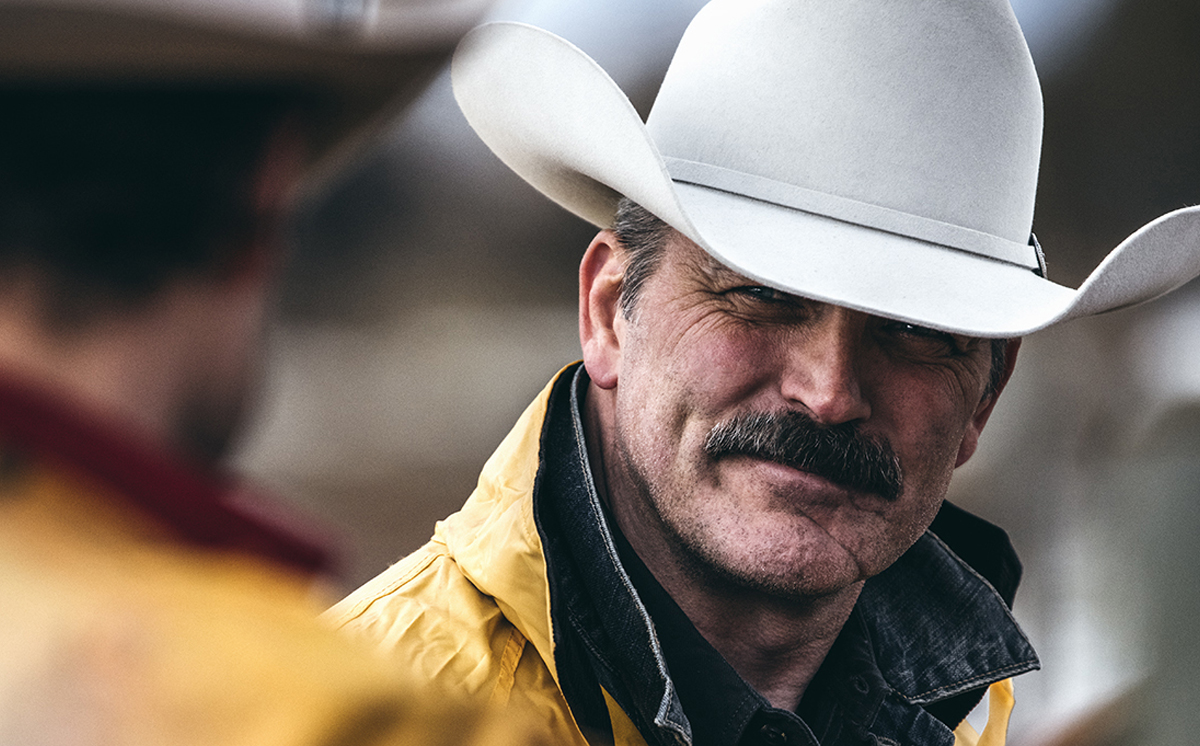
Chris Douglas is a Montana-based photographer and creative director who is one of the most sought-after visual storytellers in the American West. Chris is a go-to photographer for iconic brands such as Filson, Stetson, and Mossy Oak, and his editorial work appears regularly in publications including Modern Huntsman and Men’s Journal. In a world flooded with iPhone photography and armchair creatives, Chris’s work stands out as being artistically stunning and of the highest professional caliber.
When viewing Chris’s work, most people would assume that he’s been laser focused on photography for his entire career. But even though his interest in photography began at age ten, the first half of his career was spent in front of the lens– first as an international model for brands such as Versace, and then as a successful television actor. But life moving between LA, New York, and Milan was not a fit with his love of the outdoors, so Chris eventually moved to Montana, where he continued his life-long passion for hunting and adventure. Then, as you’ll hear him describe, Chris was severely injured in a horse accident, which became the catalyst that led him to leave acting behind and devote his full energies to photography.
Those of you who are long-time listeners know that I spend a lot of time preparing for each of these interviews, but, as you’ll hear, I was completely surprised by much of Chris’s story. Chris is unbelievably humble and keeps a low profile, so I was honored that he was open to sharing his full journey with me on the podcast. We started out chatting about his upbringing in east Tennessee and his tight-knit, supportive family that he credits with being the foundation for all of his success. Then we discussed his fascinating career trajectory– from international model to soap opera star to television host to photographer. We had a great conversation about his Native American ancestry and how Native culture has influenced his work and family’s life in Montana.
Chris’s story is both entertaining and instructive– he is a wonderful example of how life’s unexpected twists and turns can lead people on the most interesting journeys. And how hard work, humility, creativity, and professionalism can result in a one-of-a-kind life and career. Check out the extensive episode notes for links to everything we discuss. Enjoy!


Photos courtesy of Chris Douglas, top photos of Chris by Paul King
Download on Apple Podcasts
—
Download on Spotify
—
Download on Google Podcasts
—
Download on Overcast
—
EPISODE NOTES
Topics Discussed:
- 5:00 – Where Chris grew up
- 6:45 – How did Chris become interested in photography?
- 10:00 – Chris’s other artistic talents
- 11: 15 – Chris beginning to work with Bruce Weber
- 16:00 – Chris learning more about photography through observation
- 18:00 – Social media’s impact on photography from Chris’s perspective
- 19:00 – Chris pursuing his passion for hunting while modeling
- 22:45 – Chris reflects on the best and worst parts of his career in front of the camera
- 24:30 – What pushed Chris to spend time in the outdoors in the middle of a successful modeling/acting career
- 26:00 – Why Chris decided to move to Montana
- 28:30 –Chris’s gradual transition to professional photography behind the lens
- 30:30 – Chris’s horse accident
- 39:30 – Chris reflects on all the jobs that got him to where he is now
- 42:00 – Chris’s keys to success in business and photography
- 47:00 – Chris’s Native heritage
- 50:00 – Chris reflects on learning about his heritage
- 55:43 – Where Chris thinks his career will go from here
- 58:15 – Book recommendations
- 1:01:45 – Parting words of wisdom
Information Referenced:
- Chris Douglas Photography
- Clinton, Tennessee
- Clinch River
- Melton Hill Dam (lake)
- Cannon AE-1
- Dale Hollow Lake
- Bruce Weber
- Versace
- Steven Meisel
- Arthur Elgort
- Soft Box light
- Bob Frame
- Norman Seeff
- KISS
- Calvin Klein
- Ralph Lauren
- One Life to Live
- North Salem, NY
- Broadhead arrows
- Great Smoky Mountains National Park
- Yellowstone National Park
- McAllister, MT
- Ennis, MT
- Bozeman, MT
- Trail Creek trail
- The Young and the Restless
- Passions
- Scott Gurney/Gurney Productions
- NFR (National Finals Rodeo)
- Leo Burnet
- Marlboro ad campaigns (Marlboro Man)
- Yeti
- Cherokee
- Pocahontas
- Ellijay, GA
- Panthertown, NC
- Lame Deer, MT
- Powwow
- Crow
- Charles Frazier
- Mari Sandoz
- Charles Eastman
- Lakota
- Filson
- Rick Bass
- E. Donnall Thomas
- Cormac McCarthy
- Michael Fox
- Robert M. Pirsig
Enjoy this episode? Then you might like these as well:
- Ivan McClellan – A New Look at the Old West
- Chris Burkard – The Art of Suffering
- Pete McBride – A Passion for Water & Wild Places
- Alexis Bonogofsky – Taking a Stand for the West
- Jessica Lewis – Doing More With Less
- Heather Hansman – Demystifying Water in the West
- Hal Herring – A Man of Words & Wild Places
- Duke Phillips III – A Vision for the New West
- Duke Phillips IV – Living with the Land
